


JULY 2023 N. 38 ISSN 2784-9465 SSN 2704-6540
Director’s Editorial
Youth Skills: The relationship between technical and personal/life skills a formula for a happy marriage.
Health without Barriers: Prisoners Gain Access to Healthcare
Echoes of Tomorrow
Muratcan story
First edition of the Youth Employment Summit in Barcelona
YOUTHShare and Cowork4YOUTH at the first Euro-Nordic Network Summit (ENN) in Oslo
Lublin is the first city in Poland that is the European Youth Capital 2023
Interview with Gian Luca Bombarda, Fund Director of the Fund for Youth Employment
Theme of the issue
Youth is the time of life full of promise - let’s do it!
Activating Women, Young People, and Vulnerable Groups in the Labour Market: A Focus on Green and Digital Transition in Ireland
Supporting Neets in Transitions to the Green Economy (Project INTERCEPT)
Gender and the digital skills gap
Developing Skills of Rural Youth
Reskilling and upskilling. The role of institutional networking
YOUTHShare on activating women and young people, especially those not in education, employment, or training. Vol I
YOUTHShare on activating women and young people, especially those not in education, employment or training. Vol II
Empowering Vulnerable Youth: Insights from Activation Measures
The activation of more women, young people and vulnerable groups on the labor market
Empowering Women and Vulnerable Groups: SEPAL's Vision for a Resilient Labor Market
The Empowerment of Women, Youth, and Vulnerable Groups in the Labour Market: A Step in the right direction
"Empowering Individuals for a Sustainable Future: Project L.I.K.E and the European Year of Skills"
The European Year of Skills initiatives will also focus on activating more women, young people and vulnerable groups in the labor market. Match people's aspirations and skill sets with labor market opportunities, especially in terms of green and digital transitions and economic recovery. Particular emphasis will be placed on activating more people in the labor market, especially women and young people, especially those not in education, employment or training. This is how we interpret these words in our project.
Supporting young people to start businesses with a green and social mission is vital for tackling European and global challenges
Portugal: Inclusion remains a mirage for people with disabilities
Cosmin, technician in an authorized protected unit
Robert, worker in a carpentry workshop
Ionuț, green spaces caretaker
The wide spread of the Supported Employment model – solution for the integration of people with disabilities on the labour market
1 Regional Funds Online Magazine
3 6 8 10 11 13 16 18 21 24 25 26 28 31 32 34 35 36 37 39 40 42 44 46 48 49 51 52 53 54
Contents
Experience exchanges between employers and young adults from vulnerable groups
Supported employment, safety net for young adults from vulnerable groups
The Regional Cooperation – the determining factor for the success of the transfer of good practices
Digital Natives and Digital Citizens
Unlocking Opportunities for NEETs: Nurturing Digital Skills for the Future
Tackling youth unemployment and the NEETs challenge: The case of Bulgaria.
What does the activation programme mean for the most disadvantaged young people from marginalised Roma communities in Slovakia?
A family of Uncorking rural heritage project
Building Long-Term Transnational Alliances
Fostering transnational cooperation enables multidisciplinary skill development
Closing the Gap: Fostering Collaboration and Empowering Young Professionals!
The European Year of Skills and BLUE-GREENWAY agenda
Portrait of Judge – a bridge to long lasting co-operation among universities and with the actors in the field of justice
From the Projects
Workshops and study visit to Poland
Why sustainability is important for your business
Developing digital skills in Criminal Justice: The HOPE Project’s Contribution
Let them build it! - youth workshop series report
The endeavour of Reclaim Our Civil Space! started back in 2020 with 10 civil society organizations from 8 countries - Poland, Czech Republic, Slovakia, Hungary, Romania, Bulgaria, Serbia and Norway as an expert partner - and is coming to an end with this conference.
CCS4CEE: Study trip to Norway, June 2023
Ruse Creative Center and its exciting event for young artists from the city of Ruse
Field workshop for Polish NEETs in StayOn project
Science closer to business - student closer to labour market - business breakfast and debate about students and NEETs in Poland
YENESIS 2.0: 5-day Training Week
Blue Generation Project Updates
Cowork4YOUTH: The Open Event in Dublin
The end of the second edition of the CREA RAISE Youth programme: conclusions and outcomes
"The persistent and stubborn young people of Pernik region can develop tourism TOGETHER"
Personal development workshops for young beneficiaries of LEAD project
Youth Employment Summit - good practices in Youth Employment, videos and pictures from the event Youth Employment Forum
2
Contributors & Credits 56 57 58 60 62 65 67 70 72 73 75 76 78 80 80 83 85 88 90 91 93 95 96 97 98 101 102 104 106 107 109 110 Regional Funds Online Magazine
Director’s Editorial
Dear Friends,
I am preparing this editorial while feeling everybody’s worries about the Mediterranean full of fires and very (really very) high temperatures, obliging people to be prisoned into their houses and to be evacuated (I am talking about Greece).
I am, and surely you are as well, very sad: alongside the personal involvement and the Friends I have out there, this is confirming we are facing another big challenge. I never like being a conspiracy theorist, I am always trying, thanks as well to this Magazine, to promote the fight against fake news. But something serious is happening out there and our world is changing.
At the same time, I feel confident to write those words here because I know you all and the activities you are promoting. And I am convinced you can share my deepest thought.
What do to?
A very difficult question to answer, in our context, considering the important efforts we have been implementing during these years together. We experienced the Covid-19 pandemic, the vaccines-related problem, isolation consequences – especially on young people – and now, after war and earthquakes, … simply overflowing rivers and/or fire!
How many times, in this space, we have talked about climate change? About its consequences, proposing possible solutions?
I wonder: aren’t we in the middle of another crisis?
The thing is, honestly, that while we thought to defend ourselves with vaccines to fight Covid, now I am not sure about how we could solve this rapidly changing nature. I am sure, as you know, that we are an amazing group that, thanks to the support of EEA & NORWAY Grants, you will continue to rack your brains. I am just afraid, compared to everything (and other parts of the world) remaining outside, that it is not enough yet. Somewhere else, there will be another challenge.
I don’t have solutions (I wish I had). I can just be with you in trying to find possible solutions and I am glad we can exploit this free space to reflect together. And, if possible, in a positive way. You know I don’t like too much pessimism !!

Related to that, I am happy to see that we had one first reaction to our new space recently launched – Echoes of Tomorrow – (for which I thank our Project INTERCEPT for the nice visual sent to us). Surprisingly, this contribution came from Turkey, and we are glad to welcome Muratcan Işildak into our Mag. Hopefully, we will have the chance to enlarge this space.

3
Regional Funds Online Magazine
Talking again about some positiveness, I want to share with you at least other two points. Firstly, alongside our new Rubrica dedicated to youth voices, we are very glad to present you one success story coming from Yagos Antiochos, representing the Greek Active Citizen Found. One colleague, after all the project ‘Health Without Barriers’. I like a lot this title. And I wish we lived in a world without barriers of any kind.
Barriers for young people are just one example and this give me the opportunity to mention as well an event which really left me very excited in terms of the topics discussed. I am talking about the Youth Employment Summit which took place in Barcelona last late June. You will read about it in our pages, I can just add that it has been a fruitful occasion not only to see some of my friends but as well to share with all the participants important thoughts about ‘tomorrow’, youth aspirations, needs, problems, etc. and I am as well very happy that the material prepared by our Project YES! was published on the ‘La Vanguardia’, a very important local Spanish (and Catalan) newspaper - Primera edición del Youth Employment Summit subraya la importancia de la formación juvenil (lavanguardia.com)
And, before closing, I also want to highlight another great event you will be able to read about: our Projects YOUTHShare and Cowork4YOUTH at the first Euro- Nordic Network Summit (ENN) in Oslo!!
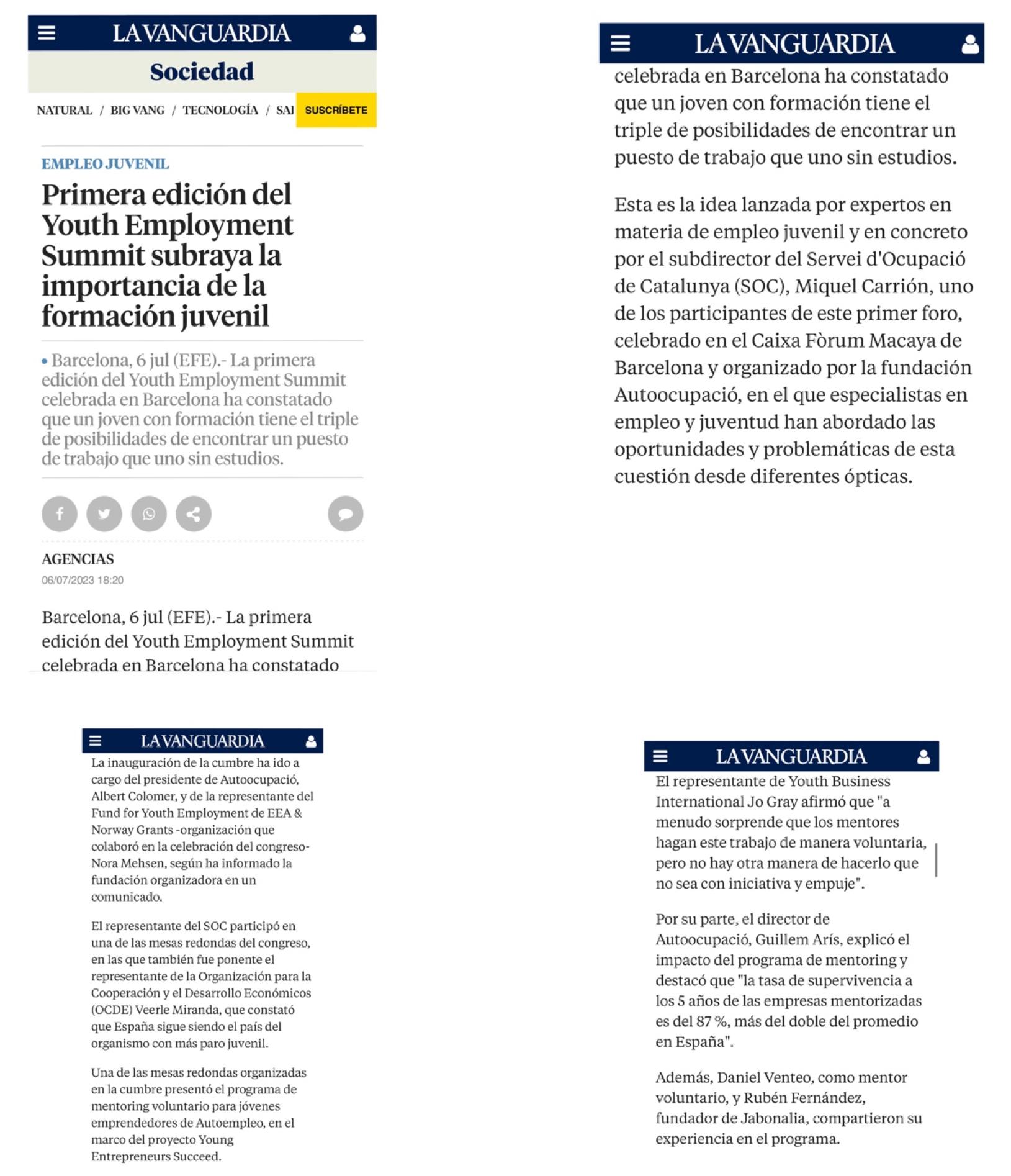

4
Regional Funds Online Magazine
The Youth Employment Summit talked especially about the importance of young people needs in terms of orientation and guidance, and as you can see here as reported by the newspaper, a young person with training is three times more likely to find a job than one without studies!!!
If you know me, and hopefully yes after those years together ! , you already know what I want to tell you…


Yes, I am talking about our Special Edition that will be published in the occasion of the 12th August, the International Day of Youth. This year, being the European Year of Skills, we all decided to concentrate on positive competences development processes, through the point of view of people that are working for that, namely youth workers, mentors, trainers, etc. I am sure that, by the 12th, we will collect as usual valuable contents and insights for furthers reflections.
Finally, while waiting for this Special Edition, I have to thank in advance the DG EMPLOYMENT Departments, DG EAC and other institutions such as FAFO, OECD, CEDEFOP, the Committee of the Regions, the EESC, and any other person or entity which will make it possible.
There is nothing better, at this point, than to greet you with our Friend Tom who, taking up an African proverb, perfectly expresses the meaning of this Mag and of the next release: ‘If you want to go fast, go alone, if you want to go far, go together’.
Going together, for sure we will keep getting great results.
Gian Luca Bombarda The Fund Director

5
Regional Funds Online Magazine
Youth Skills: The relationship between technical and personal/life skills a formula for a happy marriage.
Recent estimates suggest that 600 million jobs would have to be created over the next 15 years to meet youth employment needs. The total global number of unemployed youths was estimated at over 70 million in 2022, a slight improvement from 2021 (75 million) but still five million above the pre-pandemic level of 2019. The share of youth not in employment, education or training (NEET) in 2020 – the latest year for which a global estimate is available – rose to 23.3 per cent, an increase of 1.5 percentage points from the previous year and a level not seen in at least 15 years. The youth population will grow by more than 78 million between 2021 and 2030. Low income countries will account for nearly half of that increase. Education and training systems need to respond to this challenge.
According to a recent ILO report, an additional 8.4 million jobs for young people could be created by 2030 through the implementation of green and blue policy measures. Targeted investments in digital technologies could also absorb high numbers of young workers. “What young people need most is well‑functioning labour markets with decent job opportunities for those already participating in the labour
market, along with quality education and training opportunities for those yet to enter it." July 15th. last was World Youth Skills Day, and, as per usual on such flagship days it was accompanied by a suite of statements, speeches and exhortations from international organisations and politicians.
Antonio Guterres, the UN Secretary General set out the context: “In every corner of the world, young people face a whirlwind of change — technological advancements, a rapidly changing job market, demographic shifts, climate challenges, and learning losses due to the COVID-19 pandemic.”
Technical competence cannot be a solo voyage
There is a recognition that technical skills alone are not enough. While there is a strategic importance of equipping young people with skills for employment, it is equally important that they are furnished with skills for life. Personal growth and development of life skills should attend the more practical learning and training modules. Problem solving, communication and social skills are essential.
The provision of skills for youth that help them actively engage in their local communities and beyond, is paramount.
“Technological advancements and shifting labour market dynamics increasingly call for agile and adaptable skill sets. It is crucial that we empower young people to navigate these changes effectively. Technical and vocational education and training (TVET) is well placed to meet these demands by reducing access barriers to the world of work, ensuring that skills gained are relevant, recognized and certified, promoting green skills and practices, and offering skills development opportunities for youth who are not in education, employment and training.” United Nations
With the exponential rise in technological advancements, the skills gap is widening. Technological ability is currently considered the most important skill required. The value of technological competence cannot be underestimated. However, today’s youth need to cultivate a new set of intelligence and skills to keep up with the lightning-pace of this changing world. These skills of the future must go beyond technological competence.
6
Regional Funds Online Magazine
‘If you want to go fast, go alone, if you want to go far, go together’ (African proverb).
Reflecting on the needs of the future on World Youth Skills Day, a recent report by the UN on Africa is immediately valid and vital for other global regions. It points to three skills that youth need to unlock current and future opportunities. These include Digital Intelligence, Relational Intelligence and Collective Intelligence.
Youth skills helping balance digital life with real life
Digital intelligence will help to navigate the real impact of emerging digital technologies. On the one hand, technological advancement is creating positive benefits by easily and quickly connecting people and ideas across space and time. Yet, this intense interaction with diverse tools has a downside also that can result in negative consequences such as digital addiction, isolation and the rapid spread of disinformation.
To mitigate this, users need Digital Intelligence, or Digital Literacy, which is the ability to question ‘When, What, Where,


validation is determined by the number of ‘likes’, and ‘influencers’ have become the new mentors. Navigating social situations in a technologically advanced world calls for a high level of Relational Intelligence. Protecting relationships in real life and the space they occupy will help young people invest the right amount of time and effort in relationships that enhance their lives.
Youth skills to act as engine driving collective action
Thirdly, Collective Intelligence recognises that everyone has skills, knowledge or areas of expertise that bring value to the group. The value of working together, of the aggregation of skills and knowledge, the pooling of talent cannot be underestimated in the search for solutions to current and future problems.
Thomas Mc Grath Our Irish Journalist
Why,
Who and How much’ of their relationship with digital technologies. High Digital Intelligence will enable youth to overcome the challenges and demands of digital life including the application of new digital knowledge and skills while maintaining a connection with real life.
Youth skills and the importance of connections between people
Secondly, relational intelligence will help youth to protect human interaction. In today’s digital world, online acquaintances are often mistaken for real friends. Affirmation and a sense of
7
Regional Funds Online Magazine
Health without Barriers: Prisoners Gain Access to Healthcare
Yagos Antiochos (Bodossaki Foundation) writes about the project that contributed to ensuring healthcare for marginalized prisoners.
Health without Barriers paved the way for prisoners' unhindered access to healthcare.
In 1957, the United Nations (UN) defined the "Standard Minimum Rules for the Treatment of Prisoners," which were updated in 2015 and renamed as the Nelson Mandela Rules (NMR). These rules address the fundamental right of people in prisons to health care, to unrestricted access to diagnosis and treatment as well as to the confidentiality of their medical files. Are the UN rules truly being upheld within the confines of Greek prisons, even after 66 long years since their adoption?
Giorgos Kalamitsis, President of the Hellenic Liver Patients Association “Prometheus”, describes the reality he has encountered in the past 7 years that the organisation has been active in prisons throughout the country. "When we started implementing our first project in 2017 which involved the diagnosis and integration of prisoners into the healthcare system, we identified the significant difficulties that exist in this particular field. Among these, we found that a very big obstacle to accessing healthcare services within prison was the fact that a percentage of prisoners did not have a Social Security Number (SSN), due to the absence of the necessary legislative documents. This practically meant that a large number of prisoners could neither have medical check-ups nor proceed with treatments for hepatitis B&C or any other health issue they were facing. Thus, we decided in collaboration with the organisation “Positive Voice” to design the “Health without Barriers” project, with the main objectives being to officially register those restrictions in 5 prison settings at the Greek periphery and to strengthen advocacy towards state institutions in order to bring policy change regarding prisoners’ rights, such as electronic medical records, Social Security Number issuance, telemedicine, medical data confidentiality etc.”
"Health without Barriers" started its implementation in April 2021, as one of the 119 projects managed by the Bodossaki Foundation in consortium with SolidarityNow, as the grant manager of the Active citizens fund programme for Greece. The €15 million Active citizens fund programme is funded by Iceland, Liechtenstein and Norway and is part of the European Economic Area (EEA) funding mechanism for the period 2014 - 2021, known as EEA Grants. The programme aims to strengthen and enhance the sustainability of civil society and to highlight its role in promoting democratic processes, enhancing citizens' participation in public life and defending human rights.
The first step of the “Health without Barriers” project was to quantify the data on prisoners' access to healthcare services. For this purpose, a scientific committee was set up which created questionnaires that were later answered by prisoners and employees in 5 prison settings. Specifically, those of Trikala, Chania, Malandrinos, Korydallos I and Chios.
The coordinator of the committee, Professor of Epidemiology and Medical Statistics at the Laboratory of Hygiene, Epidemiology and Medical Statistics at the
8
Regional Funds Online Magazine
Medical School of the University of Athens, Ms. Vana Sypsa, describes the approach: "First, you collect the data you need, then you analyse and utilize them in a final policy brief that can assist you in advocacy and in proposing institutional changes to the relevant authorities that will address the root causes of the problem. For the questionnaire, in addition to the participants’ information, such as age, country of origin, existence of a Social Security Number etc., we also included some standards of international organizations proposed for prison settings, allowing the data you collect to be comparable, for example, at a European level.”
The survey sample was quite large, with a total of 479 prisoners and 85 prison officers responding to the questionnaires. The results documented the pathologies in prisoners' access to healthcare services and in the treatment of some infectious diseases, such as Hepatitis B and C, and HIV. As Ms. Sypsa says, the survey "recorded that a large percentage had a history of intravenous drug use, a population in which the rate of hepatitis C infection is as high as 80%! Although the average length of detention for prisoners in the survey was 3.3 years, a significant period during which there are many opportunities for a person to be diagnosed with an infectious disease and given appropriate treatment, more often than not this had not been done. The absence of a Social Security Number or Temporary Social Security Number was identified as the main problem in accessing healthcare services, affecting 25% of the surveyed prisoners. In fact, among non-Greek citizens this percentage reached nearly 50%.”
Mrs. Ioanna Anastasopoulou, Director of the Nafplion prison setting, where activities of the "Health without Barriers" project were carried out, confirms the magnitude of the problem caused by the absence of Social Security Number: "Following an initiative of the Hellenic Liver Patients Association “Prometheus”, we proceeded to test the largest percentage of the population of the inmates of the Nafplion prison setting for Hepatitis C. Unfortunately, of the 84 who tested positive, only 17 were entitled to treatment. Why? Because they were the only ones lucky enough to have Social Security Number or Temporary Social Security Number. It's so unfair when you consider that access to healthcare services for prisoners and non-detainees alike is an inalienable universal right, not a partial privilege.”
After completing the research and analyzing its results, meetings were held with the General Secretariat for Anti-Criminal Policy of the Ministry of Citizen Protection, where the challenges and potential solutions of the issue were presented in detail. As stated by the Secretary General, Mr. Konstantinos G. Papathanasiou, “In March 2021, following the encouragement and contact of Mr. Kalamitsis, President of the Hellenic Liver Patients Association “Prometheus” with us, a Memorandum of Cooperation was signed between the General Secretariat for Anti-Criminal Policy, the Hellenic Liver Patients Association “Prometheus” and the Greek Association of People Living with HIV “Positive Voice”, in order to implement the project "Health without Barriers". The conclusions of the survey conducted within the framework of the project, contributed to a clearer assessment of the level of awareness and attitude of prisoners, patients and non-patients, as well as of prison officials, towards infectious diseases and highlighted the problems faced by incarcerated patients in their efforts to access healthcare services. Finally, the proposals put forward by the project promoters are align with the objectives already adopted by the General Secretariat, including the provision of a Temporary Social Security Number to prisoners who do not have a Social Security Number, to ensure they are not excluded from accessing healthcare services.”
The General Secretariat for Anti-Criminal Policy has submitted the legislative decree (Article 84 of Law 4985/2022) on the Temporary Number of Healthcare for Inmates and its use will start being implemented in all prison settings in the country from September onwards Eligible beneficiaries are domestic and foreign inmates in Greek prison settings who do not possess and do not meet the requirements for issuing a Social Security Number or a Temporary Number for Insurance and Healthcare of Foreigners, for the duration of their detention. This ensures vital healthcare life-saving medical intervention to thousands of prisoners who were previously excluded from it.
9
Regional Funds Online Magazine
Yagos Antiochos
Echoes of Tomorrow
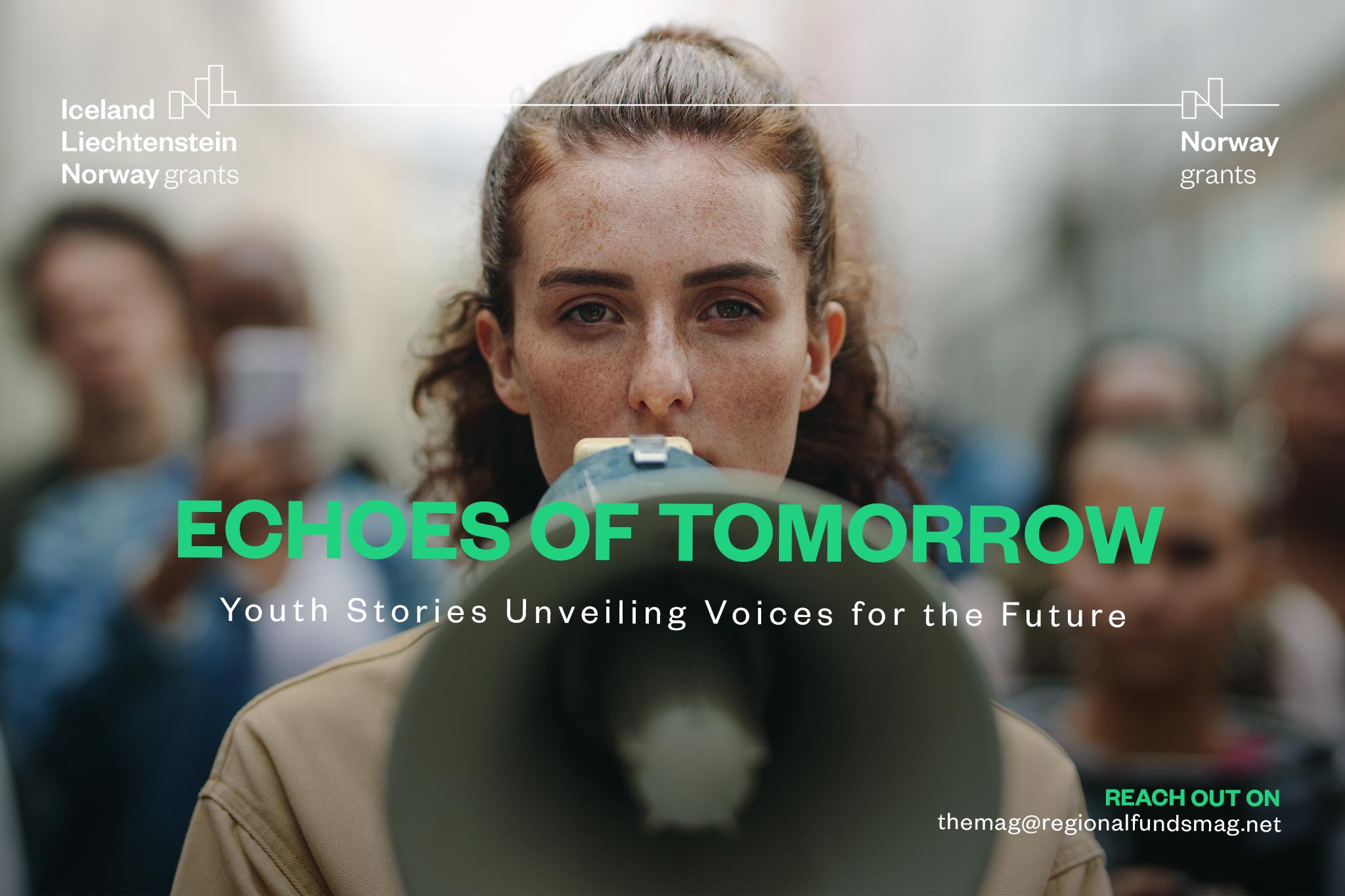
Youth Stories Unveiling Voices for the Future
is our new rubrica, that we launch today with this picture kindly created by our Project INTERCEPT.
And we welcome the words of our first contributor, Muratcan Işildak - President of Genç Düşünce Enstitüsü (Youth Think Tank).
With the hope that more voices will come, this wants to be a space to give young people the opportunity to feel heard, a space where they can express their ideas, challenges, thoughts.
themag@regionalfundsmag.net
10 Regional Funds Online Magazine
The European Year of Skills programs have opened up new avenues of hope and promise for Turkey’s youth, while emphasizing youth employment and entrepreneurial empowerment. With a particular focus on women, vulnerable groups, and those not in education, employment, or training (NEET), this program seeks to match a range of aspirations and skills with emerging opportunities for change green and digital, and aligned with a society of economic recovery. Turkey, like many other countries, faces the challenge of high youth unemployment.
The European Year of Skills initiatives recognize this pressing issue and the need to address it head-on. By employing more young people for the labor market, Turkey can take advantage of its untapped youth population, ensuring active participation in shaping the country’s economic future. A key principle of the programs is inclusion. In this regard, there is a need to empower vulnerable groups, especially young people who face barriers.
Many young people in Turkey are hindered by socioeconomic status, lack of quality education, or discrimination. The initiatives aim to provide a level playing field and provide support and opportunities designed to overcome these challenges and harness their potential. The gender aspect is also important. Women make up a large proportion of the Turkish population, but they often face barriers to entering the labor market, especially in certain industries. Focused on getting more women into the workforce, these initiatives aim to break gender stereotypes and promote women’s economic empowerment.
Encouraging young women to work in the green and digital sectors can create a diverse and innovative workforce. The emphasis on green transformation and digital is essential in today’s ever-changing world. As technology and sustainability have become key drivers of economic growth, it is important to equip Turkish youth with relevant skills.
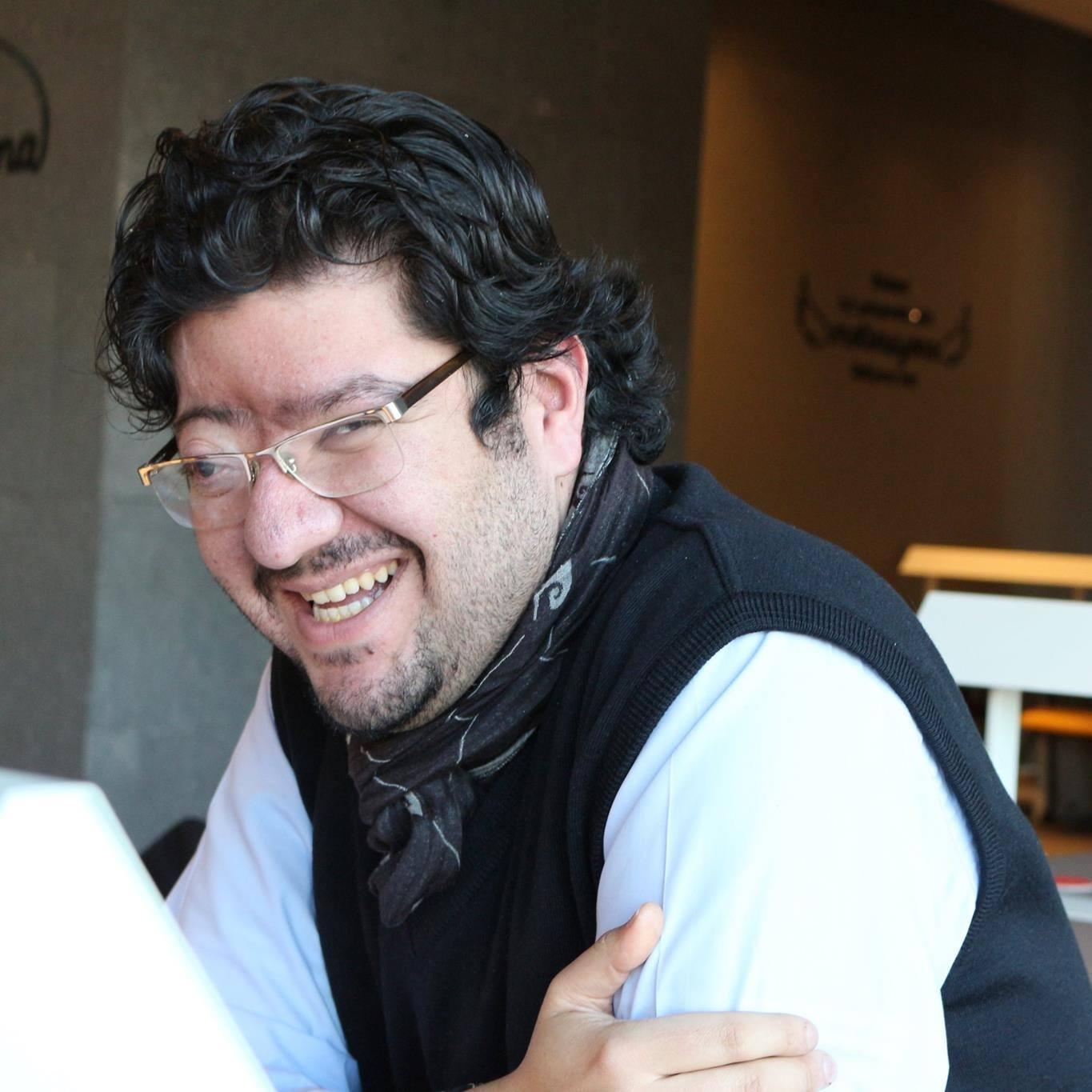
We believe in bringing people together, which is why we host networking events and seminars that are vibrant hubs for researchers from diverse backgrounds. These events spark connections, spur new ideas, and plant the seeds for lifelong collaboration. Sharing knowledge is at the heart of what we do. We are open forums where researchers can publish their findings and share their work with the world. Together, we help advance science and inspire others to build on our discoveries.
Our vision goes beyond short-term goals. We strive to build lasting relationships between universities, ensuring that our entrepreneurial spirit endures long after the offering period. We grow together by fostering a culture of sharing and supporting one another Join us on this exciting journey of power and connection.
Together we build a brighter future for research, knowledge sharing and the world Through the power of collaboration, we can have a meaningful impact that transcends borders and generations. Let’s encourage each other, empower researchers, and unlock the potential of our united global community.
The European Year of Skills initiatives provide an opportunity to close the skills gap, preparing young people to seize emerging opportunities in industries driven by clean energy, digital and technological advances. Dialogue between stakeholders is essential to fully realize the potential of the European Year of Skills initiatives. Government, the private sector, educational institutions and civil society can work together to develop and implement effective policies, programs and training programs.
11
story Regional Funds Online Magazine
Muratcan
By ensuring that education and training programs match the needs of the labor market, young Turks can be agile and adaptable, ensuring their employability in a rapidly growing economy. Furthermore, mentoring and counseling play an important role in youth empowerment. Combining mentoring programs with young and experienced professionals can provide valuable insights, nurture talent and foster a culture of continuous learning.
It is also important in empowering vulnerable groups and NEETs to overcome social stigma and discrimination. By fostering an inclusive work environment that celebrates diversity, we create a supportive environment where unique skills and perspectives can flourish.
This drives innovation and progress in areas related to climate change, as di ff erent voices contribute new ideas and solutions. Furthermore, promoting green initiatives among vulnerable groups and NEETs can make a difference. Through guidance, support and funding, we empower these individuals to turn their creative ideas into impactful businesses that contribute to a sustainable green future.
In conclusion, empowering vulnerable youth through skills development is key to embracing the challenges posed by climate change. By addressing key barriers and creating new opportunities, we can build a workforce that is equipped to address environmental issues and create positive change. Through collaboration, education and solidarity, we can pave the way for a brighter and more sustainable future for all Together, let us empower our youth to be the leaders of tomorrow, shaping a greener world for generations to come..
Muratcan IŞILDAK President of Genç Düşünce Enstitüsü (Youth Think Tank)
12
Regional Funds Online Magazine
First edition of the Youth Employment Summit in Barcelona
• Spain continues to be the OECD country with the most unemployed young people.
• The event, organized by Autoocupació and the Fund for Youth Employment of EEA & Norway Grants, was a success of participation.
• Lion Dreams, a short film to promote entrepreneurship among young people around the world, was released.
Barcelona, 5 July 2023. On June 29, Autoocupació organized the Youth Employment Summit at the Caixa Fòrum Macaya, in collaboration with the Fund for Youth Employment of EEA & Norway Grants, a day in which the new strategies of youth employment policies were presented, as well as some of the best practices of innovation and cooperation in this field. It was attended by more than 150 people representing public and private entities in the field of employment from 10 European countries.
The day was opened by Albert Colomer, President of Autoocupació, and Nora Mehsen, representing the Fund for Youth Employment of EEA & Norway Grants.
The first session focused on new youth employment policies. Veerle Miranda, representing the OECD, again noted that "Spain continues to be the OECD country with the most unemployed young people". Miquel Carrión, representative of the Servei d'Ocupació de Catalunya, added that "a young person trained has three times as many chances of finding a job as one who is not”.
Good practices in youth employment
This was followed by four round tables to share best practices on youth employment in Catalonia.
The first round table presented the voluntary mentoring program for young self-employment entrepreneurs within the framework of the Young
Entrepreneurs Succeed project. Jo Gray, representative of Youth Business International, said that "it is often surprising that mentors do this work voluntarily, but there is no other way to do it than with initiative and drive."
Guillem Arís, Director of Autoocupació, shared the impact of the mentoring program: "The 5-year survival rate of the mentored companies is 87%, more than double the average in Spain." Daniel Venteo, as a volunteer mentor, and Rubén Fernández, founder of Jabonalia, shared their experience in the program.
Then three more conferences were held to share the best practices in educational return, with the participation of the Asociación Española de Escuelas de Segunda Oportunidad and El Llindar Fundació, in dual training, with the participation of the Servei d'Ocupació de Catalunya, Fundación Exit and Superwagen and in labor insertion, with the participation of the Incorpora network of the Fundació La Caixa and Fundació Intermedia. All the round tables had the participation of beneficiaries of the initiatives to give visibility to their impact.
What is the future of work?
Albert Cañigueral, explorer, consultant and disseminator, announced the changes that will mark the future of work and how technology will affect labor relations. "85% of jobs of the future are still not invented," he said.
The Youth Employment Summit was closed by Gian Luca Bombarda, Director of the Fund for Youth Empolyment of EEA & Norway Grants, and by Oriol Amorós, Secretary General of the Departament de Drets Socials of the Generalitat de Catalunya.
Check here the photos of the Youth Employment Summit
13
Regional Funds Online Magazine
Lion Dreams premiere
That same afternoon Lion Dreams was premiered, a short film promoted by Autoocupació to promote entrepreneurship among young people. The film is based on the true story of a young entrepreneur who has developed a solution to facilitate the coexistence between humans and wild animals in Africa.
The film has been directed by Jordi López, produced by Laura Egidos and Albert Aynès, written by Aleix Mestre and Dani Belenguer and interpreted by Usu Tambadou and Sol Merino, all of them young professionals who start their professional careers in the world of cinema.
Guillem Arís, Director of Autoocupació, defined Lion Dreams as "an inspiring story, a real example of entrepreneurial spirit, with a social component and environmental sustainability" and kicked off the Oscar race for the best short film: "we do not give up on anything!".
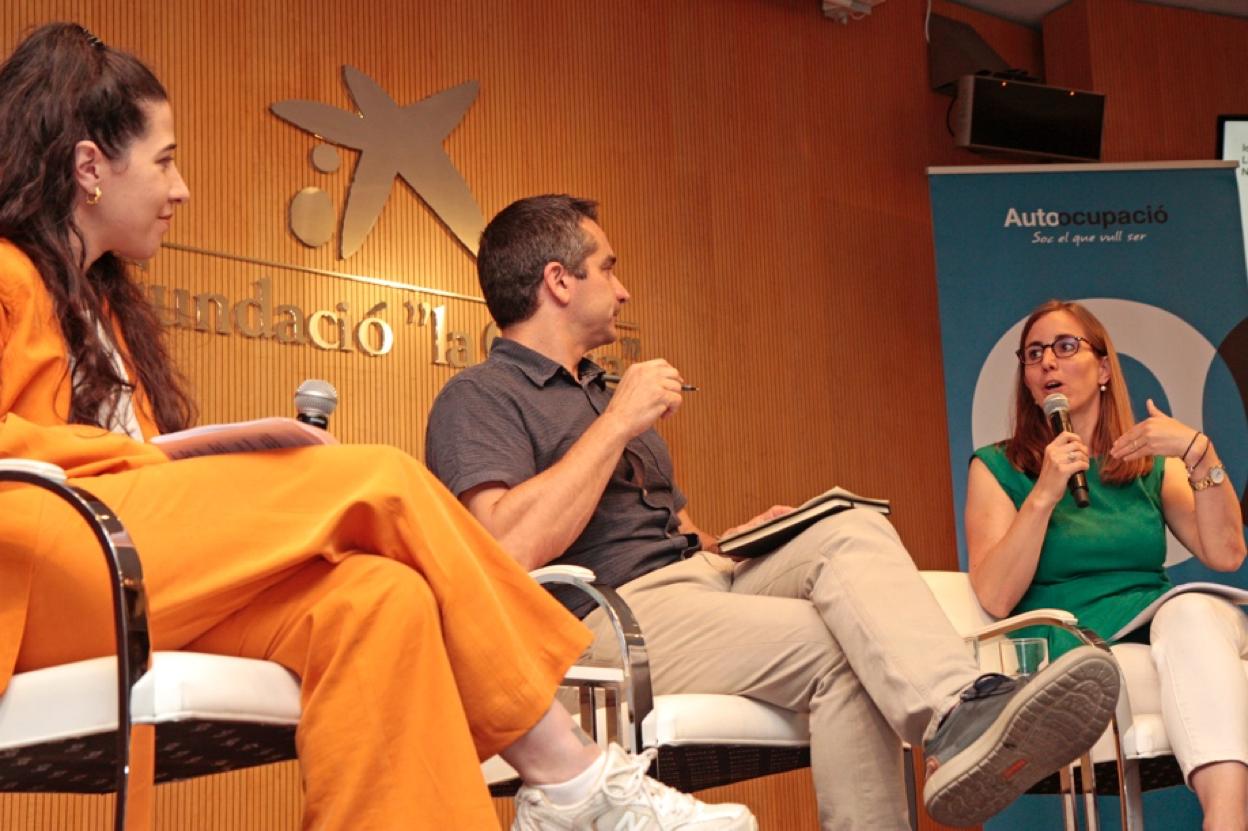
Check here the photos of the premiere of Lion Dreams
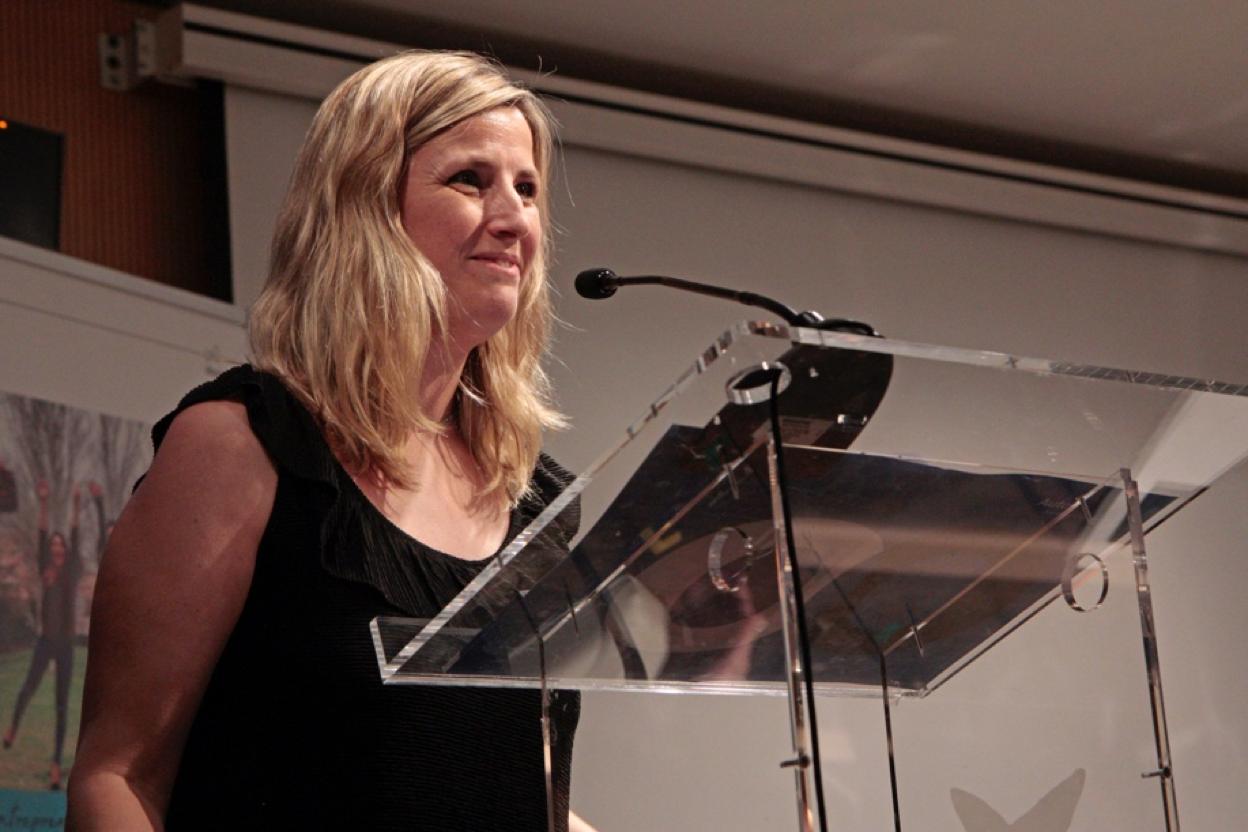
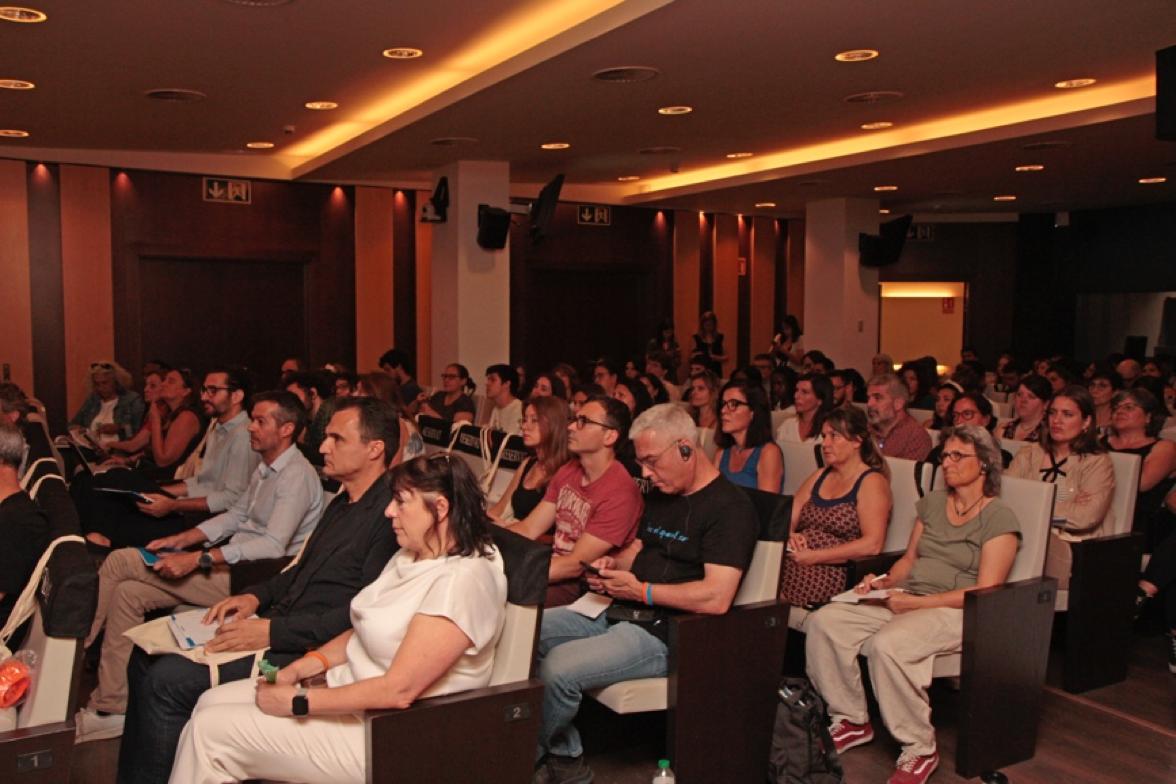
About Autoocupació
Autoocupació (www.autoocupacio.org) is a private non-profit foundation whose mission is to promote self-employment as an attractive alternative for the exercise of vocations and the professional development of people and facilitate access to the necessary resources to create and consolidate their businesses.
Autoocupació provides guidance, advice, training, financing, intermediation and accompaniment services to entrepreneurs from its headquarters in Barcelona, Girona, Lleida and Tarragona in collaboration with national and international public and private institutions. Autoocupació is a member of Youth Business International, a network that has 15,000 volunteer mentors accompanying young entrepreneurs to create and consolidate their businesses in more than 50 countries, reaching a survival rate of 87% at 5 years.
Since 1986, Self-Employment has supported the creation of more than 5,000 new businesses and more than 10,000 new jobs.
YES! Project
14 Regional Funds Online Magazine

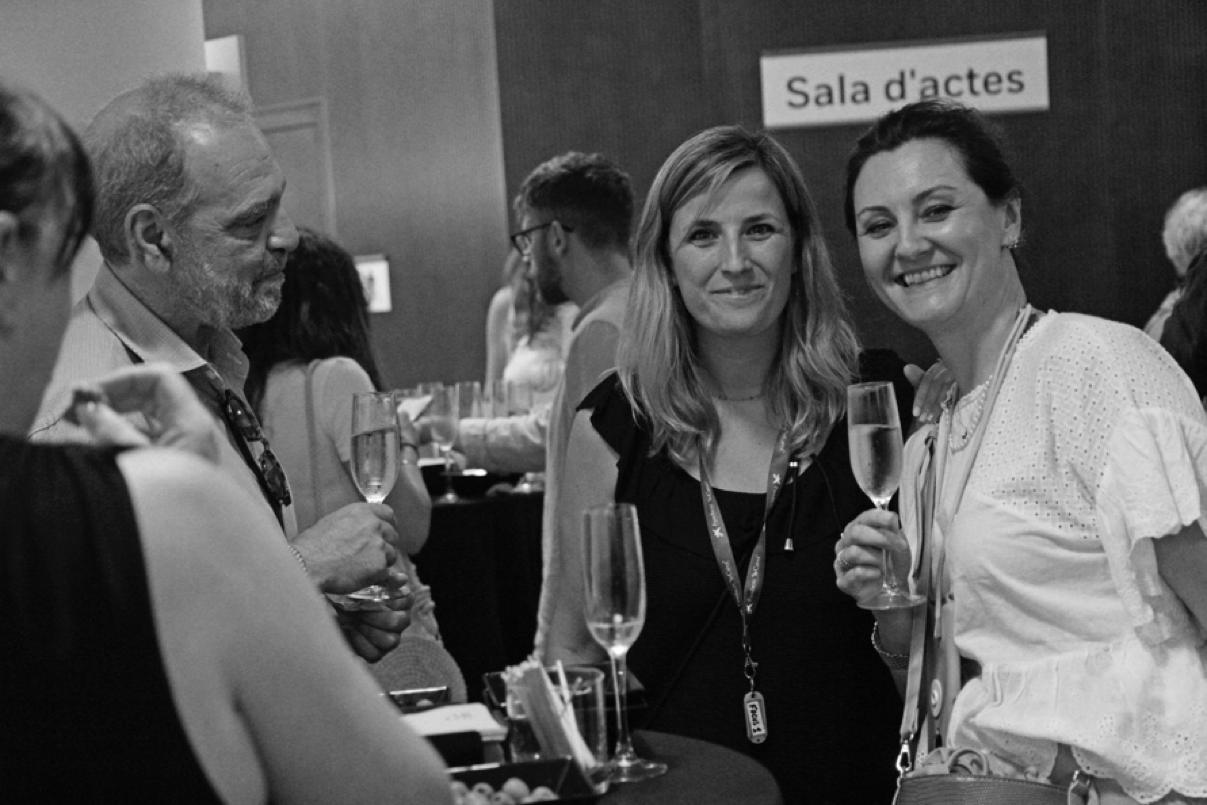
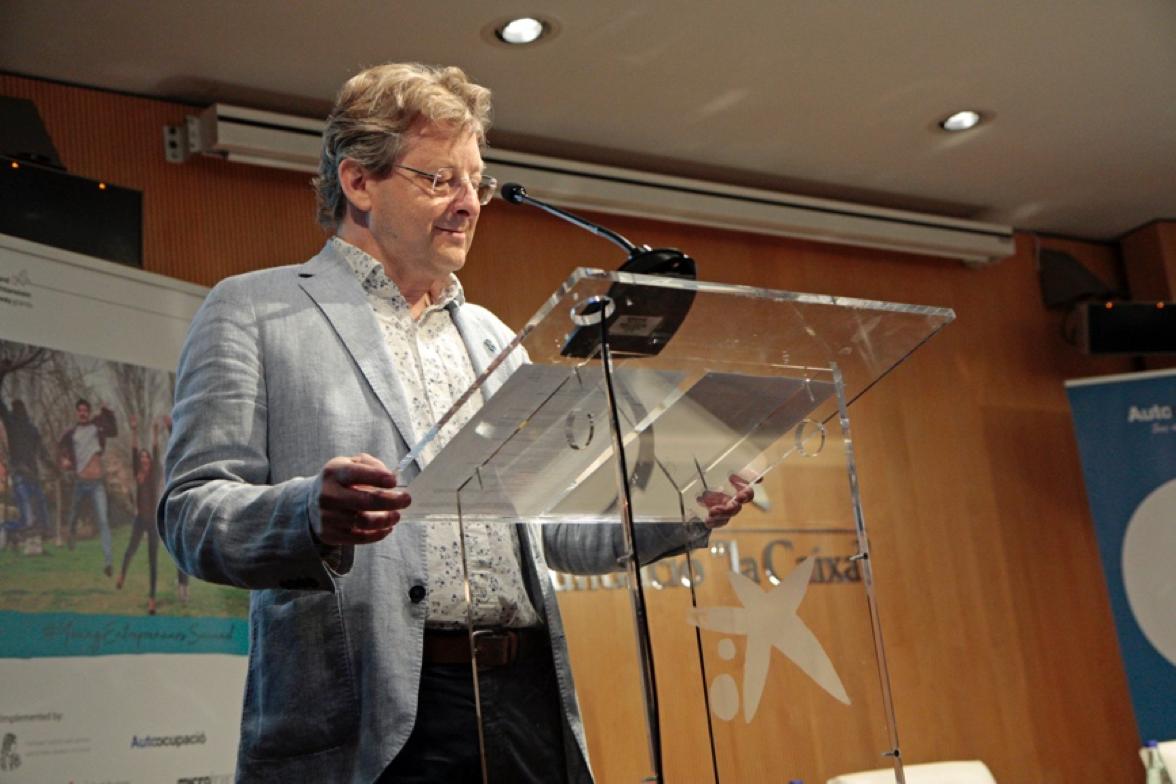
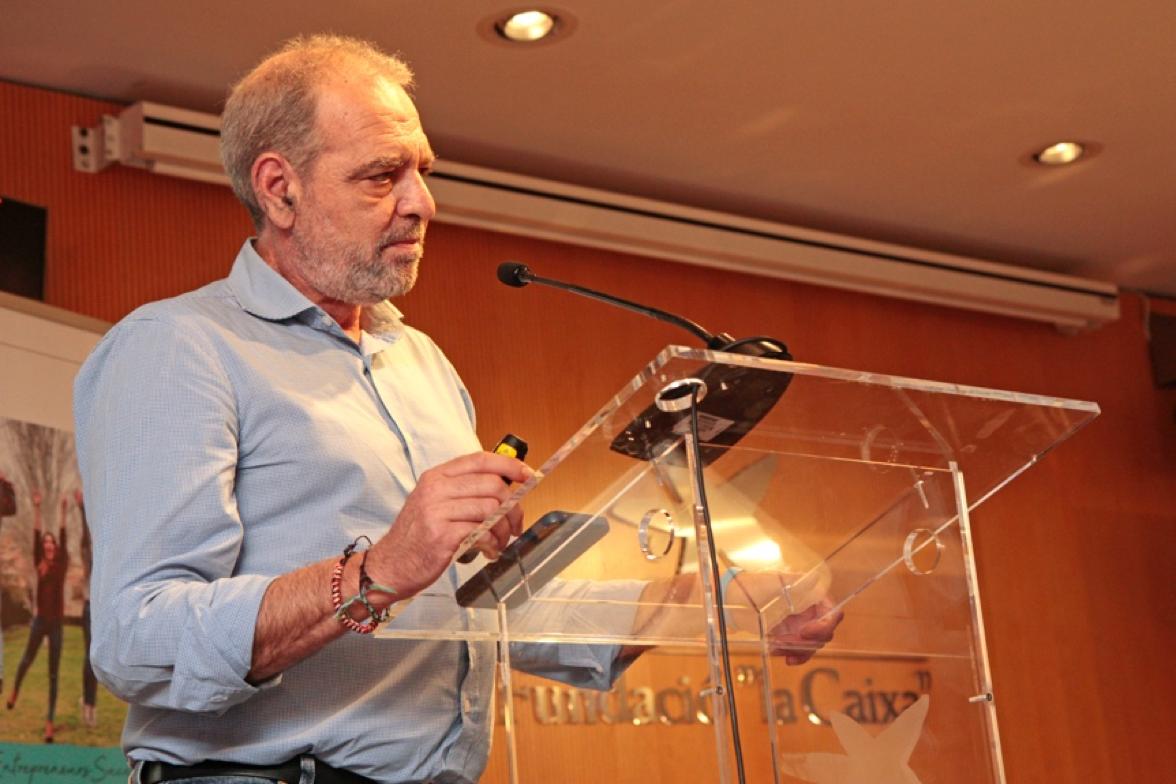
15 Regional Funds Online Magazine
YOUTHShare and Cowork4YOUTH at the first EuroNordic Network Summit (ENN) in Oslo
Transnational cooperation, knowledge sharing and networking. These were the keywords of the first edition of the 'EURO-NORDIC NETWORK
SUMMIT (ENN) 2023 - Shaping A Collaborative EuroNordic Grant Network', an international conference held in Oslo on the 29th and 30th of June 2023.
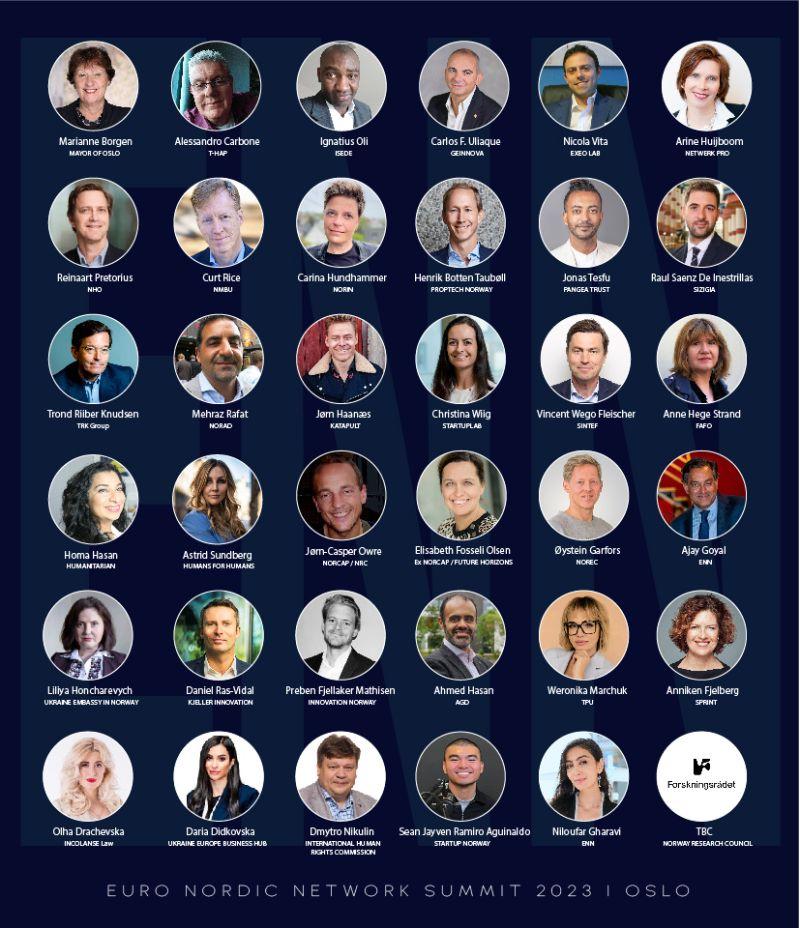
The ENN - established upon an initiative of Niloufar Gharavi (ENN Founder) and Ajay Goyal (Founder & CEO ForestSAT) - set a twofold purpose from the very beginning: on one hand, promoting Norwegian and EU north organisations' participation in European and international cooperation programmes; and on the other hand, fostering qualified networking for ongoing inspiration and design of highly innovative ideas and projects. 30 international speakers, more than 10 panels, 4 breakout rooms, more than one hundred participants from all over the world seem to give an explicit sign: the summit was a success.
The event was built around two working days. The first was kicked off with a warm welcome from the Mayor of Oslo, Ms Marianne Borgen, and followed with in-depth insights into Norwegian and Nordic grant schemes, thanks to contributions from specialised agencies such as the Norwegian Agency for Exchange Cooperation (Norec), the Norwegian Agency for Development Cooperation (Norad) and Innovation Norway. Other panels covered the topics of grants VS private investments, the InvestEU Programme, Horizon Europe and Interreg Europe, ensuring quality inputs, practical experiences and tips to improve the design quality, thanks to the contribution of highly specialised organisations in each of the topics covered.
On the second day, a panel was held to encourage the development of future projects for Ukraine's recovery, followed by a session on 'Funding Social Impact', by Leading Humanitarian Players discussing their role in
driving innovation for social impact and how the grants could support that. The morning ended with a panel dedicated to the EEA & Norway Grants, where two successful projects were introduced: YOUTHShare, by Anne Hege Strand (FAFO - Norway), and Cowork4YOUTH, by Nicola Vita (Exeo Lab Srl - Italy). In addition to providing an overview of the actions implemented and the results achieved by each project, presentations also delivered an in-depth reading of the implementation dynamics, with particular emphasis on the interaction and exchange between experts and beneficiary partners.
16
Regional Funds Online Magazine
This latter feature, characteristic of the transnational cooperation projects selected under the EEA & Norway Grants, makes this funding scheme completely different from any other. Not by chance, the session was followed by a lively debate in which the organisations located in the Expert and Donor Countries participated actively and with great interest, as they were clearly keen to better understand the programme's mechanisms and their possible contribution to future projects.
Later sessions focused on the Erasmus Plus programme and the role of artificial intelligence in supporting proposal writing and project management.
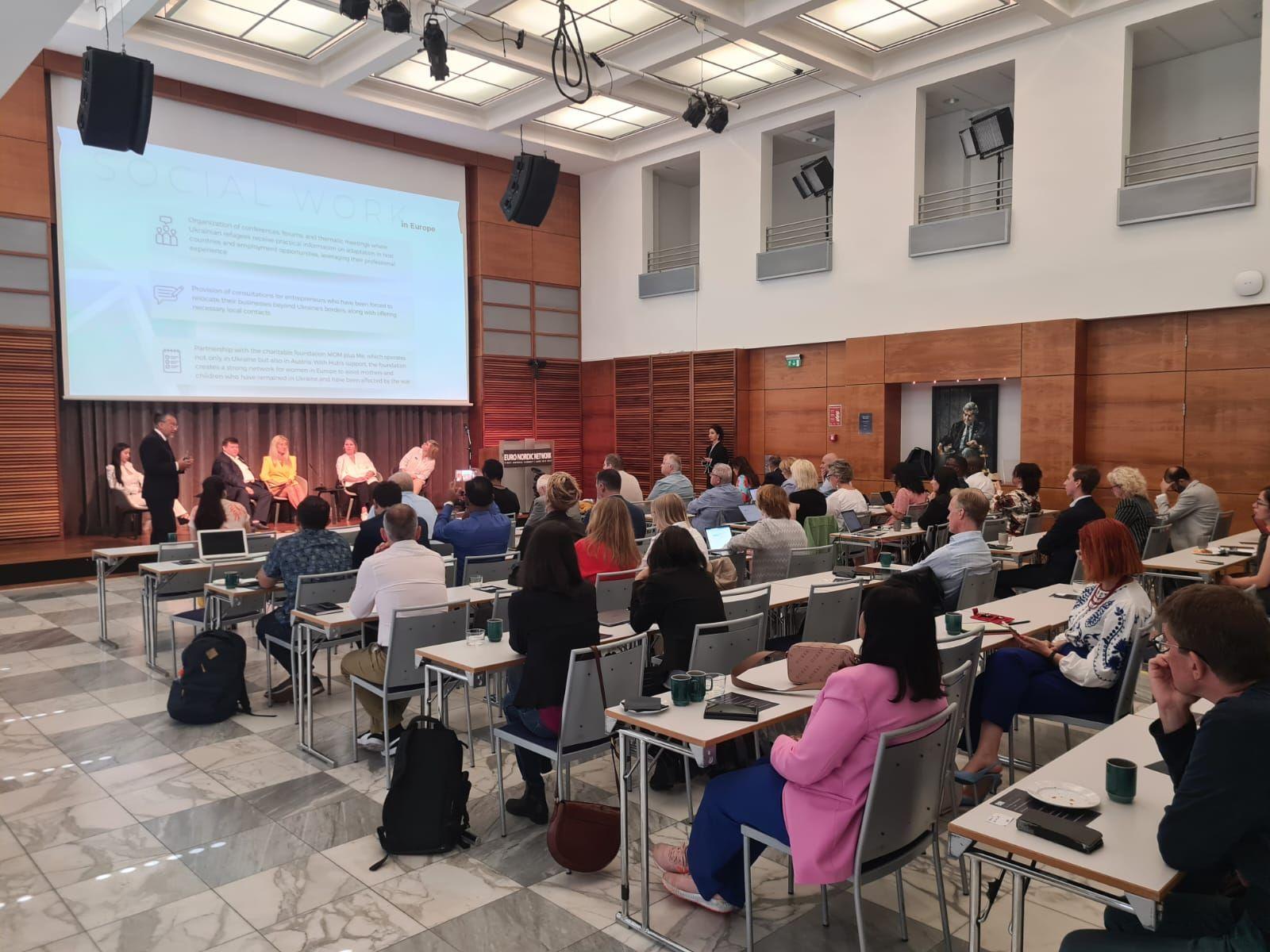
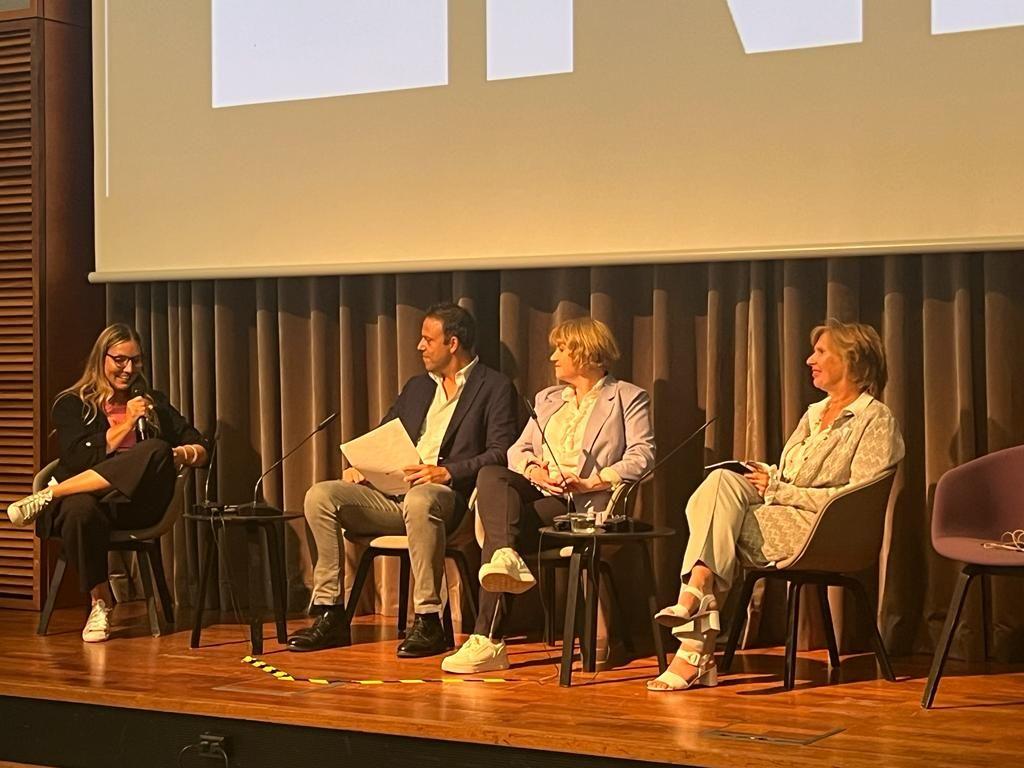
If it is true that 'well begun is half done', we can definitely say that the ENN is just at the beginning of its long and successful journey, given the extraordinary results in terms of participation and follow-up in this first edition. Now let's warm up the engines for the second edition to be held in 2024! Read more about ENN on the official Congress website: https:// euronordicnetwork.org/
YOUTHShare and Cowork4YOUTH Projects
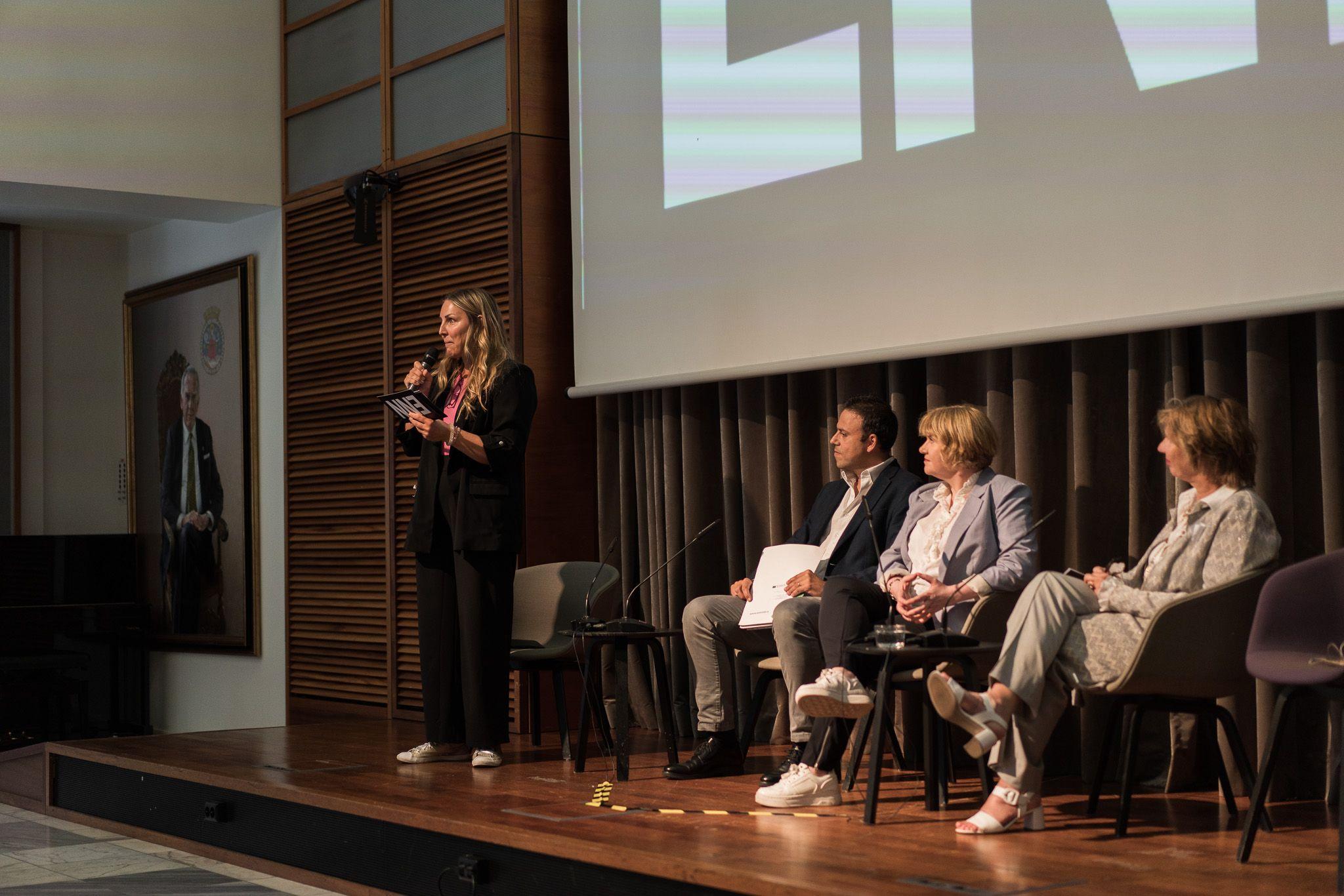
17
Regional Funds Online Magazine
Lublin is the first city in Poland that is the European Youth Capital 2023
Lublin is the capital again!
Lublin was the capital of Poland for a short time, we are worldwide capital of the new circus and now we have the European Youth Capital title- said Agnieszka Parol-Gorna who is coordinator of the European Youth Capital. This year definitely belongs to the young dwellers who co-create cultural, sports and educational offer. They form making new spaces co-managed by them and create the city’s youth politics.
Lublin is a friendly and open place good for the youth’s aspirations and needs. The place where young people, regardless origins, worldview or sexual orientation, have their own space, feel welcomed and their voiced are heard. We want to use The European Youth Capital title to emphasize those values and introduce fixed changes. By doing do, young people living in Lublin will be able to say: “The city is ours. Lublin is YOUth!”
The initiator of Lublin's efforts for the title was - Sempre a Frente Foundation – the biggest youth organization in region.
What does this title mean to Lublin?
Given by the European Youth Forum title aims at supporting position of young people, promoting their participation in social life and enforcing European identity. It is encouragement for cities to think again how to engage the youth in all aspects of city’s life and allow them to cooperate. In the constantly changing world we need even more the young’s participation in local government, cultural, business and any other activities aimed at building common good. Now we can see how the youth’s energy, creativity and knowledge of the contemporary can create new chances of Lublin’s development. It is even more important during the war on the territory of our eastern neighbour. Ukrainian youth who is present in Lublin brought values, dreams and prospects; EYC is a great chance for them to integrate and be involved in creating the future of our city. We start with a very good level- Lublin has yet been a student city with unique, friendly for the youth social surrounding and good cultural, educational facilities. Yet, still we want to develop, cooperate with new groups and jump at a chance whenever possible.
How do the youth organizations cooperate with Lublin?
Agnieszka: One of the leading slogans of the European Youth Capital, which I always emphasize, is: “nothing about Youth without Youth”. Competition application, the schedule of events and the majority of the current actions we conduct and consult with young people. We have appointed the Program Council of the EYC, we work closely with the Youth City Council, foundations and non-governmental organizations in Lublin such as the Sempre a Frente Foundation or the Homo Faber Association. We do research and get feedback to improve our solutions. Worth mentioning is the fact that together with the young we created youth space HEY! on Peowiaków 11 Street. Its interior, functionality and equipment is what people being there need. They can use rooms and everything there freely. In this year we will open 10 more places like this dedicated to the youth. We want to fill Lublin with accessible, free of charge and friendly places for young inhabitants. Partnership in relations and cooperation if one of the most important effects of the European Youth Capital in Lublin.
18
Regional Funds Online Magazine
The framework programme of EYC 2023
The yearly programme of European Youth Capital is divided into 4 sezons and each part is devoted to different activities. We thought about realization of this task the same as about meeting new people and building community. Firstly, we created friendly space to meet someone and strike up a conversation. Then, we gain civic knowledge and, as a part of volunteering, hand in hand we will create the city together as #LublinIsYouth. In the third sezon of the European Youth Capital, we will spend more time on charging battery, relaxing together and experiencing adventures without worries- it is vacation! In those days, we will organize unique birthday of the city. In the fourth sezon Lublin will become European Youth Capital in its fullest sense of the word - place of the most important international events, namely: social, sports, and cultural. Detailed description of planned events of each edition can be found on the website: youth.lublin.eu.
Half of the EYC is behind us
The first sezon - quarter of the year of the European Youth Capital was under the name: “Let’s meet!”. It was the time of meetings, conversations and knowing the city afresh from the youth perspective. We presented to a wide audience goals and assumptions that are to be achieved, organized the Congress of Young Activists, together with young people and universities in Lublin we celebrated the first day of spring at Litewski Square and talked about the future. Billboards and flags appeared in the city that announced Lublin as a capital. Culmination of the first edition of EYC was The Openning Festival ended with beautiful and moving Gala where the youth officially took over Lublin.
In the first sezon we have started pivotal projects for The European Youth Capital: City Academia, The youth inspires districts, voluntary service in Lublin and school civic budget. We have opened intake of projects of further youth spaces that fill the youth map of Lublin. Works of youth politics are in progress. We also founded the Civil Dialogue Commission and the EYC Program Council. All this create an image of cooperation between the youth and city representatives and non-govermental organizations. Even if the first months were intense and full of emotions, in the next months the pace was not slower. Spring and summer in Euroepan Youth Capital are the time of work and fun. Settled projects from the previous quarter have been in progress. It means that Lublin has begun to change under the influence of active and involved in civic life youth.
Common effort deserves common celebrating so we thought about the time for fun. In May, squares of Lublin turned into big stages where performed the best Polish (and not only) artists. Keys to Lublin were taken over by students of all of our universities. The programme of events in May included among others: Lublinalia - Lublin Student Culture Days, this is the biggest student party in the city, National Student Theater Spring, and Polonez for Lublin on May 3, Europe Day and the Gala of Culture. We did not forget about sports freaks and together supported contestants in: Polish Academic Floorball Championships, Final Tournament of the Polish Academic Basketball Championship (for women and men), and Arena Grand Prix Polish Cup Final so swimming tournament for the best swimmers in Poland organized in association with Polish Swimming Federation. About 700 swimmers from Poland will take part in this event.
The second sezon of European Youth Capital was also an opportunity to meet official delegations of partner cities and met during together deliberation of the Lublin City Council and the Youth City Council in Lublin. In this way we exchange experiences, learn good practices from one another and together create the reality so it can be more adjustable to aspirations and need of young people.
# Let’s Chill In Lubin
What can the European Youth Capital offer during holidays? At the end of the month, Lublin changes into a huge circus arena. From 27 to 30 July the whole Poland comes for Carnaval Sztukmistrzów and Urban Highline Festival.
19 Regional Funds Online Magazine
Does somebody do not know what it is? This is what we are famous for in the country and Europe. What is important, Carnaval Sztukmistrzów is the performance of wolrd-renowed circus artists who are supporters of the NEW CIRCUS. During those days, the audience is enchanted and together with artists explore unique phenomena. Streets are the stage and artists or spectators becomes actors. This is when the limits are gone. You need to experience it yourself. Details: https://carnavallublin.eu/pl/
Let’s stay for one moment in the topic of a circus. Soon after the carnaval, we invite for the 45 edition of the European Juggling Convention organized by The Magicans Foundation. Bear in mind: 29 July to 6 August and see you in the city. When we will be satisfied with circus atmosphere, we can explore other fields of art. Meeting of Styles is the best option. It is one of the most important events for streetart and graffiti lovers. Thanks to it, Polish buildings are decorated with artistic works. In this way huge pieces of art change the way the city looks and are a good form of renewing Lublin. Lublin becomes an art gallery outdoors. You need to see it!
What are the activities outdoors? At the beginning of July in the Cultural Centre launches Central Playground. There is just one rule: freedom and easefulness. The Wild Children Reserve will be also open. This is a place where children can experience world by al senses on their own. In the European Youth Capital we also support physical and sports activities. Particularly, we invite you to cheer up participants taking part in the World Cup U23 in basketball. There will be an opportunity to compete in city tournament, open also for amateurs.
When summer is slowly disappearing and paves the way for autumn, we can invite you to Lublin for very important event for us: Cross-Boarder Cooperation Congress. We have organized it for over 10 years, year by year. It is a crucial event that connects: local governments, non-governmental organizations, science, culture and business. We are proud of the fact that thousands of poeple from over 40 countries have taken part in the Congress. On the other hand, in October new students will be welcomed in the centre on the concert “Hi Żaks!” There is going to be very interesting and yet it has been just an introduction to wide cultural, sports and music European Youth Capital offer. Full calendar of events can be found on our website. About current events one can get to know from our social media.
What is next?
We want to use cooperation of young people, city and various organizations, associations and institutions to work more effectively for common good. Our projects include activation initiatives, the youth’s form of civic budget and open programmes aimed at toleration and climate issues. There are also initiatives created with the disabled. The city gives financial, educational, developmental support and lets the youth act. In this way, stable solutions are made that will change the reality of Lublin. Youth Power Potential that is made together within EYC will have not disappeared by December 2023. The Youth Power driving our city is a fund that we cannot waste. This is why we focus on the best way in which we can take advantage of this opportunity and work out new standards that will include young people’s deciding about the city’s look. 2023 is the time of creating connections between the youth in Lubin and a stable change in city’s youth politics.
See You in Lublin: the centre of the youth’s energy!
More on:
The website of EYC: https://lublin.eu/en/lublin/youth-lublin/
Instagram: https://www.instagram.com/lublin_is_youth/
Facebook: https://www.facebook.com/LublinisYOUth
20 Regional Funds Online Magazine
Interview with Gian Luca Bombarda, Fund Director of the Fund for Youth Employment
That is why a Fund such as the Fund for Youth Employment was needed and, particularly, unlike the ordinary programs funded by Iceland, Liechtenstein, and Norway – EEA & Norway Grants –, this Fund has a transnational focus – it helps entities across Europe pooling their efforts to find new ways of reducing youth unemployment.
With that goal, the €60.6 million Fund for Youth Employment complements the Youth Employment Initiative, which is the main EU funding program to facilitate the roll-out of the Youth Guarantee –a commitment by all EU Member States to ensure that young people receive good quality offer of employment, continued education and apprenticeship.
1. What is the Fund for Youth Employment? Who are your donors?
What are your goals?
The Fund for Youth Employment, launched in 2017, aims at contributing to sustainable and quality youth employment in Europe. Nowadays, unfortunately, about 10 million young people in our territories are not in employment, education, or training, we are now used to categorise them as NEETs, a concept that, recently, demonstrated the need to be adapted to a changed society, starting from the targeted age (the group 15-24 should be enlarged at least up to 30 years old).
Unemployment among youth, in other words, is a shared European challenge, together with its effects, since they are putting young people at risk of poverty and social exclusion. The pandemic, for example, exacerbated labor market possibilities of young people, some of them feel outside any channel or valuable network.
Two calls for proposals were launched, one in 2017 – Active Youth – and one in 2020 – Unlocking youth Potential. The first call selected 25 projects with participants from 25 countries, with a total budget of €60.6 million. The projects cover three support areas: innovation and exploration, transfer of know-how and good practice, and analysis and research. The second call was launched on 1 September 2020 with €11.5 million available for transnational projects with partners from the 15 Beneficiary States, as well as organisations in Ireland, Italy, and Spain. The funding is reserved for initiatives seeking to ensure access to employment, education, or training for two specific target groups: young people not in employment, education or training (NEET) who are between 25 and 29 years old and live in small towns, suburbs or rural areas; and young people with disabilities or mental health disorders.
The calls and the awarded Projects are funded under the EEA & Norway Grants – Iceland, Liechtenstein and Norway, the Donors –, a funding scheme that aims to reduce social and economic disparities in Europe strengthening bilateral relations between the Donors countries and the beneficiary countries. Not surprisingly, one of the main goals is youth employment, which is as well a shared European challenge affecting millions of young people not in employment, education, or training.
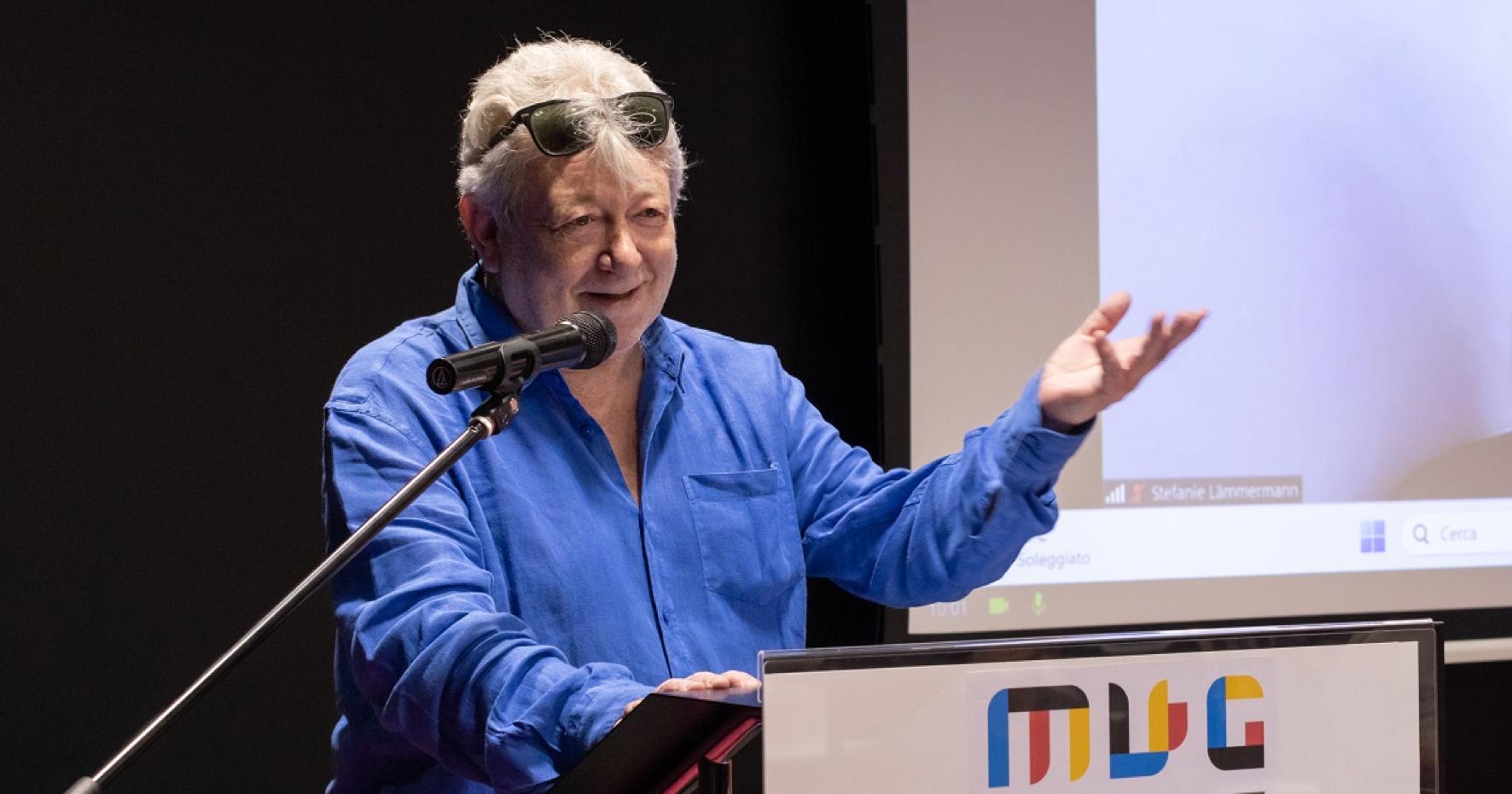
21
Regional Funds Online Magazine
2. What are the covered and financed priority areas? Which entities had the possibility to participate to the calls?
The funded Projects are developing innovative solutions for the main target group (young people from 15 to 24 years old) including as well the long-term unemployed, discouraged people who have stopped looking for work, inactive women caring for children or incapacitated adults, ethnic minorities including Roma, asylum-seekers, the low-skilled, and people with mental health issues and the disabled are particularly welcome. It is important to state that all kind of entities (Universities/Research Centers, NGOs, CSOs, International Organisations, any public and/or private bodies for-profit and not-for-profit; in practice only physical persons are excluded to be part of the implementing consortia, while they will be the target) had the possibility to participate to get financing. The best proposals were awarded, but we register the participation of 424 entities. The measures implemented by the Projects are several, both systemic (e.g. developing formal educational modules; develop systematic cooperation with nontraditional stakeholders), and personal (e.g. attending to the individual needs of the members of the target group). The Fund for Youth Employment finances actions able to create efficient practices such as sustainable jobs, trainings for structural labour, digitalization and smart autonomation, creation of innovative start-ups to support young entrepreneurs, family learning, mix of formal and non-formal learning arenas, involving different stakeholders like social services, medical and psychiatric professionals, communities, NGOs, SMEs and many others. In general, through those measures, the Projects are covering the three main support areas of the Fund: Innovation and exploration; Transfer of know-how and good practice; Analysis and research.
3. Could you share an example of a successful intervention funded by the Fund?
With already almost 5 years of implementation, to name just one successful intervention, that we are used to call ‘best practice’ would be difficult. In those years together I have seen and I congratulated myself towards numerous initiatives led by the Projects, particularly the
ones organised through a natural networking of the Projects (sometimes involving the Fund for Regional Cooperation as well, the other Fund we manage under the Regional Funds). Some of our Projects, in addition, won external but very important awards. The majority continues to create their publications and research activities.
But why not talking about the Project ‘YES! – Young Entrepreneurs
Succeed’ where Autoocupació is among the Beneficiary Partners? I would like just to mention their knowledge sharing webinar series, designed to engage stakeholders, training practitioners, coaches and mentors who are working with NEETS and want to explore innovative tools and techniques to support them. In addition, a special mention has to be done to the innovative SOS Mentoring initiative, a volunteer program in which experienced professionals helped entrepreneurs during Covid-19 time to take the necessary decisions to deal with this emergency situation, containing the impact of the crisis, ensuring the continuity of this companies and maintaining their employment.
4. How do you measure the impact of your interventions?
I believe that some numbers can give you the idea of our successes. Considering, in general, the Active Youth call, the main goal was at the beginning to enroll 15.000 young people in education or training, to support 14.000 young people in active job search, create 3.000 jobs in NGOs, social enterprises and the ordinary labour market, and help 1.800 young people start up their own businesses. Please, just have a look at the numbers/results achieved at 31.12.2022, and we still have one year to go:
• 16.808 NEETs/target group engaged in active job search (RFYOUTH)
• 15.086 former NEETs/target group enrolled in education and training, including work-based learning (RF-YOUTH)
• 2.526 NEETs/target group in the process of starting their own businesses (RF-YOUTH)
• 4.325 beneficiaries of services provided or improved (RFCOOPERATION, several outcomes)
22 Regional Funds Online Magazine
• 25.111 people engaged in civil society organisation activities (RFCOOPERATION, several outcomes)».
5. Do you think the YE Projects are sustainable? Will they have effect in the future?
For sure they are sustainable: the Projects are working daily to find innovative solutions able to create effects for a long-term perspective. The hope of the entire Regional Funds, alongside all possible future evolutions of the financing, is that the funded Projects will be taken as a mix of lessons learnt and best practices to be emulated, thanks to a process of knowledge sharing, for future similar initiative.
6. Autoocupació’s claim is “I am what I want to be”. What about you?
JCP Srl Italy, which is representing the Fund Operator together with Ecorys Polska, is a company with more than 30 years of history in international cooperation actions, therefore it is doing different things and following different paths. But with the quality of Fund Director of this initiative, I can tell you that I am really doing what I want to achieve, following the challenges I want to win, and the Regional Funds are allowing me to help the cause of youth unemployment. Simply, and I think this can be perfectly related, I like my own motto: ‘We need YOU(th)! We need you(th) because you(th) are our future. And it is a must, for us, to continue working to allow them to shape a better society.
YES! Project
23 Regional Funds Online Magazine
Theme of the issue
The initiatives will also focus on the activation of more women, young people and vulnerable groups on the labour market. Matching people's aspirations and skill sets with opportunities on the job market, especially for the green and digital transition and the economic recovery. A special focus will be given to activate more people for the labour market, in particular women and young people, especially those not in education, employment or training.
How do you interpret those words when thinking about your project?
Rolling out the European Universities initiative and upskilling scientists is part of the European strategy for 2023. Considering EEA & Norway Grants’ priorities and your Project involvement, how do you see concretely building long-term transnational alliances between higher education institutions and developing a core set of skills for researchers?

24
Regional Funds Online Magazine
Youth is the time of life full of promise - let’s do it!
Young women and men have almost the same expectations of working in a science-related field, but with age and at higher levels of education, women tend to move away from Science, Technology, Engineering and Mathematics (STEM) and ICT subjects. Available data ('Women in the digital age', 2018) shows that only one in three STEM graduates is a woman. The pace of change is not promising, as the percentage of women in ICT jobs in the European Union (EU) increased by only 0.5 % between 2012 and 2016."
In what concern to young women, last year, 71% had the highest participation in the StayOn project. Only 18% of these young women graduated and, of these 18%, only 30% choose STEM or ICT degrees. In our work, we also observed that 15% of these young graduates, without any kind of degree in STEM or ICT, showed some kind of interest in receiving training in IT or entrepreneurship. These data represent what is referred to by the European objectives of the Plan for Digital Education. "Fewer and fewer women are interested in participating in the digital sector, whether in higher education, employment or entrepreneurship. The Commission study "She Figures - Gender in research and innovation: statistics and indicators" (2021) confirms this trend.
According to the study, women represent only 20% of Information and Communication Technology (ICT) graduates and only 17% have jobs in the technology sector. Women also represent only 24% of independent professionals in technical professions such as science, engineering or ICT. An example of this was the training choices of the young people in the StayOn project in Portugal, which were mostly related to Business Skills, Digital Marketing, Introduction to Graphic Design, Digital Skills, Web Marketing and Analytics, and Salary Procedure. And as a complement to
learning, the Co-innovation laboratories dynamized by CRESAÇOR provided contact with the Azorean business sector.
The entrepreneurial skills, particularly of young women, increase their confidence to use them creatively to identify opportunities, innovate and create value for society. Broadening professional horizons also involves knowing different ways of working, and contact with entrepreneurs and companies from different activity sectors.
For both, men and women: youth is the time of life full of promise, aspiration and energy. Between childhood and adulthood, youth is when men and women are most eager to strike out to secure their futures and to contribute to their families, communities, and societies. This stage of life is crucial in determining young people’s paths to achieving productive employment and decent work. Let’s do it!
CRESAÇOR
www.stay-on.eu
IG: @stayon_project
FB: @stayonproject21
StayOn Project
‘ European Institute for Gender Equality: Women and men in ICT: a chance for better work-life balance, 2018
‘' https://education.ec.europa.eu/focus-topics/digital-education/action-plan/action-13
‘'' She figures 2021 - Publications Office of the EU (europa.eu)
25
Regional Funds Online Magazine
Activating Women, Young People, and Vulnerable Groups in the Labour Market: A Focus on Green and Digital Transition in Ireland

To create a more inclusive and dynamic labour market, a new initiative within our Project is being launched focusing on activating more women, young people, and vulnerable groups. The objective is to match individuals' aspirations and skill sets with the abundant opportunities emerging in the job market, particularly in green and digital transition areas, and the overall economic recovery.
One of the primary goals of this initiative is to address the challenges faced by women and young people who still need to be in education, employment, or training (NEET). In Ireland, thanks to the Stay On Project, we try to empower and enable their successful integration by identifying barriers to their participation in the labour market, such as lack of access to resources (transportation and internet), limited skills (leaving the education or being passive because of household’s chores), or discriminatory practices (especially for women and vulnerable groups).
The green and digital transition presents significant job creation and economic growth potential. As industries increasingly embrace sustainability and technology-driven solutions, there is a growing demand for skilled individuals who can contribute to these sectors. Our Stay On initiative will ensure that women, young people, and vulnerable groups have the necessary knowledge and skills to seize these opportunities through our training programs, coaching, mentorship, and tailored support. Furthermore, Stay On aims to foster social inclusion and equal opportunities by engaging marginalised and vulnerable groups. It recognises that a diverse and inclusive workforce can drive innovation, creativity, and sustainable development.
Partnerships with educational institutions, employers, and community organisations were crucial in implementing this Project. By leveraging existing networks and resources, it will be possible to provide comprehensive support to individuals, including career guidance, job matching, and access to numerous training programs. Stay On Project's success will be measured by increased labour market participation and the positive impact on individuals' lives and the broader community. Together, we are constantly building a more resilient and equitable society by unlocking the potential of women, young people, and vulnerable groups.
26
Regional Funds Online Magazine
In conclusion, our primary mission is to activate more women, young people, and vulnerable groups in the labour market, aligning their aspirations and skill sets with opportunities arising from the green and digital transition. We can empower individuals and contribute to a sustainable and inclusive economic recovery by fostering inclusivity and providing targeted support.
Together, let us seize the potential of every individual and build a future that leaves no one behind.
Meath Partnership
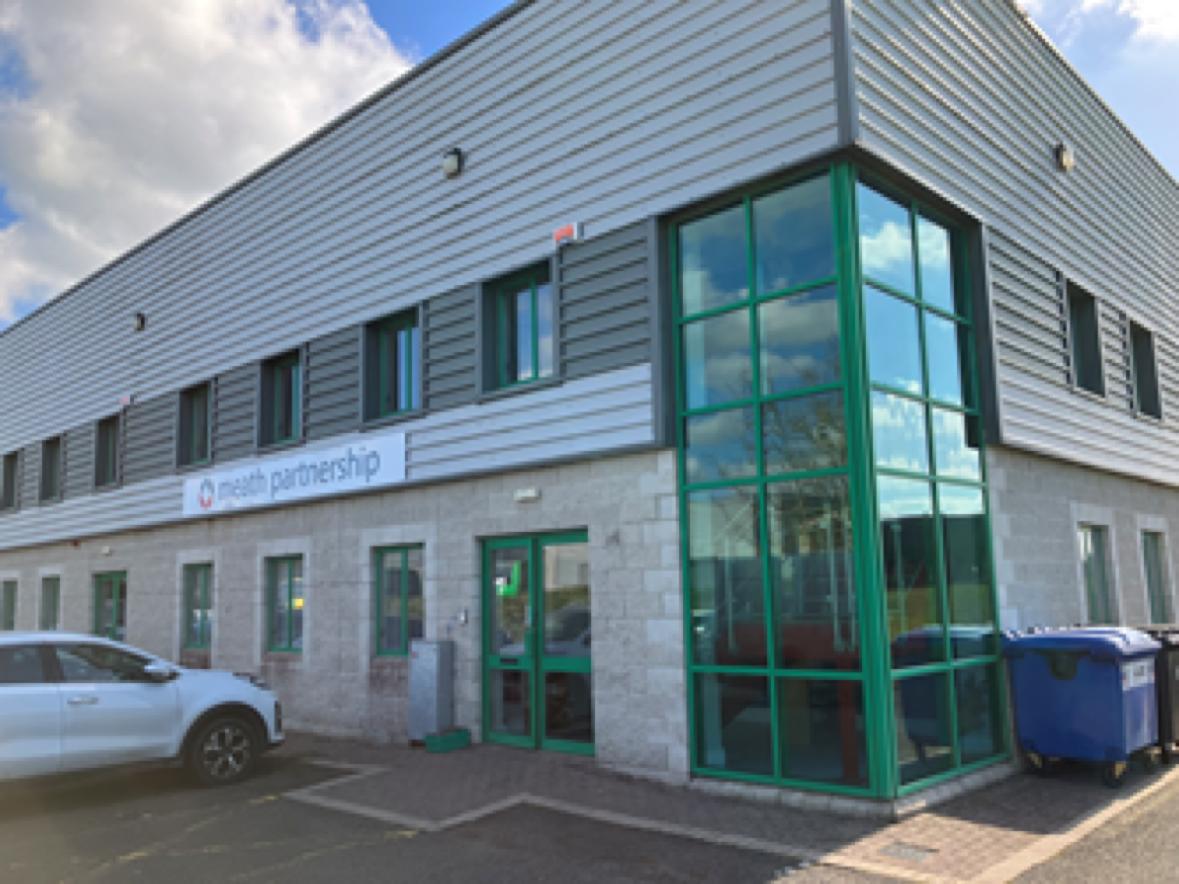
www.stay-on.eu
IG: @stayon_project
FB: @stayonproject21
StayOn project
27
Regional Funds Online Magazine
Supporting Neets in Transitions to the Green Economy (Project INTERCEPT)
In light of the recent development in Europe, the transition towards the green economy gained an even more profound significance. The green transition already resulted in a 32 percent employment growth between 2000 and 2017 in the EU and is further expected to create 24 million green jobs by 2030 globally (ILO, 2018). Cedefop (2021) estimated that the green transition will lead to a change in skills demand and labour market structure as pronounced as the one induced by the technological transformation. The digital transition is inter-twinning with the green transition. While the former is more recognised in terms of skill needs, the latter is more dispersed within the skills spectrum. The INTERCEPT project aims to provide some valuable experiences in this area. Implementing the EU „Fit for 55“ package will even further boost the demand for green and greening skills.
The study of Osborne and Frey (2013) launched a lively discussion on the impact extent to which recent technological advancements impact the occupational structure. The novelty of their approach lay in accounting for advancements in artificial intelligence and robotics emerging ten years ago. They claimed that approximately 47 percent of all jobs in the U.S. is at risk of automation. This estimate launched a lively public debate associated with a stream of studies trying to elaborate on predicting the impact of technologies on occupations. For some occupations, predictions are consistent; for others, expectations change over time. For example, truck drivers were expected to be under a high risk of automation by Frey and Osborne, but are expected to be in high demand by the most recent panel of the World Economic Forum (WEF 2023). 1
Although the level of uncertainty in predicting future skills demand remains high, existing studies agree that technological change will severely impact the occupational structure in the following years. Approximately one out of
four workers is expected to switch jobs, and six in ten workers will need to enhance their skills to retain their current position during the following five years (WEF 2023). Supporting individuals through labour market transitions is recognised among the top priorities of public policies (ILO 2019; European Commission 2019).
Only half of the workers have access to adequate training opportunities (WEF 2023). Participation in adult learning remains associated with substantial barriers, which public policy can at least partially mitigate. This is documented by good examples of countries which managed to enhance access to learning during the unemployment spells of individuals.
International differences in the adult learning participation gap between the employed and unemployed show that active labour market policies can successfully operate on this front. Moreover, they also reveal that while some countries managed to enhance learning of the unemployed, other countries are less successful in this respect. While in some countries (e.g. Austria, the Netherlands or Scandinavia), adult learning participation of the unemployed exceeds the AL participation of the employed, in other countries, this pattern twists.
28
Regional Funds Online Magazine 1 https://www.weforum.org/reports/the-future-of-jobs-report-2023/
Participation in Adult Learning by Employment Status
project (2022), even employers often have a problem grasping the notion of the competencies demanded by the green transition. The INTERCEPT project addresses future challenges by combining support to individuals during labour market transitions and reskilling for the green economy. It designs a tailored programme addressing the needs of the regional green economy. It also outreaches and mobilises NEETs by raising their environmental awareness to equip them with green-economyrelevant skills acquired in formal training as well as at the workplace. While delivering all these activities, the INTERCEPT project frontlines the employment policies in Lithuania, Malta and the Italian region of Tuscany. In a European comparison, regions which are less successful in supporting individuals through labour market transitions by enhanced access to learning during their unemployment.
Article written by Mgr. Miroslav Stefanik, PhD. (Director, Institute of Economic Research - Slovak Academy of Sciences) for INTERCEPT Project
References:
It is dominantly those countries allocating more resources to active labour market policies, manifesting to be more successful in assisting individuals in their career transitions. Support provided through active labour market policies appears to be effective in increasing access to training and upskilling activities, thus supporting individuals in their labour market transitions. With the increased labour market churn propelled by the introduction of new technologies, the performance of public policies in this area becomes even more critical. Although at the macro-level total job creation is going to compensate for the job destruction, job creation is expected to be more dynamic in the green sector, climate change and environmental management technologies (WEF 2023, European Commission 2021). It is hard to assess occupation-specific risks of automation; nevertheless, we are able to extract the major trends. One of the most pronounced is the growing importance of the green economy (European Commission 2021). According to the results of a survey conducted within the INTERCEPT
Cedefop (2021). Digital, greener and more resilient. Insights from Cedefop’s European skills forecast. Luxembourg: Publications Office. http://data.europa.eu/doi/10.2801/154094
European Commission (2019), Directorate-General for Research and Innovation, Future of work, future of society – , Publications Office, 2019, https://data.europa.eu/doi/10.2777/029088
European Commission (2021), Joint Research Centre, Murauskaite-Bull, I., Scapolo, F., Muench, S.et al., The future of jobs is green – , Publications Office, 2021, https://data.europa.eu/doi/10.2760/218792
Frey, C. B., & Osborne, M. A. (2017). The future of employment: How susceptible are jobs to computerisation? Technological Forecasting and Social Change, 114, 254–280. https://doi.org/10.1016/J.TECHFORE. 2016.08.019
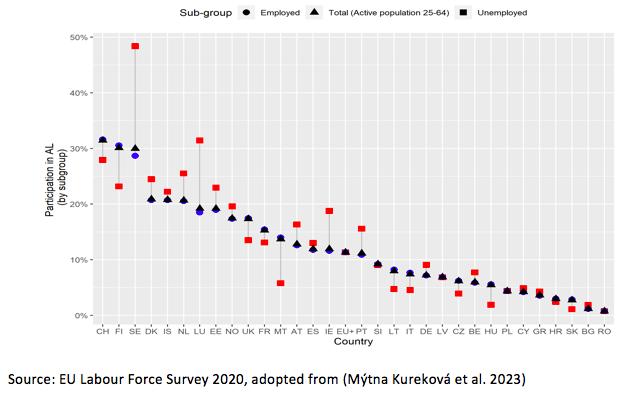
29
Regional Funds Online Magazine
ILO. (2018). World employment and social outlook 2018: Greening with jobs. International Labour Organisation (ILO).
ILO. (2019). Work for a brighter future – Global Commission on the Future of Work. International Labour Office – Geneva: ILO, 2019 ISBN 978-92-2-132796-7
INTERCEPT. (2022). Key cross-cutting competences related to Green jobs and stakeholders’ perspective. https://interceptproject.eu/wp-content/ uploads/2022/09/INTERCEPT_WP4_report.pdf
Mýtna Kureková, L., Lenaerts, K., Studená, I., Štefánik, M., Tobback, I., & Vangeel, N. (2023). Working Paper on the Role of Industrial Relations and Social Dialogue in Improving Adult Learning Outcomes and Equity (pp. 1–49).
World Economic Forum (2023) Future of Jobs Report, Insight Report, May 2023, ISBN-13: 978-2-940631-96-4, Online: https://www.weforum.org/ reports/the-future-of-jobs-report-2023/
INTERCEPT Project
30
Regional Funds Online Magazine
Gender and the digital skills gap
males in positions of dominance. Women are typically associated with domestic and caregiving tasks, while men are portrayed in roles associated with power and authority”, “when females are depicted in professional roles, they are usually stereotypical ones, such as teachers, actresses and nurses”, and “the representation of women was often reduced to household chores, such as sewing and cooking, with an overemphasis on a nurturing role”. Since 2010, similar studies have been conducted in other countries including Spain, and the findings were all similar to textbooks ranging from physics to linguistics.
Our project aims to increase knowledge on the impact of existing policies and offer policy suggestions to enhance youth employment opportunities in less developed EEA regions, but most importantly, with the direct target groups being NEETs aged between 18-29. We do keep an eye, though, on research conducted in relevant subjects, such as the paper on the gender gaps in digital skills. Besides, Cowork4YOUTH’s particular emphasis is on young mothers and the long-term unemployed, which puts into the project’s focus the gender variation as well.

Published as “OECD Education Working Papers No271”, the paper “Gender stereotypes in education: Policies and practices to address gender stereotyping across OECD education systems” addresses the issue of gender stereotypes “in education and beyond”. To reach the level of pursuing a career in STEM fields, education in earlier stages plays a catalytic role in acknowledging the opportunities that are available to men and women equally; and this paper examined where education stands in OECD countries regarding this issue. We particularly examined the reviews on our project’s focus countries, and in this case it was Greece, Italy and Spain.
For Greece, an analysis of textbook anthologies was conducted in 2021 in terms of gender representation, where the findings included that “Men and women are generally portrayed in stereotypical roles and professions, with
“Mind the Gap” is a project run in Italy, Spain and other countries where it challenges gender stereotypes and aspires to prepare practitioners to educate in these kind of stereotypes, including training on “unconscious gender biases”. Italy and Spain also participate in another initiative called “Education for Equality (E4E): Going Beyond Gender Stereotypes”, funded by the Erasmus+ programme of the EU. In Spain, another programme called “Skollae”, won the 2019 UNESCO Prize for Girls' and Women's Education and aims “to teach students to recognise and address inequality based on different dimensions of diversity, including gender 30 EDU/WKP(2022)9 Unclassified and gender identity, and is incorporated into the curriculum at all education levels”. Lastly, in Italy, the project “Girls Code it Better” promotes STEM “educational and career pathways” for girls.
Link: https://www.oecd-ilibrary.org/docserver/a46ae056-en.pdf? expires=1685712236&id=id&accname=guest&checksum=2FA50F62DBB1 C38C84E8A7B0A7F93FE5
Stay connected with us through our social media: facebook, Twitter, LinkedIn: @Cowork4YOUTH, and visit our website https://www.cowork4youth.org/
Cowork4YOUTH Project
31
Regional Funds Online Magazine
Developing Skills of Rural Youth

development and business preincubation to workshops on legal requirements and EU funding.
The idea behind the RAISE Youth project is to pilot and promote an innovative RAISE Model of (self) employment for NEETs based on sustainable agri-business in 4 rural regions of EU with high unemployment rates and depopulation. The focus of the project in Croatia is Lika Senj County – the biggest and the least populated out of 21 counties.

This area has a great potential for agricultural, ecological and tourist development which is slowly starting to be recognized among youth. For the recent years the trend of depopulation is being replaced with the trend of staying on the lands of their ancestors and trying to contribute to the development of this highly underdeveloped area.
What young people usually have is the idea, enthusiasm and family lands. The part they are missing and that usually discourages them in pursuing their dream is the lack of skills.
The RAISE Youth project has recognized this need and for the past several years the project has organized numerous trainings in different areas which help rural youth develop their business - from practical skills, idea
Ever since the start of the project implementation, the preincubation program has been helping youth not only in the business idea development but it has shown very useful to help young people decide whether they are suitable for entrepreneurship or if they should include in the labour market in some other way.
Those who, after the preincubation process, decide to indulge into the journey of entrepreneurship find particularly useful the RAISE mentoring program which helps young entrepreneurs learn legal requirements for registering a business and how to find funding.
32
Regional Funds Online Magazine
Since the spring 2022 RAISE Youth team has been working on the development of pilot permaculture regenerative garden in the heart of Lika Senj County. Permaculture design envisages the revitalization of the agricultural system in order to establish an example of cultivation according to the principles of regenerative agriculture. These practical skills are very interesting both for rural youth who plan to start their own family farm as well as those who are looking to acquire new skills useful for the labour market.
The RAISE Youth project in general focuses on activating young people and preparing them for labour market by helping them in the development of their skills and competences.

RAISE Youth Project
33
Regional Funds Online Magazine
Reskilling and upskilling. The role of institutional networking
Reskilling and upskilling is a process that requires the active involvement of the institutions and stakeholders. This is particularly feasible in regions where the young labour force is mainly middle-skilled and can upgrade its skill set relatively easily, while institutional support for reskilling and upskilling can boost and/or rejuvenate demand in knowledge-intensive sectors. In addition to national and regional efforts, EU initiatives such as the Youth Guarantee and labour and training observatories (such as the Employment Skills Network, in France - Réseau Emplois Compétences) are crucial for reorienting the workforce towards a more knowledge-based economy. In this context, universities as well as social partners such as trade unions can also help to identify and address skills gaps. The development of appropriate training programmes and initiatives could benefit young workers and employers alike.
Thus, in the context of the study carried out by the YouthShare Project on the skills of young workers, five actions aligned with the new EU Skills Agenda for the regions where universities are located, are proposed. First, it is important for universities to work with industry stakeholders to disseminate knowledge and meet the research and innovation needs of the labour market. Learning events can also be developed in this framework to promote the skills needed in the labour market among the unemployed and precariously employed. These activities could focus in particular on improving career guidance for the unemployed and teaching digital skills to precariously employed people, with a special focus on vulnerable groups such as young people, women and migrants. Moreover, reskilling and upskilling of the university staff could be carried out within the framework of the European Competence Framework for Researchers. Apart from this, social partners should be more encouraged to participate in labour market forecasting and early identification of skills gaps and trends through joint actions. Finally, in this era of energy transition, universities should enhance the development of green skills that will eventually produce a generation of climate-, environment- and health-
conscious professionals who will ultimately benefit the environment and the workforce.
34
E
ffie Emmanouil, PhD candidate, University of the Aegean
YOUTHShare Project
Regional Funds Online Magazine
YOUTHShare on activating women and young people, especially those not in education, employment, or training. Vol I
YOUTHShare aims to reduce unemployment by contributing to the skills development of NEETs in trans-locally economic sectors with resilience. The methods to achieve this are based on trainings that will achieve this through mobility and networking. Women, youth and migrants were the main focus for the first cycle of the project and have been expanded to include men in the second cycle of the project.
The materials developed under the project, empower NEETs with digital skills, preparing them to participate and learn about social entrepreneurship and the sharing economy. The green aspect is visible from the realisation that new techniques can contribute to people's success through cooperative consumption or sharing among people and the possibility of renting or borrowing goods, without buying or owning them and through the reduction of production.

The skills gained on the YOUTHShare project can contribute to the creation and the successful beginning of a business, and the further development of each individual. Knowledge on social and sharing economy, and the fundamentals of creating a business, along with a further developing of it, can boost the creativity of an initiative and therefore making it innovative. An innovative business stimulates the interest of the common, and therefore creating new opportunities and job positions. As a result, such a business can successfully enter and live up to the obstacles and competition of the labour market.
Foteini Sokratous, KAM CARDET
Anna Saroukou, Communication Manager
Project
35
YOUTHShare
Regional Funds Online Magazine
YOUTHShare on activating women and young people,
II
This project is actually dedicated precisely to the target group of the socalled NEETs and the objectives have been and still are to involve young people and women seeking employment in specific training activities aimed at their insertion into the labour market. The main idea is to create a match between the aspirations of young unemployed people and the real and effective opportunities in the labour market. Understanding what the potential of these young people is in order to enhance it and make it more suitable to the employers' demands and to reach an agreement that satisfies both parties. In particular, at a time when many companies and investors are engaged in the green and digital transition, the search for personnel is oriented towards profiles with specific characteristics and increased digital skills. For this reason, it is important that these young people dedicate part of their time to specific training in order to be more competitive on the labour market.
With a varying length of training activities dedicated to digital skills and the green economy sector, one reaches a level of preparation that will certainly make a difference when looking for a job. The YouthShare project follows exactly this dynamic, identifying the target group of unemployed young people, involving them in the training activities, and providing them with innovative and specific tools for entering the labour market. The results obtained so far confirm that this is a winning strategy, thanks also to the ementoring tools developed to support the young people involved in the training to deepen and increase their knowledge.
The project YouthShare 2.0 continues precisely following the experience born in the first phase of the project and aims to involve young people and women seeking employment by providing them with the necessary tools, created during the course of the project by experienced professionals from
various European countries, to propose themselves and enter the world of work more easily.
Rosa Messuti, KAM of the “GAL La Cittadella del Sapere Srl”
YOUTHShare Project
36
Regional Funds Online Magazine
especially those not in education, employment or training. Vol
Empowering Vulnerable Youth: Insights from Activation Measures
In a world where the challenges faced by vulnerable youth are numerous and complex, it is imperative that we, as a society, should provide youth with the necessary support and empowerment. By implementing activation measures that encourage their personal growth and development, we can help unlock their potential, instill confidence, and inspire them to create a brighter future. The European Union's report titled "Activation Measures for Young People in Vulnerable Situations: Experience from the Ground" (2018) inspired the YOUTHShare team on developing the “Training manual for Key Account Managers (KAMs) on outreaching, coaching, job matching, skills utilizing for NEETs” (https://t.ly/ikN_6 ). This article delves into the power of our YOUTHShare thinking of youth activation measures and how this developed by YOUTHShare project team during the five years of its implementation.
YOUTHShare main aim was to reach out, empower and train vulnerable youth, especially NEETs of 25-29 years old of the MED EEA area and getting them back to employment. By the establishment and the creation of Transnational Employment Centers (TEC), YOUTHShare provided a supporting environment where young individuals could flourish and overcome obstacles. The Key Account Manager (KAM) of each TEC,
worked as a life and career coach or as mentor for informing, motivating, and engaging disengaged NEETs to labor market!
From the outset, all 4 KAMs were asked to take on a different role, i.e. that of “Knowledge brokers”!
Their role refers to:
• Collecting up-to-date knowledge on labor market trends, job vacancies, and training programs to provide accurate and timely information to youth participants.
• Effectively translating and communicating this information to youth by organizing workshops, events, participatory cafes and so on.
• Establishing links and nurture relationships with various stakeholders involved in the activation process. KAMs were the ones that work closely with employers to promote the benefits of hiring young talent, address any concerns or biases, and facilitate work-integrated learning opportunities.
• Providing personalized guidance and support to youth participants.
Our KAMs and team learned a lot through this process:
First of all, there is a need for NEETs orientation and profiling! This profiling process helps them to assess their interests, aspirations, and options regarding education, training, and employment opportunities. It also helps them to gain a realistic understanding of the world.
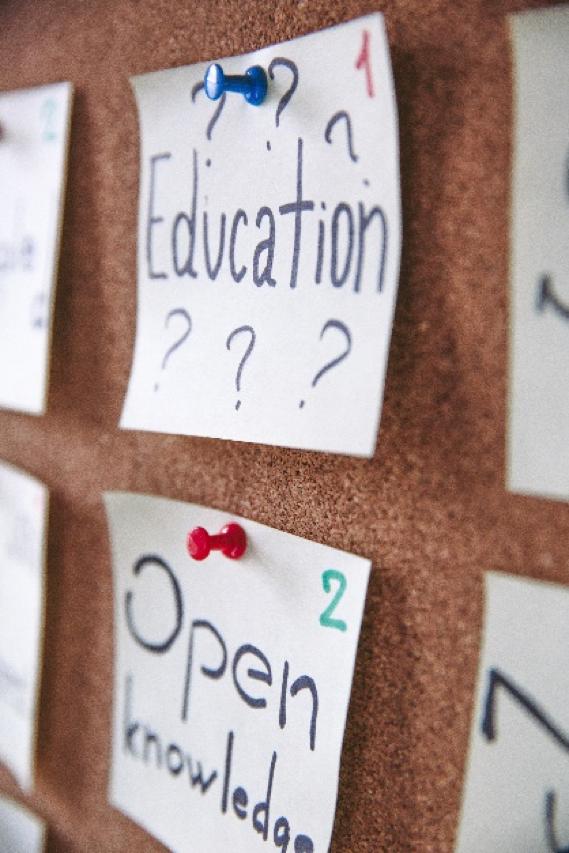
Secondly, a holistic and person-centered approach in counseling through individual action plans enables the identification of individual barriers and strengths, contributing to the overall well-being and success of young people.
Thirdly, this holistic –person centered process needs time to invest per
37
Regional Funds Online Magazine
beneficiary! Needs time to build the trust, active listening and the honest dialogue needed. Scaling up knowledge broker services to reach a larger number of youth participants can be challenging and quite demanding!
Finally, KAMs work for developing, engaging, and enlarging the list of stakeholders, thus increasing collaboration and synergies with them in activating youth! By doing so, KAMs foster a community of practice where knowledge brokers can connect, collaborate, and continually enhance their skills and knowledge. However, KAMs or any knowledge brokers should stay updated with the dynamic labor market and changing skill requirements, by ensuring that the information provided to youth participants remains relevant.
YOUTHShare’s members have become more knowledgeable on how to address potential issues and implement appropriate strategies based on the work done by our KAMs as a knowledge brokers! And this is our first step towards advocating the role of knowledge brokers in youth activation policies and initiatives!
Aimilia Markaki Greek TEC, NESC Key Account Manager YOUTHShare Project
38
Regional Funds Online Magazine
The activation of more women, young people and vulnerable groups on the labor market
In the quest for a more inclusive and equitable society, it is crucial to promote the activation of more women, youth and vulnerable groups in the labor market. Matching the aspirations and skills of these people to market opportunities, especially in the new context of the green and digital transition and the need for economic recovery. To achieve this, it is necessary to implement policies and programmes that promote equal opportunities and remove existing barriers.
Firstly, it is imperative to recognise the potential of women in the labor market. Over the years, women have displayed great capacity in a wide range of areas, yet they continue to face inequalities and obstacles that limit their full participation. It is crucial to implement equal pay policies, promote access to leadership positions and encourage work-life balance. In addition, education and training opportunities in emerging sectors, such as technology and renewable energy, should be provided to facilitate their participation in the green and digital transition.
For young people, it is essential to provide them with the necessary tools and opportunities to successfully integrate into the labor market. Education and vocational training play a key role in this process. Education systems must adapt to the demands of the labor market, fostering skills such as creativity and critical thinking. It is also important to foster the business and entrepreneurial spirit among young people, providing them with support and advice to turn their ideas into successful projects.
Meanwhile, vulnerable groups, such as people with disabilities, migrants or those living in poverty, must also have access to job opportunities appropriate to their abilities and needs, and to this end it is essential to remove the physical and social barriers that hinder their full participation in the labor market. This includes the implementation of accessibility policies
in the work environment, as well as the promotion of non-discrimination and diversity in companies.
The ecological and digital transition we are experiencing presents new job opportunities, but it also brings challenges for those who do not have the necessary skills. It is therefore essential to invest in training and retraining programmes that enable people to acquire the skills required in these new fields. This includes training in digital technologies as well as training in areas related to sustainability and energy efficiency.
It is also important to enhance collaboration between the public sector, the private sector and civil society to promote the labor activation of women, youth and vulnerable groups. The creation of strategic partnerships can facilitate access to employment opportunities, as well as the exchange of knowledge and good practices. In addition, monitoring and evaluation mechanisms need to be put in place to ensure the effectiveness of policies.
Our organization works to ensure that all these barriers are removed by helping to promote change, for example through training courses for those who need it or awareness-raising campaigns.
Jose Fernandez, AEII
YOUTHShare Project
39
Regional Funds Online Magazine
Empowering Women and Vulnerable Groups: SEPAL's Vision for a Resilient Labor Market
Supporting Employment Platform through Apprenticeship Learning (SEPAL PRO) is a project aimed at creating an innovative model for job insertion for at least 600 NEETs (Not in Education, Employment, or Training) aged 18-29. Focused on vulnerable groups such as youth with disabilities, Roma, migrants, low-skilled individuals, and school drop-outs, SEPAL operates in five European countries with strong partnerships, Bucovina Institute in Romania, KOISPE Diadromes in Greece, Fundacio Pere Closa in Spain, ZISPB in Lithuania, and KOMES in Poland, emphasizing inclusivity and support for NEET women, youth, and vulnerable groups, to thrive in the labor market.
Prior to exploring SEPAL's initiatives, it is crucial to grasp the current landscape of the labor market for women, which similarly impacts NEET women. Despite considerable progress, women continue to face many challenges, especially concerning employment and wage disparities. Actions are undertaken by The EU Parliament, which called for concrete action to reduce the gender pay gap (13% in 2020) and pension gap (29% in 2019). They also urged measures to address female poverty, given women's higher vulnerability to poverty compared to men. In December 2022, negotiators agreed on new rules requiring EU companies to disclose information for comparing salaries and revealing gender pay gaps. EU countries will enforce penalties, such as fines, for rule violations, and gender-neutral vacancy notices and job titles will be required. Formal approval by the Council is still pending for these rules to ta ke effect.
(https://www.europarl.europa.eu/news/en/headlines/priorities/social/ 20190712STO56961/the-parliament-s-fight-for-gender-equality-in-the-eu)
SEPAL’s mission goes beyond mere job insertion; we aim to activate the potential of more women, young people, and vulnerable groups on the labor market. Specifically, each SEPAL partner, in its unique approach, has made significant strides in empowering NEET women and fostering their inclusion in the job market.
Bucovina Institute, through learning partnerships and training programs, strives to provide women with the skills and confidence necessary to access meaningful employment. Their aim is to close the gender gap in the Romanian labor market and create opportunities for women to excel in the green and digital transition sectors.
KOISPE Diadromes’s commitment to empowering NEET women is reflected in their principles: empowerment, self-representation, and autonomy, which are key guidelines for people with psychosocial difficulties, and ensuring their active participation in society. They promote gender equality within their organization and among the beneficiaries, fostering a culture of inclusivity and equal opportunities for all.
In Spain, Fundacio Pere Closa is dedicated to the education and promotion of the Roma community in Catalonia, emphasizing equal access to education and opportunities for Roma women. They work diligently to break down barriers and ensure gender equality in both their organization and the projects they undertake. By preserving and promoting Romany cultural heritage, they celebrate the unique contributions of Romany women to society.
The mission of ZIPSB in Lithuania is to create innovative social initiatives, providing services to disadvantaged groups, including NEET women. They offer comprehensive career guidance, work skills training, and ongoing assistance during or after employment. By tailoring services to individual needs, they address the specific challenges faced by NEET women, ensuring their successful integration into the labor market.
Part of KOMES’ objective in Poland is to raise awareness and build civic attitudes, as they provide workshops and advisory meetings, specifically targeting NEET women's equal treatment and mental health support. They believe that empowering women in the third sector contributes to a more inclusive society and strengthens Poland's economic recovery.
40
Regional Funds Online Magazine
While the efforts of SEPAL and its partners aim to empower NEET women (among other vulnerable groups), it is essential to address the gender pay gap and the challenges faced by women in the labor market. The gender pay gap in Romania stands at approximately 5.8%, Spain at 8.6%, Greece at 6.9%, Lithuania at 9.0%, and Poland at 8.7% (https://data.oecd.org/ earnwage/gender-wage-gap.htm ). NEET women often encounter difficulties due to societal expectations, lack of support systems, and access to quality education and training, hindering their successful entry into the labor market. Even if employment rates for women have risen, they are still lagging behind those of men. Women work more part time, are paid less and often still carry out the bulk of private domestic and care responsibilities. Work is the best way to empower women economically. It is therefore necessary to increase women’s labor market participation. ( https://commission.europa.eu/strategy-and-policy/policies/justice-andfundamental-rights/gender-equality/women-labour-market-work-lifebalance/womens-situation-labour-market_en ).
SEPAL and its dedicated partners, Bucovina Institute, KOISPE Diadromes, Fundacio Pere Closa, ZISPB, and KOMES, share a common commitment to empowering NEET women. Together, they establish inclusive learning partnerships, offer specialized training programs, and provide ongoing support, all aimed at empowering women economically and bridging the gender pay gap.
In alignment with the European Year of Skills, SEPAL ensures that women's aspirations and skill sets are well-matched with opportunities in the green and digital transition sectors. This collective effort focuses on driving economic recovery and fostering a more inclusive and prosperous future for all, recognizing NEET women as key contributors to resilient societies.
Through targeted outreach programs, mentorship initiatives, and capacitybuilding workshops, SEPAL and its partners equip women with the essential skills and confidence required to access meaningful job opportunities.
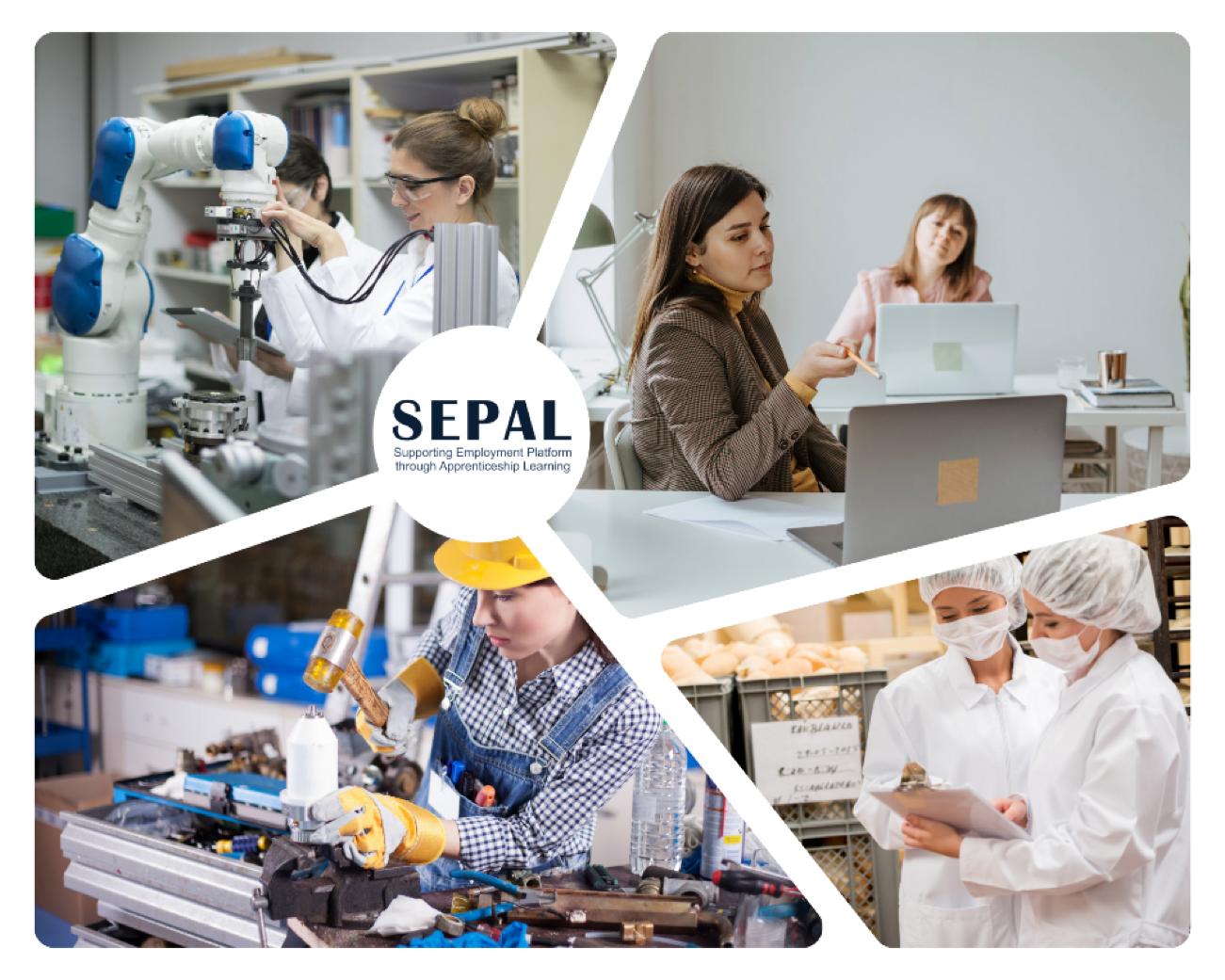
41
Regional Funds Online Magazine
SEPAL PRO Project
The Empowerment of Women, Youth, and Vulnerable Groups in the Labour Market: A Step in the right direction
This year, 2023, being the European Year of Skills, it seems only fair to dedicate this article writing about those groups who have often been excluded from the labour market; women, youth and vulnerable groups such as the Rroma community, taking this opportunity to recognise their achievements on a European level.
In recent years, there has been a notable shift towards fostering greater inclusion and diversity in the labour market. Efforts to activate and empower women, young people, and vulnerable groups have gained significant momentum, leading to positive socio-economic transformations. Although we have certainly faced several backlashes the most recent being the Covid19 crisis, we believe there has been a gradual green and digital transition towards economic recovery.
Having said this, this article explores the remarkable progress made in engaging these segments of society in the workforce and the resulting benefits for individuals, communities, and the broader economy. On the one hand, let’s talk about those who compose more than half our population yet often meet barriers when entering the labour force; women. In many parts of the world, women have historically faced numerous barriers to accessing the labour market on equal terms with men. However, a significant shift has occurred in recent years. More women are now participating in the workforce, and their representation in traditionally male-dominated industries and leadership positions is steadily increasing. This upward trajectory can be attributed to a combination of factors such as improved access to education, changing societal norms, and gendermainstreaming.
On the other hand, recognizing the immense potential of young people, efforts have been made to enhance their participation in the labour market.
Governments, educational institutions, and private organizations have implemented initiatives to equip young individuals with relevant skills and provide them with employment opportunities. Entrepreneurship programs, vocational training, and internships have played a pivotal role in enabling young people to acquire valuable experience, build networks, and contribute to economic growth.
This is precisely what we are aiming for in our project Sepal Pro shifting the mindset from the belief that young people who are not currently working or studying are “lazy”, thus victim blaming, to taking responsibility from a macro and state level. In Europe, there has most certainly been a shift towards using the term "NEET" in a more positive and proactive manner. Instead of focusing solely on the negative aspects of being disconnected from education, employment, or training, the emphasis has been placed on providing support and opportunities for young people in this situation.
Without doubt, by integrating the youth into the labour market, societies are not only unlocking their talent but also fostering innovation and longterm sustainability.
Another crucial aspect of inclusive labour market activation involves empowering vulnerable groups such as individuals with disabilities, refugees, and those from marginalized communities (such as the Rroma community). Recognizing the inherent talent and potential within these groups, governments and organizations have initiated inclusive hiring practices, tailored training programs, and workplace accommodations to facilitate their integration.
42
Regional Funds Online Magazine
Many European projects like Sepal Pro work towards eliminating discriminatory practices and offering equal opportunities. In this sense, bit by bit, societies are bridging the socio-economic divide, promoting social cohesion, and fostering a sense of belonging among these marginalized individuals.


In conclusion, the activation of more women, young people, and vulnerable groups in the labour market yields significant benefits at various levels. For individuals, increased employment opportunities lead to enhanced financial independence, improved self-esteem, and the ability to contribute to their families and communities. At the community level, a diversified workforce fosters creativity, innovation, and a broader range of perspectives, leading to better decision-making and problem-solving. From an economic standpoint, increased labour force participation translates into higher productivity, greater competitiveness, and a boost to overall GDP growth.
Therefore, let us celebrate the European Year of Skills together, spread the word and continue working towards a more inclusive society. By breaking down barriers, challenging stereotypes, and implementing supportive policies, societies are realizing the potential of previously untapped talent pools.
43
Fundacion Privada Pere Closa´s Team!
Regional Funds Online Magazine
SEPAL PRO Project
"Empowering Individuals for a Sustainable Future: Project L.I.K.E and the European Year of Skills"
In a world constantly evolving due to technological advancements and the urgency of environmental sustainability, empowering individuals with the right skills has become paramount. The European Year of Skills has emerged as a transformative initiative, dedicated to activating young people and vulnerable groups in the labor market. The alienation of aspirations and skill sets with job opportunities has become a core objective of Project L.I.K.E – “Life Investment is the Key to Employment”. The project through the one of the most common identified problems in Bulgaria – youth unemployment, seeks a new pan-European solution for achieving sustainable employment for the target group – NEETs with mental health problems. The target group – young people in the age group 15-29 years old who are not in employment, education or training (NEET) faces complex challenges such as social isolation and permanent unemployment. The multidimensional approach for long-term support will build the needed skills and confidence in the target group and thus provide a basis for building a global European solution to the problem. We are dedicated to assisting individuals in unlocking their full potential, nurturing their talents and strengths. Our primary goal is to empower them to grow, discover, and harness their unique abilities. Helping them to develop their potential, we also strive to achieve sustainable employment for the target group. With a special emphasis on activating young people, including those currently outside of education, employment, or training, the Project L.I.K.E seeks to empower voices and create an inclusive society.
When considering the project L.I.K.E - Life Investment is the Key to Employment in the context of the initiatives related to the European Year of Skills, the shared focus on activating more young people, and vulnerable groups in the labor market becomes highly relevant. The goal of both endeavors is to match individuals' aspirations and skill sets with job market opportunities, particularly within the realms of the green and digital transition and economic recovery.
L.I.K.E, with its emphasis on life investment, aligns with the objective of the European Year of Skills by recognizing that providing individuals with the necessary skills and support is crucial for their successful integration into the labor market. The core objective of Project “L.I.K.E – Life Investment is the Key to Employment” is to activate NEETS with mental health problems who possess untapped potential, equipping them with the necessary tools to thrive in the labor market. By investing in skills development and education, this initiative seeks to bridge the gap between aspirations and realities, ensuring that no one is left behind. Access to quality education, lifelong learning opportunities, and resources are key elements in nurturing talent and fostering a skilled workforce.
The project acknowledges that investing in personal growth, education, and training is a vital step toward securing sustainable employment and achieving long-term career success. This is why the Houses of Hidden Likes have been created as centers to provide a safe environment for young people. The multidimensional program applied in the Youth Houses ensures that all measures are being taken in the process of motivation, inclusion and self-realization of young people.
Moreover, the specific focus on activating more people, especially young people not currently engaged in education, employment, or training, aligns with the inclusive approach of L.I.K.E. This project recognizes the importance of breaking down barriers and providing tailored support to empower these individuals to overcome challenges and seize opportunities. By doing so, L.I.K.E contributes to the larger goal of the European Year of Skills to ensure that no one is left behind and that everyone has equal access to employment and economic participation.
In essence, L.I.K.E - Life Investment is the Key to Employment echoes the core principles of the initiatives related to the European Year of Skills. Both
44
Regional Funds Online Magazine
initiatives aim to empower individuals, match aspirations with skill sets, and create a more inclusive labor market, particularly in the context of the green and digital transition. By emphasizing the importance of personal development and investment, Project L.I.K.E is a valuable complement to the broader efforts being made to enhance skills and employment opportunities across Europe.
45
Regional Funds Online Magazine
L.I.K.E. Project
The European Year of Skills is of paramount importance in relation to the growing sector of green and digital transitions. One of the assumptions of the ERU is to increase the number of employees, mainly women, youth and people who do not develop, work or study. This assumption should be implemented in all EU countries in the form of e.g. aid programs. By implementing these projects, we approach the issue of the unfavorable situation of women, youth and people not developing on the labor market.
What is the situation of women in the labor market?
In the EU countries, the situation of women in the labor market is unfortunately unfavorable. In 2017, the employment rate for women in the EU was 62%, compared to 73% for men. In addition, Polish women have low professional activity compared to women from other EU countries. In 2020, the professional activity rate of Polish women was 67.9%, compared to 71.9% in the EU. This is influenced, among others, by the unfavorable economic situation of women in Poland and the patriarchal model of the family, the ineffective care system for children under the age of 3 and the pro-family social system delaying the return of women to the labor market.
What is the situation of young people on the labor market?
The situation of young people in the EU has also been unfavorable for many years. In 2021, people aged 15-29 had a lower employment rate than older people, and the unemployment rate in Poland was lower than the EU average.
How to improve the situation on the labor market?
We can positively influence the situation of women and young people in every country, e.g. through the implementation of assistance programs that prepare people to start or develop their own business or find employment. Young Entrepreneurs Succeed! (YES!) by definition, it supports both young entrepreneurs and people who, by improving their qualifications, have a chance to find a suitable job in the field of digital marketing. Support will be provided to both women, e.g. returning to the labor market after maternity leave, and young people looking for a job. The implementation of such programs is very important, it affects economic stability, reduces unemployment, and supports people in an unfavorable professional situation. The assumptions of the program focus on matching the participant's aspirations and skills to starting a business or improving their professional qualifications.
The alumni of the Young Entrepreneurs Succeed! project used the knowledge gained from the program and achieved success in the form of starting their own company and developing a personal brand. Importantly, the participants' businesses are often related to the ecological and digital transformation, contributing to the implementation of sustainable development goals. And in the success stories on the program's international website, mention was made of:
Magdalena Baran - is a food technologist, creates food products that have
46
The European Year of Skills initiatives will also focus on activating more women, young people and vulnerable groups in the labor market. Match people's aspirations and skill sets with labor market opportunities, especially in terms of green and digital transitions and economic recovery. Particular emphasis will be placed on activating more people in the labor market, especially women and young people, especially those not in education, employment or training.
Regional Funds Online Magazine
This is how we interpret these words in our project.
a positive effect on our health without compromising the environment during production.
Katarzyna Rećko - is a nutritionist and promoter of a plant-based diet. It affects the proper nutrition of people in harmony with the planet, Katarzyna Rećko founded the company.
Outside the YES! program there are other projects that enable, for example, comprehensive help for people in a difficult life situation. The Youth Business Poland Foundation implements the Best by Futuremakers program for refugees from Ukraine by supporting them in finding a job or setting up a business or moving it to Poland.
The issues related to the lower employment rate among women and youth in the EU and the living situation of refugees indicate the need to implement assistance programs every year. Thanks to this, we can contribute to improving the situation of the above-mentioned social groups, stabilizing the economy and economic recovery. Every year, foundations and other organizations acquire new programs that they actively implement, contributing to the improvement of the quality of life and the development of the ecological and digital transformation sector.
YES! Project
47
Regional Funds Online Magazine
Supporting young people to start businesses with a green and social mission is vital for tackling European and global challenges
Social and green enterprises are businesses that exist to tackle a social or environmental challenge. That mission is its core purpose and drives business activities. It means the more money the business generates, the greater impact it has on society or on the environment.
Successful social and green enterprises do not rely on external donations but generate their own income, meaning they can be financially sustainable, adaptable and create lasting change. Often the entrepreneurs who lead the most effective social or green enterprises come from the communities their work aims to serve, so they have a strong understanding of the problem they are tackling and are best placed to design the right solutions.
Social and green enterprises are not the only mechanism for solving the world’s big challenges, but they play a key role. Global social change is not the monopoly of governments, global charities or corporations. Small and medium sized enterprises represent about 90% of all firms and are responsible for over 50% of employment world-wide. There is a huge opportunity when we harness business for good. This includes solving existential, adaptive challenges like climate change. We need strong leaders now more than ever, and these don’t only come from the top - they are in your community. They are making change at a local level and planting seeds that shape the future.
Being a young social or green entrepreneur is hard. Like any entrepreneur, starting something from nothing presents a vast array of challenges and requires huge resilience. Being driven by an impact mission adds even greater complexity: decision making is not driven solely by what leads to profit but what helps society. Sometimes these two goals can even be in conflict.
Support for young entrepreneurs is vital. Support available - whether financial, capacity building, mentoring, platforming and so on - depends on the ecosystem entrepreneurs are part of. Some are more advanced than others. A young social entrepreneur in Germany has more access to funding opportunities than one in Armenia. What’s more, often funding decisions favour those able to articulate what they do well over the substance of the work. We know there is great talent deserving of support, and there is funding on offer. We need to better connect the two. As an organisation with a global reach and network of diverse social and green entrepreneurs, Youth Business International (YBI) aims to make a difference. It's about harnessing all that good, that skill, resilience and contextual knowledge, and bringing people together to make a bigger impact. Connecting social entrepreneurs across Europe and around the world so they can learn from, support and be inspired by one another. We have recently developed the second iteration of YBI’s Social & Green Toolkit, which provides practical tools and guidance to help entrepreneur support organisations take their entrepreneurs through the journey of how to build an effective social or green enterprise. This has been designed to work in diverse contexts and is being piloted this year with over 400 underserved young entrepreneurs around the world. We know that to create a bigger impact we need to be outward facing and collaborate with likeminded organisations outside the YBI membership. We will work to help join up the ecosystem in Europe and worldwide so we’re not working in silos but learning how one thing connects to another and facilitating those connections.
We’re early on and there’s a long way to go but this is an invitation for collaboration with Enterprise Support Organisations across Europe and the world.
YES! Project
48
Regional Funds Online Magazine
Portugal: Inclusion remains a mirage for people with disabilities
In Portugal, people with disabilities continue to face challenges in accessing education, employment, and culture. More than 30% of this population is at risk of poverty or social exclusion. It is still necessary to break physical and cultural barriers to end ableism. The discrimination experienced by people with disabilities is a reality that they encounter daily and throughout their lives. Beyond physical barriers, the cultural obstacles make their lives more difficult.
According to the Disability and Human Rights Observatory (Institute of Social and Political Sciences of the University of Lisbon), the risk of poverty or social exclusion rate was, in 2021, 30.5% in households with people with disabilities, almost double than in households of the general population (18.8%).
Unfortunately, according to colleagues from Consultis, the characterization of the living conditions of people with disabilities are hindered, due to the lack of data regarding this part of the population. The results of the 2021 Census do not allow a rigorous analysis of the population with disabilities in the country.
According to the mentioned source, Statistics Portugal (INE) considers all types of disability (visual, hearing, motor or cognitive) in the same way and in all degrees, from an elderly person with difficulty climbing stairs to a person with disabilities. In addition to hindering the characterization of the living conditions of this part of the population, the Census does not allow to know how many people with disabilities really exist in Portugal. It is difficult to explain how in 2011 INE identified more than 1.7 million people with disabilities, a number that dropped to just over 1 million in the 2021 Census.
Since the
1st of February, companies with more than 100 workers required to integrate people with disabilities
The data gathered by the Disability and Human Rights Observatory show that, in 2020, only 0.59% of the workers of companies with more than ten employees were people with disabilities (55% were women and 45% men). In 2021, almost 20,400 people with disabilities worked in the public sector, 6.500 more than in the private sector. In this context, our colleagues from Consultis consider the extension of the quota system for the employment of people with disabilities in the private sector to be fully justified.
According to the mentioned source, the transition period for companies with more than 100 employees ended at the 31st of January 2023. Now, these companies must employ people with disabilities of 60% or more, in conformity with Law no. 4/2019, which became fully effective on the 1st of February 2023. Otherwise, they will face a fine of about 10 thousand euros. Our colleagues point out that, last year, more than 13,500 people with disabilities were enrolled in the public employment centers.
“Nowadays, many companies are interested in hiring people with disabilities, but they may not know how to comply with the law that requires them to do so. They may have trouble finding suitable candidates or understanding the legal requirements. The law wants to help people with disabilities who can work in their chosen field with or without some adjustments or aids in their workplace. That is why the LEAD project and similar initiatives and efforts are important. They connect people with disabilities and employers directly”, emphasized António Silva Dias, LEAD project manager from Consultis – Consultoria Empresarial, Unipessoal Lda., the Portuguese partner. Our colleague presents two successful initiatives in the field of inclusion of people with disabilities.
49
Regional Funds Online Magazine
Coimbra: Café Koala promotes integration of young adults with Down syndrome on the labour market
Café Koala is an initiative of the Association for the Support of the Inclusion of Citizens with Down Syndrome in Coimbra (Olhar 21), Association which aims to address the challenges that young people with Down syndrome encounter when they seek employment after finishing their education. In this inclusive cafe, six young people with Down syndrome, aged 16 to 20, are part of the staff. The young staff members acquire skills in preparing coffees, toasting sandwiches, and cooking soups in the Pedagogical Kitchen, an activity offered by Olhar 21. In the Café, they work in shifts, three hours a day. The young adults practice both kitchen tasks, and table service, which enhances their prospects of integration into the labour market.
The "Accessible Vote" project for people with disabilities in Portugal, awarded by the United Nations
The "Accessible vote", a project of the Federation of Portuguese Cerebral Palsy Associations (FAPPC), won one of The Zero Project awards, granted by the United Nations (UN), during a ceremony in Vienna (Austria). The Zero Project is a United Nations initiative that recognizes innovative and inclusive solutions for vulnerable or disadvantaged groups. The project team developed a software that allows anyone, with any type of disability or limitation (visual, hearing and/or physical), to vote in person, autonomously and secretly. The software does not use the Internet and is easy to replicate.
The software has been formally tested in Portugal by FAPPC members, which have presented evidence and evaluations of the use of this solution. The aforementioned Federation states that the implementation of this technological solution constitutes an important investment, which will subsequently save public money.
FAPPC argues that this solution is more democratic, civic and economical than electronic voting and that it should be adopted in Portugal. The project complies with the United Nations Convention on the Rights of Persons with Disabilities (Article 29, Point 1, and Paragraph 2) and with the
Portuguese Constitution (Article 10), which guarantee the right to a secret vote for all persons. Portuguese legislation also provides for accompanied voting, but according to the FAPPC, this option restricts and limits the rights of some citizens.
LEAD Project
50
Regional Funds Online Magazine
Cosmin, technician in an authorized protected unit
Cosmin is a 28-year-old young man from Constanța, diagnosed with schizophrenia 10 years ago. Despite his illness, Cosmin managed to graduate from the Faculty of Engineering in the aforementioned city and to complete a master's degree in the same field.
After finishing his studies, Cosmin has tried to get a job. He went to interviews, but without success, so his psychiatrist recommended him to contact the HAO team.
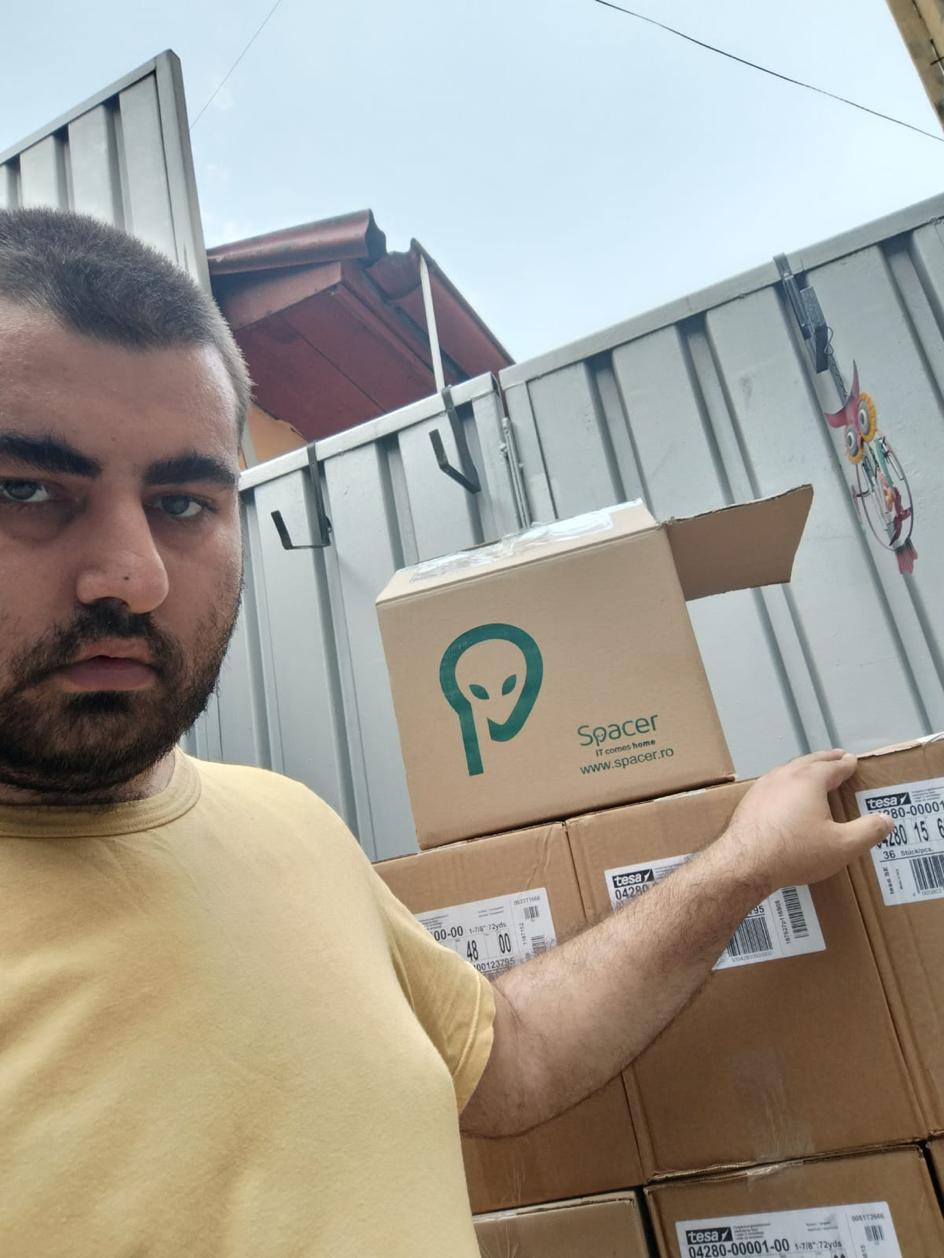
Now, Cosmin assembles computers and he gets involved in other activities, at the request of the coordinator. His integration’s process was quite difficult, but our colleague did not give up.
In order to monitor his progress, Olivia has collaborated with Cosmin's mother, because she is the only person with whom the young man is willing to discuss sensitive issues. "Fortunately, Ms. T. understood the importance of teamwork, and she was willing to consider my suggestions," explains Olivia.
Things were not simple in the relationship with the administrator of the unit either. He has experience in working with people with disabilities, but he is quite unwilling to collaborate with the HAO team in implementing the Supported Employment model. "He want to continue to employ people with disabilities, but it is still difficult for him to understand the advantages of the employment process implemented by HAO. However, I believe that things will change, as time went on", says Olivia.
Olivia, labour market expert, created the vocational profile of Cosmin. She observed that the young man is quiet, suspicious, lacking in selfconfidence and motivation, and he has a quite rigid thinking.
Our colleague noted that Cosmin wanted to work, preferably in a technical field, so Olivia began the process of identifying a job according to the training and interests of the young man. She recommended him to the administrator of an authorized protected unit. After the interview, Cosmin was hired as a technician. "At that time, Cosmin did not have a disability certificate, and this document was needed in order to be hired, because the employer was an authorized protected unit. It was very difficult for me to get both him and the family to agree to obtain it. This process took 6 months, but I succeeded!", says Olivia.
Olivia continues to work with Cosmin in order to develop his confidence and ability to socialize and integrate into a group, during individually counseling sessions, and personal development workshops, facilitated by her within LEAD project.
LEAD Project
51
Cristina Serbanescu
Regional Funds Online Magazine
Robert, worker in a carpentry workshop
Robert is a 17-year-old young man, who graduated secondary school and lives in a village, located at 30 km from Constanța. The young man called Olivia, labour market expert at HAO, following a recruitment announcement posted by our team on an online platform.
Olivia talked to the young man, in order to create his vocational profile. Our colleague noted the young man's technical skills. Although Robert is very young, he has experience as a day laborer in agriculture and construction. He also works in the household, including taking care of the animals and doing various repairs.
punctual. In addition, he is serious, eager to learn new things every day and to be helpful in the workshop.
When she met Robert, our colleague noticed that he had low self-esteem, especially due to his lack of education, so she encouraged and supported the young man to continue his studies. Thus, from autumn, Robert will attend the evening classes of a technological high school, specializing in carpentry.
The employer is very pleased with the work done by the young man and his progress. On the other hand, Robert is very happy, because he has a good salary (significantly higher than the minimum wage). In addition, he is already making plans to rent a flat in Constanța.
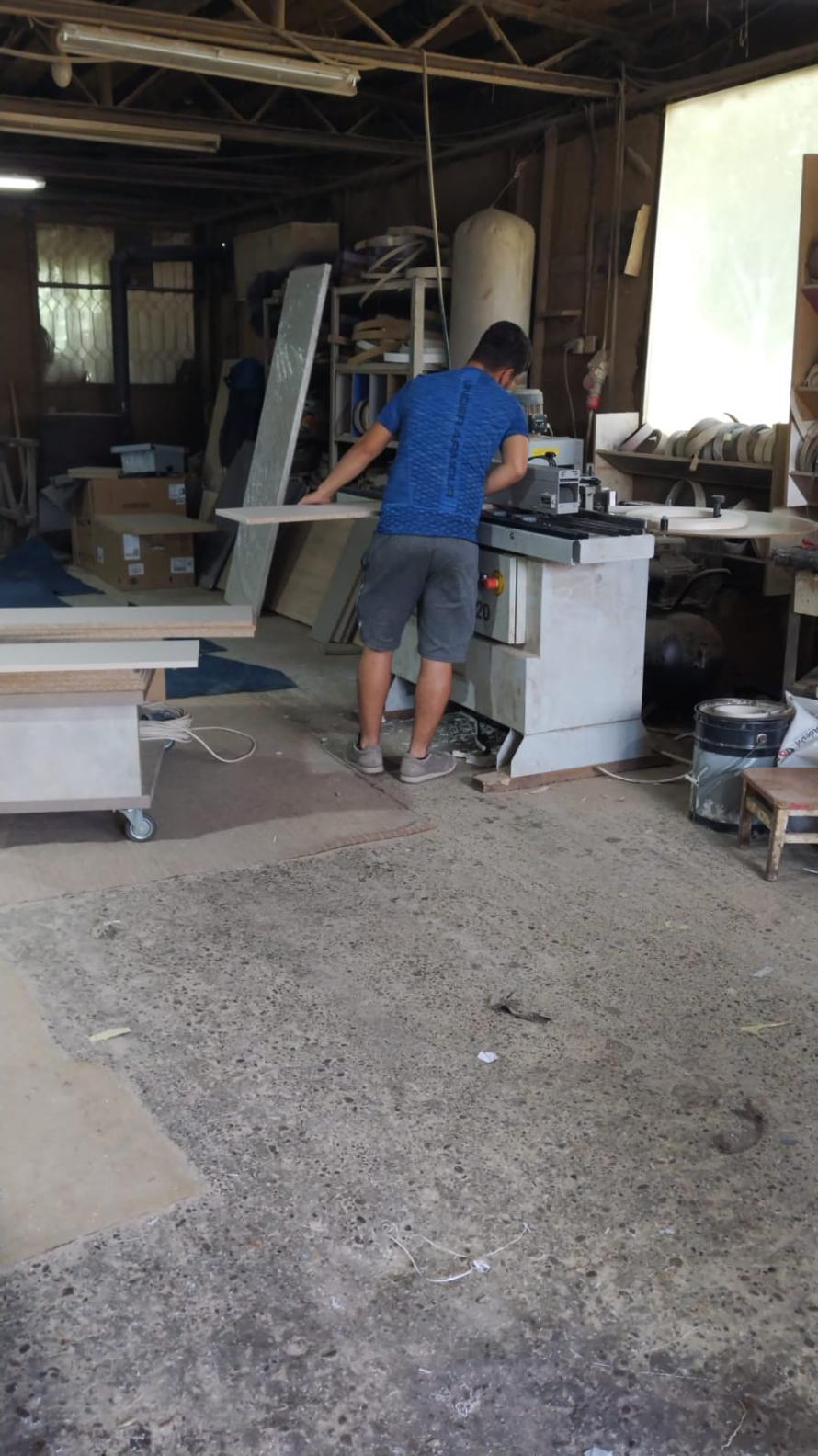 Cristina Serbanescu
Cristina Serbanescu
LEAD Project
Considering these elements, Olivia proposed to Robert to go to an interview with the owner of one of the oldest and the best-known carpentry workshop from Constanța. The entrepreneur was looking to hire unexperienced young people, in order to qualify them in the workplace. After three weeks, Mr. P. employed Robert part time.
Olivia has monitored Robert and she has kept in touch with the employer. Although he lives 30 km away from Constanta, the young man is very
52
Regional Funds Online Magazine
Ionu
, green spaces caretaker
Ionuț is a 25-year-old man, diagnosed with mild mental retardation. He grew up in a village, in Constanta county, and he used to help his grandparents at the chore from a young age. Unfortunately, he left school without completing even the primary cycle of education. Although Ionut lives alongside his grandparents, the young man has a good relationship with both his mother and his stepfather.
The young man really wanted to work. He tried to get a job, but without success. Ionut worked for a daily wage in agriculture and construction, but he has not given up on his dream of having an employment contract. Considering Ionut's desire, his stepfather decided to look for a job on internet for him. He found out about the Supported Employment services offered by HAO within the LEAD project and he called our colleagues from Constanța. Later, Ionuț and his stepfather came to the Center for a first meeting.
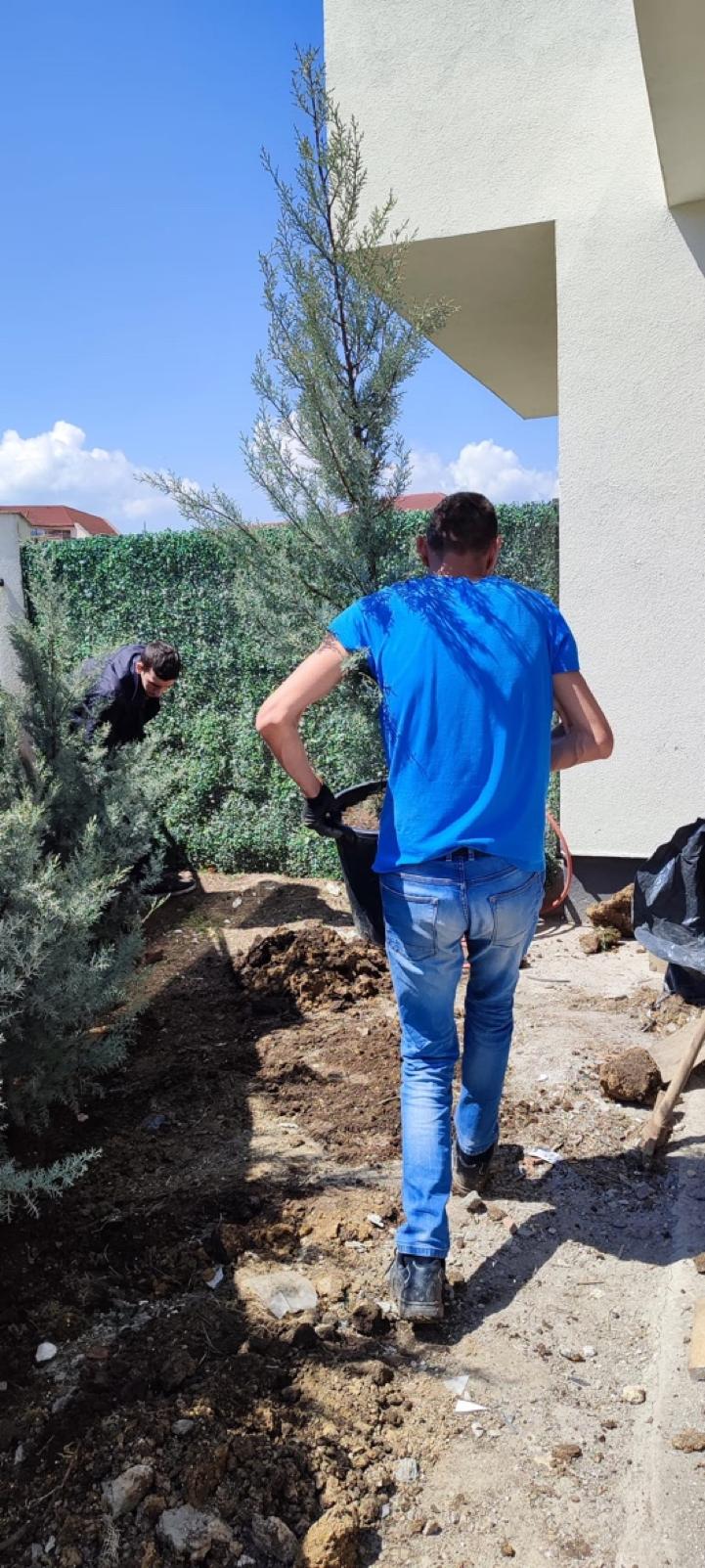
"Ionuț deeply impressed me! He is a sensible, calm, and he displays good manners. Ionuț has high emotional and social intelligence; he easily communicates with others, and he without effort adjusts to different circumstances" says Olivia. "I found out that he likes to spend time in nature and to work the land. Thus, in March, I invited him to participate in an experience exchange alongside representatives of Belial Group (a company specializing in greenspaces maintenance activities). At that moment, they were looking for people interested in working in the field", Olivia explains.
The young man made a good impression, so the company’s administrator hired him in April. Olivia has maintained contact with both the company's representatives and the young man. According to Olivia, significant intervention in working relations was not necessary.
Now, Ionuț is highly appreciated by both his supervisor and his colleagues. The young man is punctual, serious and conscientious at work. He respects the schedule, he correctly fulfills his assigned tasks, and he likes to be helpful to others. At the beginning, there were some communication's difficulties, but the supervisor has learned how to explain him what he has to do, so that Ionuț understands correctly.
The young man is very happy because he likes what he does and he feels useful.
Cristina Serbanescu
LEAD Project
53
Regional Funds Online Magazine
ț
The wide spread of the Supported Employment model –solution for the integration of people with disabilities on the labour market
More than other social categories, young adults with disabilities still face difficulties every day in accesing education services and subsequently in finding a paid job, so their quality of life remains low. Many young adults have a low qualification, inadequate education which does not meet labour market requirements, poor financial situation, lack of confidence in their strength and in their peers. Moreover, the institutional support is insufficient or non-existent. Even when they do find a job on their own, they often are not treated properly, because of employer’s ignorance. On the other hand, companies still hesitate to integrate people with disabilities, due to stereotyping, and misperceptions.
Both we and our partners have been working with people with disabilities for many years and we know that they can be a reservoir of skills and talent, who could bring added value to the employer, but they need a chance to prove it! I am happy to say that since 2018, young adults with disabilities in Romania, Lithuania and Portugal have had this opportunity because of the Labour market Employment for young Adults with a Disability - LEAD project, funded by Iceland, Liechtenstein and Norway through the EEA and Norway Grants Fund for Youth Employment.
We started from the idea that this project must contribute to the changing of the paradigm regardind integration of young adults with disabilities on the labour market and into society. In this respect, we have introduced in our countries a good practice model regarding the Supported Employment of people with disabilities which has proven its viability in the United Kingdom. During this process, we have benefited from the support and experience of the Status Employment, the LEAD Expert Partner. Health Action Overseas Foundation alongside Valakupiai Rehabilitation Centre (Lithuania) and Consultis – Consultoria Empresarial, Unipessoal Lda. (Portugal) have addressed not only young adults with disabilities, but also
parents and legal guardians of young adults with disabilities, companies, and providers of employment services, and we have approached in an innovative way the relationship between these categories of beneficiaries. Supported Employment differs from ordinary models of placement. We give time and attention to identify the skills and professional objectives of the young adults, then we prepare them for a job according to their professional training and interests, we help them develop their working skills, attitudes, behaviors and functional abilities to achieve their goals regarding employment. During this process, specialists in psychology, education sciences, socio-psycho-pedagogy and other related fields, which work in the Services Centers for Supported Employment opened by us, within the LEAD project, have provided assistance and counseling to our young beneficiaries.
After their employment, we monitor and provide in work and outside work support.
In addition to the individual counseling provided, our team regularly organise personal development workshops and group counseling sessions with the aim of increasing their self-control, overcoming emotional blockages, and developing communication and teamwork skills of the participants. For this purpose, our colleagues use tools such as roleplaying games, drawing, modeling, and therapeutic stories. Morover, the beneficiaries are constantly involved in volunteering activities.
Another important direction in our work consists in providing informational and emotional support to parents and family members of young adults with disabilities.
54
Regional Funds Online Magazine
In this respect, they benefited by a dedicated training package, which includes: practical information designed to help parents in order to support their children in accessing employment services; practical ways to motivate their children to get and keep a job; strategies for an individual approach in addressing the needs / the desires of young adults with disabilities and developing their teamwork, decision-making and conflict resolution skills. In addition, we regularly organise meetings with members of the support group for families of young adults with disabilities.
Our team has succeeded countless times in overcoming the reluctance of business people to hire people with disabilities. How do we do that? We organise experience exchanges in order to encourage dialogue and to facilitate interactions between the young adults looking for a job and potential employers. I am glad to say that most of the time, these events ended with the employment of one or more young adults.
I am pleased to inform you that in these years, we have employed hundreds of young adults with various disabilities (hearing, visual, speech, physical impairments, learning/intellectual, and mental disabilities). These young adults have managed to keep their jobs, and even to continue their studies or to advance in their carriers. Moreover, our beneficiaries were accepted in companies whose representatives have initially rejected the idea of having colleagues on a diverse spectrum.
It is a matter of pride for us that most of the entrepreneurs, which have worked with us, have not stopped at hiring just a single young adult with disabilities. We have companies in the portfolio, which have employed 3-4 young adults and they are still working with our specialists. In our opinion, the wide spread of the Supported Employment model is needed, in order to improve the integration of people with disabilities, as well as those of other vulnerable groups on the labour market and into the society. Why? Because it is a win-win model, based on a partnership strategy (between the employee, the employer, and the employment service provider), and which it has successfully passed the test of time.
and the sustainability of the employment process of the young adults with disabilities and strong relationships built by our team with employers. It is time to offer as many people with disabilities as possible the chance to have access to this service.
Let's do it together!
Nicolae Dobrescu, Project Manager - LEAD Executive Director of Health Action Overseas Foundation LEAD Project
We have obtained remarkable results, not only in terms of assumed indicators, which are exceeded, but also especially in terms of the quality
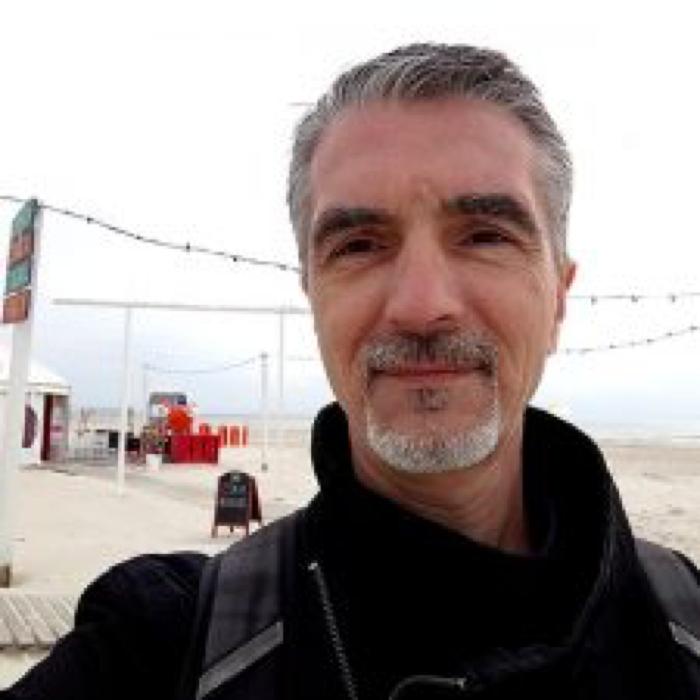
55
Regional Funds Online Magazine
Experience exchanges between employers and young adults from vulnerable groups
The young participants had the opportunity to introduce themselves and to talk about the reasons for attending the meeting, their previous work experiences, and their professional expectations.
Our beneficiaries made a good impression, so Camelia Beli offered them a trial period, in order to give them the chance to evaluate if they like the job and it is suitable for them.
On the 8th of May, four beneficiaries of LEAD project, alongside two relatives, participated in experience exchange with Alexandru Sava, regional manager of Spartan Restaurant, one of the largest fast-food restaurant chains in Romania.
Between March and May, Health Action Overseas Foundation (HAO) has continued the series of experience exchanges between young adults from vulnerable groups looking for a job and potential employers.
Thus, on the 30 of March, four beneficiaries of LEAD project, interested in working in gardening, had the opportunity to meet with Olimpia Beli, administrator of Belian Group SRL (company specialised in landscaping), at the headquarters of the Services Center for Supported Employment from Constanța
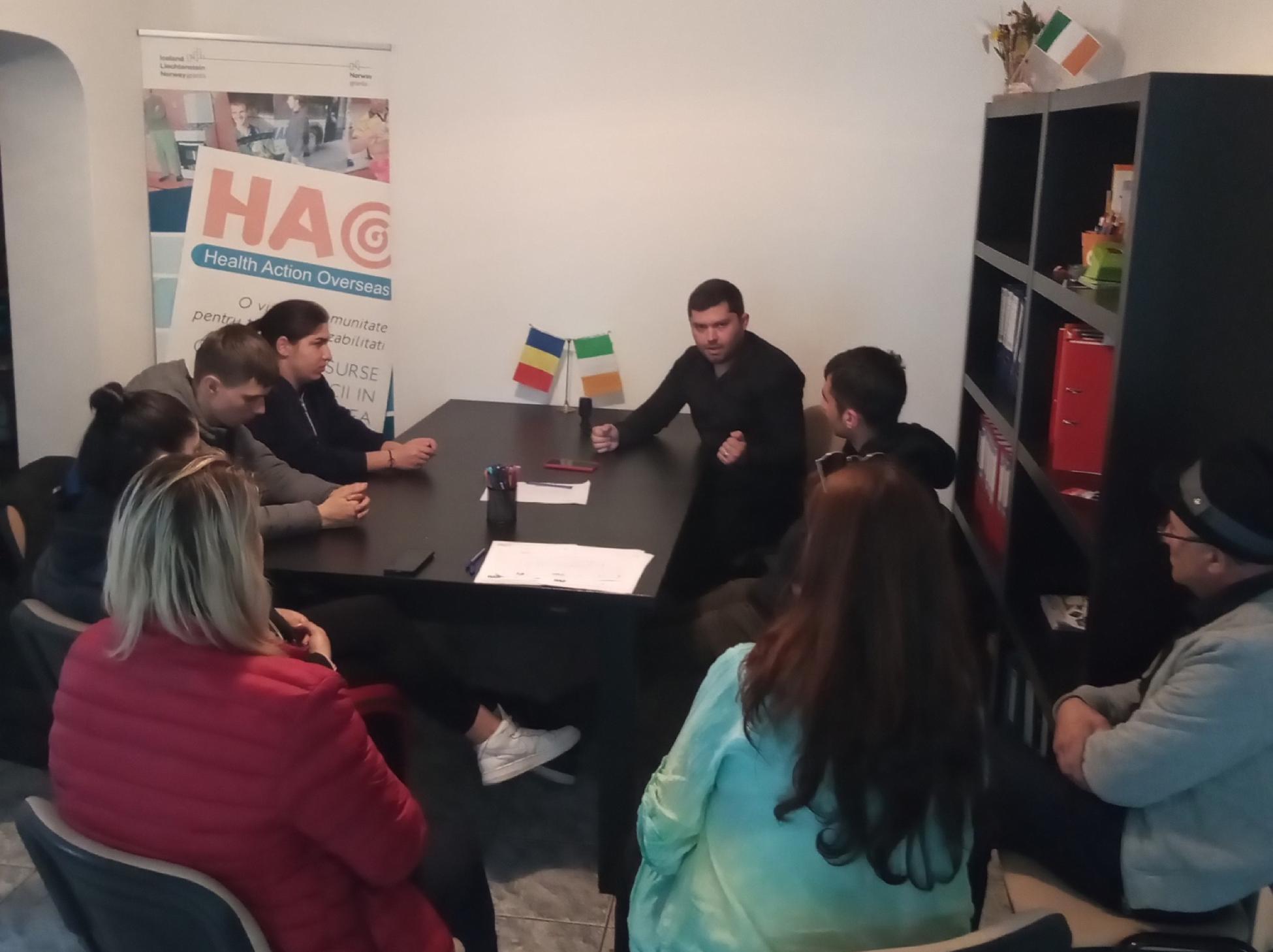
The representative of the company talked to them about: the duties of a caretaker of green spaces, the work schedule, the seasonal nature of the activity (from March to November), the employment contract, the salary package, as well as about the tools and equipment used by employees. At the same time, she provided information about the company's clients.
Our guest gave details about: kitchen worker profession and its challenges, the tasks that need to be performed, the utensils used by staff, and the protective equipment worn by employees. He also talked about: the work schedule, the salary package and the bonuses granted. In the second part of the meeting, the company’s representative answered of the participants’ questions. Alexandru Sava emphasized the openness of the Spartan’s management to hire pupils who want to work during the summer. In this respect, the regional manager pointed out the employer offer flexible working hours and the possibility of choosing a restaurant near their house.
Following this meeting, one of the four young adults, with culinary skills, was hired. In addition, Alexandru Sava offered to another beneficiary, a young man with mild mental retardation, a trial period in order to evaluate if this job is suitable for him.
Cristina Serbanescu LEAD Project
56
Regional Funds Online Magazine
Supported employment, safety net for young adults from vulnerable groups
Why did you make the decision to integrate people from vulnerable groups, including young adults with disabilities, into your team?
Indeed, we works with people from vulnerable groups in order to give them the chance to integrate on the labour market, and to have an independent life. Spartan Restaurant – one of the largest fast-food restaurant chains in Romania – offers them a friendly work environment. For example, we had an employee diagnosed with hearing impairment, who accomplished the requirements of her job well, and enjoyed harmonious relationships with her colleagues.
When did you start to collaborate with our team?
We have been working together since April, when the manager of one of our restaurants from Brăila employed a young beneficiary of LEAD project. I coordinate activity in Brăila, Constanța și Bacău, so I found out from my colleague about opportunities offered employers by HAO. We lacked staff in Constanta, so I called Olivia because I wanted to hire suitable people. Your colleague visited us, at our headquarters, and gave me valuable information regarding the Supported Employment process. I thought it is an interesting win-win approach, and we decided to work together.
How did you collaborate with our team?
Olivia understood what kind of employees we were looking for, so she recommended us a few beneficiaries. Then, we organised interviews. Subsequently we decided to hire four young adults.
What do you think about the Supported Employment process?
This employment process offers advantages to both the employer and the young adult, so the wide spread of the Supported Employment model is
needed. Our workers are more efficient, because of the support provided and monitoring carried out by HAO specialists. Moreover, Olivia has worked with my colleagues in order to help them communicate constructively with new employees, and in order to identify the problems that could appear during the integration process, and to solve them. These were important steps in order to establish a long-term collaboration. Many young people from vulnerable groups have faced abuse, and traumas, and they do not trust themselves and their peers. The assistance provided by the HAO team during entire employment process helps the young beneficiaries easier integrate into a team. Because of you, they can understand and accept that there are workplaces where people feel valued. The Supported Employment process is a safety net for NEETs.
How did your colleagues receive them?
We are a responsible employer; we offer safe workplaces. The newcomer are like any other employee of the company. We take care to their needs, so that they feel comfortable at work, but we do not make any kind of difference between them and other members of our team.
Do you recommend to other entrepreneurs the Supported Employment model? Why?
We wholeheartedly recommend to other employers, regardless of their activity field, to integrate young adults in this way. Business community are need these kind of projects, which support entrepreneurs to hire suitable people, who want to work. I think that this employment model contributes to the improvement of employees' retention, which it is an important aspect for employers.
Thank you! We wish you good luck in business!
Cristina Serbanescu LEAD Project
57
Interview with Alexandru SAVA, regional manager, Spartan Restaurant
Regional Funds Online Magazine
The Regional Cooperation – the determining factor for the success of the transfer of good practices
In the last years, important steps have been taken to stimulate the integration on the labour market of people with disabilities and, nevertheless, in many European countries the employment opportunities of this social category are much lower compared to the rest of the population. For example, in Romania there are about 850,000 people with disabilities, but less than 8% of adults with disability work.
The low number of supported services for young adults with disabilities and the quality of these services are important causes, which maintain a low employment rate among them. The situation is not much different in Lithuania and Portugal (countries where our project partners, Valakupiai Rehabilitation Center (VRC) and Consultis – Consultoria Empresarial, Unipessoal Lda.
What have we done? We have introduced in our countries a good practice model regarding the Supported Employment, which has proven its viability in the United Kingdom. While doing so, we have benefited from the support and experience of the Status Employment team, the LEAD Expert Partner. The model of Supported Employment was created in the USA in the 1970s. It was imported into Europe, initially in the United Kingdom, and then it has successfully expanded in other countries. I chose Supported Employment because this model is based on a win-win strategy: people with disabilities have the chance to get suitable jobs and keep them for the long term, and companies have the opportunity to hire dedicated and valuable workers.
Our Expert Partner provided an action plan (methodology, and quality standards included) to our teams from Romania, Lithuania and Portugal, and our collegues have been complying with it. In addition, HAO, VRC and Consultis teams have gained valuable information while constantly participating in consulting and training sessions offered by Robert Elston,
Executive Director of Status Employment, at the headquarters of our organisations or online.
This manner of working has allowed us to initiate our own training activities. Our efforts have been recognised at national and international level. For example, HAO Romania, with the support of Status Employment, has been accepted as an Associate Member of the European Union of Supported Employment (EUSE). The Expert Partner has also worked with Consultis in maintaining connection with the Portuguese Supported Employment Agency (APEA), in order to bring on their skills and further improve the quality of Supported Employment in Portugal. Moreover, Robert Elston has worked with our colleagues from Lithuania in order to spread Supported Employment services.
The integration of young adults with disabilities into the labour market is a complex process in which, alongside the providers of employment services, other stakeholders, including decision makers, have to participate through services and programs tailored to their specifics. That is why in our project, each beneficiary partner established in its country a National Network of Supported Employment service providers (LEADNET).
During these years, the Networks have continued to expand, thus facilitating the implementation of the Supported Employment methodology in as many regions from our countries. Additionally, the exchange of information between professionals in the field has intensified; they sought and found answers to the challenges of the moment and solutions to actual professional problems. At the same time, the quality and efficiency of the services provided have increased due to the promotion of quality standards and good practice models, within the Networks. Furthermore, through the Resources Centers for Supported Employment, we provide materials (for example, good practice guides) to supported employment
58
Regional Funds Online Magazine
specialists and employers/human resources specialists, in order to help them in their daily work.
Our team has paid special attention to the development of the publicprivate partnership as a fundamental strategic element for spread the application of the Supported Employment process. We have also organised forums and round tables with the ambitious goal of influencing (with arguments, data and facts) the public policies especially in the field of inclusion of young adults with disabilities in the labour market. Moreover, we alongside representatives of the business community have developed strategies, which facilitate the inclusion of this social category on the labour market.
In our opinion, the widespread of the Supported Employment will change mentalities, and misperceptions regarding the integration of young adults with disabilities on the labour market and into society. Experience shows that the Supported Employment model works regardless of the company’s size, the field of activity, or the disability of the beneficiary who we want to integrate. Only three elements matter: the young adult's desire to work, the openness and availability of the employer, and the quality of the services offered by specialists.
After almost five years since the start of the LEAD project, both our partners and we appreciate that the transfer of good practices is the most effective solution for a sustainable integration of young adults with disabilities in the labour market.
Because of the regional cooperation opportunities offered by the EEA and Norway Grants Fund for Youth Employment, the implementation of the Supported Employment model in our countries was made easier, faster and with better results than if each of us had implemented independently, with our own resources. In addition, we had the opportunity to learn from the experience of our colleagues, to identify possibilities for new partnerships in order to develop new projects that respond to real needs of people with disabilities.
Nicolae Dobrescu, Project Manager - LEAD Executive Director of Health Action Overseas Foundation LEAD Project
59
Regional Funds Online Magazine
Digital Natives and Digital Citizens
The Digital and green transition has undoubtedly transformed the labour market, bringing challenges and opportunities for workers. As industries and economies evolve, a growing demand for new skills aligns with this changing environment. The European Year of Skills was launched to enhance competitiveness and invest in education and skills development in response to this need. The main focus is to ensure that workers acquire the skills required in the labour market, particularly in digital skills. One of the critical aspects of the European Year of Skills is to support young people in actively participating in educational programmes. Emphasising education is crucial for young individuals to bridge the gap between their current skills and the evolving demands of the labour market.
In today's digital age, specific skills are essential for individuals in most industries. Basic digital literacy, including fundamental computer skills and proficiency in software applications, is an absolute requirement. In the 21st century, individuals need to possess the skills to navigate emerging technologies and social media platforms adeptly. This includes blending fundamental knowledge with problem-solving abilities, efficiently handling cloud computing and data storage, and embracing digital citizenship responsibilities. A valuable digital citizen collaborates, interacts, and adds value to the collective intelligence of the online community by fostering positive and non-toxic content and interactions.
In 2001, Prensky 1 introduced the concept of "digital natives," which is used to describe the generation that has grown up surrounded by digital (or information) technologies in their everyday lives (typically individuals born after 1980). The second group is called "digital immigrants,"
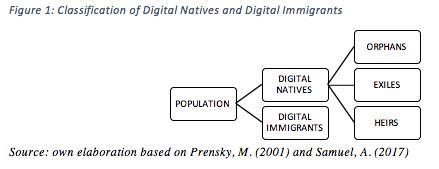
representing the generation born before the widespread adoption of digital technologies. They were not surrounded by them from childhood but encountered them later in life. Digital natives, in contrast to digital immigrants, generally excel in working and interacting with digital technologies, quickly absorb information, manage to multitask, prefer graphical representation of information over text, and perform best when connected to the internet. The proportion of the overall indicator of advanced digital skills exceeds 80% among young people (digital natives) and 60% among the older population (digital immigrants). Moreover, there is a massive gap in the level of digital skills among EU member states (e.g., Netherlands (78%) and Romania (22%).
In 2017, Alexandra Samuel 2 expanded this theory to include additional types of "digital natives," distinguishing between orphans, exiles, and heirs. Digital orphans need more guidance despite abundant tech access. Raised by parents who provide unlimited technology access, these individuals receive little conversation about the significance of their digital experiences.
1 Prensky, M. (2001). “Digital Natives, Digital Immigrants”. In On the Horizon, October 2001, 9 (5). Lincoln: NCB University Press.
2 Samuel, A. (2017) Opinion: Forget ‘digital natives.’ here’s how kids are really using the internet, ideas.ted.com. Available at: https://ideas.ted.com/opinion-forget-digital-nativesheres-how-kids-are-really-using-the-internet/ (Accessed: 04 June 2023).
60
Regional Funds Online Magazine
Digital exiles have minimal tech exposure due to their parents' intent to delay their digital entry until their teenage years. This approach aims to ensure the children respect parental advice. Consequently, some exiles may fervently immerse themselves in online activities, facing challenges in maintaining a balanced relationship with technology. In contrast, digital heirs possess impressive tech skills due to their parents' and teachers' support and guidance. These adult mentors actively promote responsible internet usage by enrolling them in classes and engaging in meaningful conversations. It is evident, then, that the level of digital skills will also vary across the generation of young people today.
For this reason, the Digital Education Action Plan (2021-2027) represents a renewed policy initiative by the European Union (EU) that outlines a shared vision for achieving high-quality, inclusive, and easily accessible digital education across Europe. Its primary objective is to facilitate the adaptation of education and training systems in EU Member States to meet the demands of the digital era.
In today's rapidly advancing digital landscape, developing digital skills is paramount for individuals of all ages. However, young people, as digital natives, hold a distinct advantage over older generations in this domain. Growing up surrounded by technology, they possess a natural familiarity and comfort with digital tools and platforms. This advantage enables them to adapt quickly to new technologies, acquire digital skills more effortlessly, and leverage these skills to thrive in various aspects of life, including education, employment, and social interaction. Bridging the digital skills gap between generations is crucial to ensure equitable access to opportunities and empower individuals of all ages in our increasingly digital world.
by Martina Kubíková, IREAS Institute for Structural Policy, Lost Millennials project
Lost Millennials Project
61
Regional Funds Online Magazine
Unlocking Opportunities for NEETs: Nurturing Digital Skills for the Future
The digital and green transitions sweeping across the labour market have ushered in challenges and opportunities, shaping the new skills landscape and transforming the job requirements for now and the future. The European Year of Skills has emerged as a catalyst to enhance competitiveness and investment in training and upskilling opportunities. This article explores the importance of digital skills in this era. It sheds light on young people's participation in training, especially those classified as "Not in Employment, Education, or Training", or NEETs.
Participation of NEETs in Training Initiatives
The participation of NEETs in training initiatives is crucial to address the risks associated with disengagement from education and the labour market. In the European Union (EU), efforts are being made to ensure a smooth transition from education to work and reduce the NEET rate. The leading age group of focus in this context is young adults aged 15 to 29. The EU has set a target for this age group, aiming to have a share of NEETs below 9% by 2030. However, as of 2021, the average NEET rate in the EU stands at 13.1%, indicating that there is still progress to be made.
While some Member States have already reached the 2030 target, variations exist between countries. These statistics emphasize the need for increased participation of NEETs in training initiatives, which can provide them with the necessary skills and opportunities to enhance their employability and integration into the labour market.

By investing in targeted training programs and support measures, policymakers can contribute to reducing the NEET rate and ensuring a brighter future for young adults in the EU.
The Fundamental Digital Skills for the Twin Transition
In the current era marked by the simultaneous digital and green transformations in the labour market, digital skills acquisition is critical to increasing the NEETs' employability and job prospects. Within this context, a range of digital skills emerges as particularly valuable.
Basic digital literacy skills: They are much needed in the digital workplace, and they include, among others, the proficient use of digital tools, e ff ective communication in online environments, and even knowledge of using common software applications.
Coding and programming skills : The rapidly ongoing digital transformation has also exacerbated the need for websites, mobile applications, or software solutions. Therefore, knowing how to code, at least for the moment, is one of the highly sought-after skills to learn in the digital era.
Data analytics and interpretation skills: Digital transformation have dramatically increased the amount of data companies have. Consequently, having individuals with the skills to analyze and translate this data into actionable plans can be a powerful asset for businesses seeking to make
62
Regional Funds Online Magazine
more data-driven decisions.
Cybersecurity skills: The deeper digitalization of a company, the higher its data exposure. This is particularly critical when dealing with sensitive company information or personal data belonging to customers or employees, which must be safeguarded at all costs. Consequently, cybersecurity skills rank among the top digital skills companies actively seeks to protect their sensitive information and defend against cyber threats.
Digital marketing competencies: An increasingly digital environment requires digital marketing competencies, including proficiency in social media management and content creation, which are highly valuable for enterprises aiming to establish a strong online presence.
Moreover, adaptability and a relentless commitment to lifelong learning and upskilling emerge as vital traits, considering the rapid evolution characterizing the digital landscape. Developing the aforementioned digital skills, NEETs can position themselves as qualified candidates for emerging job opportunities arising from the digital and green transitions, thereby augmenting their prospects for successful labour market reintegration.
The Changing Skills Landscape
The rapid technological advancements, largely triggered by the pandemic, have fueled a craze for digital transformation, for life to continue as normal as possible. At the same time, this presents a significant opportunity for accelerating sustainable practices, as these two trends often reinforce each other synergistically.
The widespread adoption of digital technologies and the integration of sustainable practices have created an urgent need for the workforce to acquire new and relevant skills. In today's technology-driven workplace, digital skills have become a fundamental driver of employability, equipping individuals with the ability to navigate and succeed in a digitally-driven environment.
From foundational digital literacy skills to advanced proficiencies in data analysis and programming, diverse digital competencies have become indispensable across industries. The dynamic nature of the modern workforce demands adaptability and agility in keeping up with these evolving digital requirements.
The Digital Divide and NEETs
NEETs face specific challenges when it comes to acquiring and honing digital skills, which can hinder their integration into the labour market. These obstacles stem from various factors, including limited access to educational resources, financial constraints, and a lack of confidence in their abilities.
Limited Access to Educational Resources
NEETs often face difficulties accessing educational resources, such as formal training programs, courses, or workshops. They may have limited options for pursuing higher education due to personal circumstances, financial constraints, or the unavailability of suitable programs in their local areas. This lack of access to quality education hinders their ability to acquire and upgrade their skills.
Financial Constraints
Financial constraints play a significant role in limiting the opportunities for NEETs to acquire new skills. Many NEETs, especially those 25+, may have additional financial responsibilities, such as supporting a family or paying off debts, making allocating resources for training programs or courses challenging. The costs associated with digital training, certification, and acquiring necessary equipment can be prohibitive for young people facing economic hardships.
Evolving Digital Landscape
The fast-evolving nature of the digital landscape poses a challenge for NEETs, especially those above 25 years old. Technological advancements and emerging digital trends require continuous learning and adaptability. However, the lack of access to regular training and upskilling opportunities makes it difficult for NEETs to keep pace with the latest developments.
63
Regional Funds Online Magazine
This mismatch between their skills and the evolving requirements of the labour market exacerbates their marginalization and reduces their competitiveness in the job market.
Lack of Confidence
A lack of confidence in their abilities can be a significant barrier for NEETs in embracing and developing digital skills. Older NEETs may feel overwhelmed by the rapid pace of technological advancements or perceive digital skills as something exclusively for younger generations. This self-doubt can hinder their motivation to engage in training programs. It can lead to a cycle of disengagement and further marginalization from the labour market.
Five Ways to Address These Challenges
To address these challenges, targeted interventions and support systems can be implemented to empower NEETs in acquiring and maintaining digital skills, such as:
• Designing training programs specifically tailored to the needs and circumstances of NEETs can help them overcome the challenges they face. These programs should provide flexible learning options, consider their financial constraints, and focus on building confidence in their digital capabilities.
• Financial support, scholarships, or subsidized training programs can alleviate the financial burden and make digital skills training more accessible to NEETs. Governments, organizations, and educational institutions can collaborate to develop specific funding schemes.
• Establishing mentorship programs where experienced professionals or peers can guide and support NEETs in their skill development journey can boost their confidence and motivation. Peer support networks can also foster a sense of community and provide opportunities for collaboration and learning.
• Governments and organizations should prioritize digital inclusion initiatives to bridge the digital divide. This includes improving access to affordable internet connectivity, providing access to digital devices, and offering digital literacy training designed for older NEETs.
• Creating awareness campaigns highlighting the importance of digital skills and addressing the misconceptions and self-doubt among NEETs can help shift their mindset and encourage active participation in training programs. Emphasizing the relevance of digital skills across various industries and showcasing success stories of individuals who have successfully transitioned can inspire and motivate NEETs to pursue digital skill development.
Conclusion
As the labour market evolves, acquiring digital skills becomes paramount for the inclusion and employability of NEETs, particularly those aged 25 and above. By creating tailored training programs, fostering collaboration, and providing support, policymakers, educators, and industry leaders can unlock NEET opportunities, empowering them to develop the skills our digital era requires. Bridging the digital skills gap among NEETs will boost their individual prospects and contribute to a prosperous and inclusive society.
by Vasileios Bouronikos, Institute for Entrepreneurial Development, Lost Millennials project
64
Regional Funds Online Magazine
Lost Millennials Project
Tackling youth unemployment and the NEETs
Over the last few years, there has been a decrease of youth unemployment in Bulgaria. For instance, according to Eurostat, youth unemployment in Bulgaria was 8.6% in January 2023, down from 13.6% in January 2022 and 8.8% in December 2022. Against this backdrop, the issue of NEETs continues to be a challenge and concern. According to an OECD report, NEET rates in Bulgaria in 2020 were among the highest in the EU at 18% against a European average of 14%. Reaching and activating NEETs on the job market is one of the priorities of the National Employment Agency of Bulgaria (and its labour offices), the institution which is one of the main stakeholders implementing various youth employment initiatives. In its estimation, a number of cultural, social and economic factors account for the high NEET rates among Bulgarian youth, such as the late age at which young people leave their parents' households, the generally low degree of labour force mobility, and the weak social and economic development of some regions in the country. These traits have been persistent over time, and are a reason for the continously high number of NEETs in Bulgaria (compared to the average for the EU). Eurostat data on the composition of NEETs in Bulgaria reveal that a large proportion of NEETs are members of vulnerable or socially disadvantaged groups, including women, ethnic minorities, and persons with disabilities. In 2021, the rate of female NEETs was 20.9% and that of male NEETs – 14.5%.
In Bulgaria the key tools used by the government to tackle the problem of unemployment, including among young people, have been hiring subsidies, on the one hand, and education and training, on the other. Most interventions providing employment subsidies aim at securing full-time employment for a period of 3 to 6 months. A notable exception are subsidies to employers hiring long-term unemployed persons – these are provided for a period of up to 12 months. There have been only a few initiatives providing subsidies for part-time employment. In regard to work experience placements, these are secured through a number of initiatives. In most cases, subsidies are used in order to encourage employers to create opportunities for internships and apprenticeships.
There are a number of specific initiatives designed by policymakers to provide opportunities and increase employability, as well as to activate and help young people find suitable jobs. Some of these programmes are general, others are tailored to the needs of specific groups of young people. Two types of interventions stem from the overall policy aimed to lower unemployment among NEETs: one that specifically targets young people, and the other – targeting various groups of unemployed people/ generally unemployed, but including youth up to 29 years of age. Notable employment initiatives include, among others, the Career Start Programme, the Youth Employment Programme in the Field of Culture, the New Opportunities for Youth Employment Project, the National Employment and Training Programme for People with Permanent Disabilities, the National Programme 'Activation of Inactive Persons', Training and Employment Programme for Long-term Unemployed Persons. Institutional and donor evaluations of such initiatives are generally present even though as a whole there is no consistency in the extent to which they can count as evaluations making solid qualitative conclusions based on various types of data. There is one key trend in such evaluations – the extent to which evaluations have a certain depth depending on the donor.
One major observation is that there is a connection between the quality (and comprehensiveness) of an evaluation effort and the source of funding. Analyses by the Center for the Study of Democracy (CSD) suggest that initiatives funded directly through the state budget are marked by evaluations which provide more limited conclusions regarding the qualities and effectiveness of the respective initiatives. In contrast, interventions funded by the European Social Fund along the lines of the Operational Programme Human Resources Development (OP HRD) are marked by greater depth in the respective programme/initiative assessments. CSD also encountered some evaluations of initiatives funded under the Erasmus+ Programme of the European Commission, but these evaluations were inconsistent, relatively rare and at times of questionable objectivity (given that some of them were evaluated by the implementing consortium).
65
Regional Funds Online Magazine
In the case of these evaluations, their rarity could be perceived as a critical risk for the respective project’s sustainability, transparency, and funding mobilisation.
Within the framework of the Lost Millennials project, the Center for the Study of Democracy recently evaluated one notable youth employment initiative in Bulgaria – the Career Start Programme – which ranks high within the cluster of similar initiatives. The Career Start Programme is an annual initiative that has been fully operational since its launch in 2003 and is designed to tackle issues of youth unemployment. The initiative addresses the difficulties young university graduates (some of them being technically NEETs) face to find jobs that are in line with their knowledge and skills due to the lack of work experience. The target group of the Career Start Programme are young people up to 29 years of age, university graduates with no work experience, who are registered at labour offices (under the umbrealla of the National Employment Agency). The young people under the programme are given the opportunity to be employed and gain professional experience in the Bulgarian public administration (national, regional, local levels) for the period of twelve months. The number of applicants within this initiative has been declining. Three major reasons can be identified for the diminishing interest in the programme: 1) low monthly pay; 2) prolonged application and selection procedure; and 3) a general lack of information campaigns or other promotional activities to popularize and make the programme more visible. Policy recommendations for streamlining the program can address these challenges.
By Alexander Politov and Lilia Yakova Center for the Study of Democracy Lost Millennials project
66
Regional Funds Online Magazine
Lost Millennials Project
What does the activation programme mean for the most disadvantaged young people from marginalised Roma communities in Slovakia?
The proportion of young people neither in employment nor in education or training (commonly referred as NEET) in Slovakia has fallen significantly over the last decade and has reached the European average. However, the internal structure of the group of NEETs remains a problem; it is strongly determined regionally, socially and ethnically, and the significantly dominant representation of specific groups of young people in the NEET category has not been reduced in the long term.
The Lost Millennials project seeks to highlight this problem and propose solutions to improve the situation for these groups.
One of the most disadvantaged groups of young people in Slovakia are young people from marginalised Roma communities (MRC), who suffer from significant levels of structural and statistical discrimination. According to the findings of the EU_SILC_MRK conducted in 2020, in the 1 year prior to the survey, 23% of Roma men and 19% of Roma women experienced discrimination on the grounds of ethnic origin when looking for a job, in employment, when looking for housing, in healthcare, in education, when contacting authorities or in services, with the most frequent experience being when looking for a job (33%), with men having a worse experience compared to women - 37% vs. 28%. 1
Based on data from the Atlas of Roma Communities 2, there are 818 local
municipalities in Slovakia, which together contain 1,043 marginalised Roma communities. 88% of these communities are located in three regions of Slovakia, in all three cases regions whose economic performance lags behind the rest of the country, which has a direct impact on the structure of the labour market and the availability of quality jobs. The size of the population living in sub-standard conditions in marginalised Roma communities, often without access to basic infrastructure and public services, is estimated at 288 000 people 3, while the size of the group aged 25-29 in marginalized Roma communities is estimated at 9.5%. 4
Despite the significant labour force shortage that the labour market in Slovakia suffers from, young people from the MRC are not among the attractive groups of employees from the employers' point of view. This is due to the low level of education attained, as well as the low level of work habits and a number of other structural barriers that active labour market policy measures should aim to overcome. Despite the fact that the active labour market policy budget in Slovakia is significantly underfunded compared to the EU average (0.59% vs. 0.29% of GDP) 5, a significant part of the budget is devoted to measures specifically targeted at improving the situation of NEETs. However, the most of these measures define eligibility criteria in such a way that programmes are inaccessible to young people from the most disadvantaged groups.
1 Markovič, F. Plachá, Ľ. (2021). Income and living conditions in marginalised Roma communities: selected indicators from the survey EU SILC_MRK 2020, Office of the Government, Bratislava, available HERE
2 Ministry of Interior of the Slovak Republic (2019). Atlas of Roma communities, available HERE
3 Markovič, F. Plachá, Ľ. (2021)
4 Vaňo, B. (2002): Forecast of the development of the Roma population in the Slovak Republic until 2025, Infostat - Institute of Informatics and Statistics, Demographic Research Centre,, Bratislava, available HERE
5 LMP expenditure by type of action (online data code: LMP_EXPSUMM)
67
Regional Funds Online Magazine
Based on field research, it can be argued that one of the few measures that young people from marginalised Roma communities can reach is the activation programme in the form of small-scale municipal services.
This is a programme aimed at “supporting the maintenance of work habits of a long-term unemployed citizen who is a recipient of a benefit in material need”. 6 Even though the activation programme is a standard measure of active labour market policy, the literature is sceptical about the impact of this measure in relation to employment and employability increase of long-term unemployed people. This scepticism is confirmed by the findings of research carried out in Slovakia, which found only minimal and often negative impacts in terms of increasing employment. The most recent evaluation 7 based on quantitative methods found an increase of 1 to 2% in the labour market participation rate of participants compared to non-participants. However, the results of the same evaluation also found that participants in the activation programme in the form of smaller municipal services remain in the system of material need benefits to a greater extent than paired non-participants. The difference in the rate of staying in the system of material need 12 to 18 months after the follow-up period is 3%. The high rate of so-called “parking effect” – i.e., the situation when the participant is parked in some easily accessible measure without the ambition and effort to move the participant to more ambitious and challenging measures –, was also found by the results of the field research. The qualitative research aimed at identifying the reasons for the low impact of activation in the form of smaller municipal services on employment rates, carried out within the Lost Millennials project, noted several findings, mainly related to misplaced expectations, attitudes of the stakeholder groups, but also the position of the programme in the system of social security and employment services in Slovakia.
A defining characteristic of the activation programme for the long-term unemployed implemented in Slovakia is its link with the system of material need benefits. The programme is open only to the long-term unemployed who live in a household receiving material need benefits. Participants receive an activation allowance of EUR 74,5 per month for their participation in the programme. A long-term unemployed person who does not live in a household receiving material hardship benefit cannot participate in the programme. Thus, only the poorest group of the population is included in the programme, which significantly stigmatises the performance of the programme and shifts it towards ethnic homogeneity, with the result that Roma people are 7 times more likely to be included in the programme than non-Roma people. 8 On the other hand, the interest among potential participants in the participation is high, as it is the only way to legally increase the income of a household in a situation of material need. According to the legislation in force, the programme can only be implemented by local or regional municipality or by organisations established by them, which also has a significant influence on the selection of participants in the programme. This limitation offers opportunities for the local government to abuse its dominant position and manipulate potential participants. 9
Another problem is the isolation of the programme and the weak links between the programme and other support services. The integration of a variety of support services and the implementation of assistance in the form of case management is a major challenge in Slovakia. The activation programme is not accompanied by any systematic support for the individual.
6 See §52 of the Act 5/2004 Coll. on Employment Services
7 Petráš, J (2020). Activation work does not activate the inactive, Analysis of the net efficiency of smaller municipal services (MOS), Institute of Social Policy, Ministry of Labour, Social Affairs and Family of the Slovak Republic, Bratislava, available HERE
8 Mýtna Kureková, L., Salner, A. & Farenzenová, M. (2013). Implementation of Activation Works in Slovakia: Evaluation and Recommendations for Policy Change. Final Report. SGI, Bratislava, available HERE
9 situations have been reported where only participants who were loyal to the local government leadership were involved
68
Regional Funds Online Magazine
The structure of active labour market policy measures disproportionately focuses on employment incentives at the expense of capacity building activities for the individual, while employment incentives measures are usually designed to support the needs of jobseekers who are best prepared to enter the labour market and are almost unattainable for the category of job seekers participating in the activation work. As one of the qualitative research respondents stated "you either participate in activation work, which is done in such a way that you don't learn a lot, or you are an employee where you are supposed to know everything already. There is nothing in between.”
Attitudes and situations of the participants themselves are also a frequent barrier to achieving better employment outcomes. They have long been in a situation of intergenerational poverty and in their experience of the labour market, they often encounter precarious working conditions, unpaid wages and other negative situations that they are unable to defend themselves against, and therefore, they fear any change. Many participants also live in areas with very poor public transport services, making commuting very difficult, and prefer to work in their own village, which is unrealistic in many cases. For many participants, especially mothers of young children, joining a municipal activation work programme is the most suitable solution to reconcile parental responsibilities with the possibility of at least a partial increase in income through the activation allowance. A large proportion of programme participants are also in debt and face deductions if they receive income from employment. The net income from employment may, therefore, not be substantially higher for them than the income from the material need allowance combined with the activation allowance. Remaining in the system of material need is therefore a rational solution for them.
Field research also points out that the chance of employment increases proportionally with the complexity of the tasks performed during the activation programme. The tasks carried out under activation work are usually narrowed down to unskilled jobs as such sweeping the streets, watering greenery, snow removal, low-skilled jobs in the maintenance of buildings and grounds or in the processing and disposal of waste – the
added value of which is minimal. For tasks involving more sophisticated activities (e.g., operating some machine), the chance of entering the labour market increases. The problem remains, however, that even given the barriers mentioned above, the shift is often towards the informal labour market, which is more pronounced in the case of men among young people aged 25-29.
Thus, based on the field research, it can be concluded that although participation in the activation programme in the form of small-scale municipal services, as currently implemented, has almost no impact on improving the employment and employability of participants aged 25-29. It is one of the few measures that young people from the MRC can reach, while the portfolio of support measures lacks services which are designed specifically for young people from the most disadvantaged backgrounds. Nevertheless, the research carried out highlights that the activation programme in the form of smaller municipal services has the potential to play an important role in the preparation and entry of long-term unemployed jobseekers. However, this can only be fulfilled where the activation programme is implemented as part of a broader and longer-term support. Given the results of the field research, it can be concluded that this aspect of the programme remains untapped in the long term.
69
Prepared by Zuzana Polačková, Slovak Business Agency Lost Millennials project
Regional Funds Online Magazine
Lost Millennials Project
A family of Uncorking rural heritage project
The grapevine has managed to survive for thousands of years, as has winemaking, which is an important part of human civilization, and which has been improved and modernised slowly over the centuries - mainly because it was needed. The same is true for other fermented and alcoholic beverages. In the last century, the field of fermented beverage experienced a great surge of development, thanks to engineers and scientists, but also enthusiastic producers who wanted to improve their production and work hand in hand with nature to earn a decent living.

As a member of a ruraly located university in Slovenia for more than two decades, which have been also first two decades of its life, I know how to build a research group from scratch and what it takes to be successful and keep young, highly qualified and motivated researchers in the business. First and foremost, you need a strong vision of the institution where your research group is located, as well as a long- and short-term strategy for how to build and retain it, as well as grow it. In this process, building new alliances with complementary and similar institutions is essential. With such alliances you can attract the money to create a good working environment and good conditions for new research results and very good researchers. Of course this is in short, we all know that the way is not all the time straigt up-wards. It takes also lots of optimism, hard work, a bit of luck and positive altitute of people involved. Support from institution in understanding of seasonally oriented reseaerch work that need more time to start producting good scientific results, used nowadays for validation of research group and individual, is essential as well.
Now, at the beginning of the third decade of the new century, it is clear that the great agricultural and industrial progress of the last 100 years has had serious repercussions on our planet and our quality of life, which will manifest themselves in terrible ways in the coming decades, and humanity will face threats, hitherto occasional, that are becoming more frequent. We must look to our tradition, which can help us adapt in agriculture and food production, become more humble and stop using land for big profits without limits.
We have many good higher education (HE) institutions, we know the obstacles in the production of new knowledge, graduates for the future. We are also aware of the strengths and weaknesses of the large and small universities. They all should be included in new bigger alliances that can carry and support the important transfer of knowledge that originates in the institutions and does not reach the user, as it should.
Of course, we cannot save the planet with our project, but we believe that we are a good example of how different cross-regional institutions can work together, gain new knowledge and build new knowledge transfer facilities. In this way, we can contribute to a new generation of European university alliances, not only with our infrastructure, but also with our knowledge and skills in knowledge transfer and how to lead and be an efficient member in large cross-regional collaborative partnerships.
70
Regional Funds Online Magazine
Photo credit: Tikveš Winery
The idea(s) behind the Uncorking rural herritage project grew in each partner country and mind long before the project idea was submitted.

When we read the EEA and Norway Grants Fund for Regional Cooperation Programe, we could clearly see ourselves in it, and we put all our efforts into action. We could not be happier and thrilled with expectations when the Fund recognised the potential of our research project. The project has greatly enhanced the international visibility of our institution and research group by allowing us to establish an analytical platform for flavour analysis that can be used in so many different projects and is already being incorporated into the training of new BSc, MSc and PhD students, even outside the existing project.
We were able to invest into human capital, knowledge, which will return back in so many positive ways. We could do research in topics, important for rural developement of partner countries, give more knowledege and skills to people about sensory evaluation of fermented beverages, upgrade existing training and research facilities that can in turn be used also for new research results and and become part of future HE institutional alliances for training experts for the future. The project is also a great example of how, with the help of science, a real and commercially wellestablished winery can carry out a more profound connection of the vine with its terroir specialities in the context of market and climate changes. A lot of excellent opportunities for the whole project family, which could not happen without the great support of the EEA and Norway Grants Fund for Regional Cooperation.
Dr.
Uncorking
71 Regional Funds Online Magazine
Branka Mozetič Vodopivec, Dean of School for viticulture and enology, senior researcher of Wine Reserch Centre, University of Nova Gorica
rural heritage Project
Part of the family of Uncorking rural herritage visiting Tikveš Winery in North Macedonia.
Photo credit: University of Nova Gorica
Building Long-Term Transnational Alliances
Long-term transnational alliances have several cornerstones: one is common (research) interest, the second is the personal trust between involved principal researchers, and the third is the involvement of several generations.
Last but certainly not least are funding possibilities.
funding possibilities really give the options to jointly address the common challenges, each partner from their perspective and with their skills. Such funding also helps distribute the know-how from one nation to another.
Considering pressing issues in the world - from changing the environment, and disease management, to poverty - common research interest is not difficult to find. Regardless of the perspective in addressing the research questions - basic or applied - the topic is the easiest of the three.
Personal trust is different. It is difficult to obtain it in a short period of time. Some bona fides must be established at some prior point. One part of establishing bona fides in science is the good scientific rigour reflected in published scientific work, making one a desirable partner in research efforts. Building long-term transnational alliances requires the involvement of several generations of scientists. For example, the PhD students are probably the workforce in science, yet it is up to us, senior researchers, to promote them and embed them into the personal networks we set up. This includes short- and long-term scientific missions, training in techniques not familiar with, and engaging other, non-allied scientists at conferences. Such efforts cut down the time needed for young scientists to create their own networks.
Yet the key thing to any long-term research effort is funding. Transnational
However, I would like to point out some potential pitfalls that funders should be aware of if they have a long game in mind: the funding agencies should support migrations of young (and senior) scientists, providing them with the opportunity to learn and research topics they wouldn't have access to. Funds should also include coverage of material costs and services. However, the funding agencies should also assist young scientists in returning to their countries and bringing back the acquired know-how. The second pitfall is administration: in some European countries, their own administration, which is supposed to assist scientists, is so rigid young perspective scientists can't flourish. And some fundings require so much administration that a team is needed. The third pitfall is the expectations of funding organizations: some lead up to big and cumbersome consortia, which are supposed to address every aspect of the selected topic within four years. Funders should be aware that science takes small steps. Big jumps are rare. Consequently, I personally believe that i) smaller consortia are more efficient and ii) targets that are covered in the call should be fewer. The last pitfall is fashion: like in every field, also scientists know fashion. Some things are in, and some are out. This doesn't mean that they are less important, oh no! Just their glamour diminished somewhat.
Returning to the beginning, I realize that I have dedicated the most time to pitfalls in funding. Funding is something that we senior researchers spent a lot of time thinking about. My humble wish is that one could afford to think less about funding and spend more on the first three cornerstones.
Dr Janez Prešern BeeConSel Project
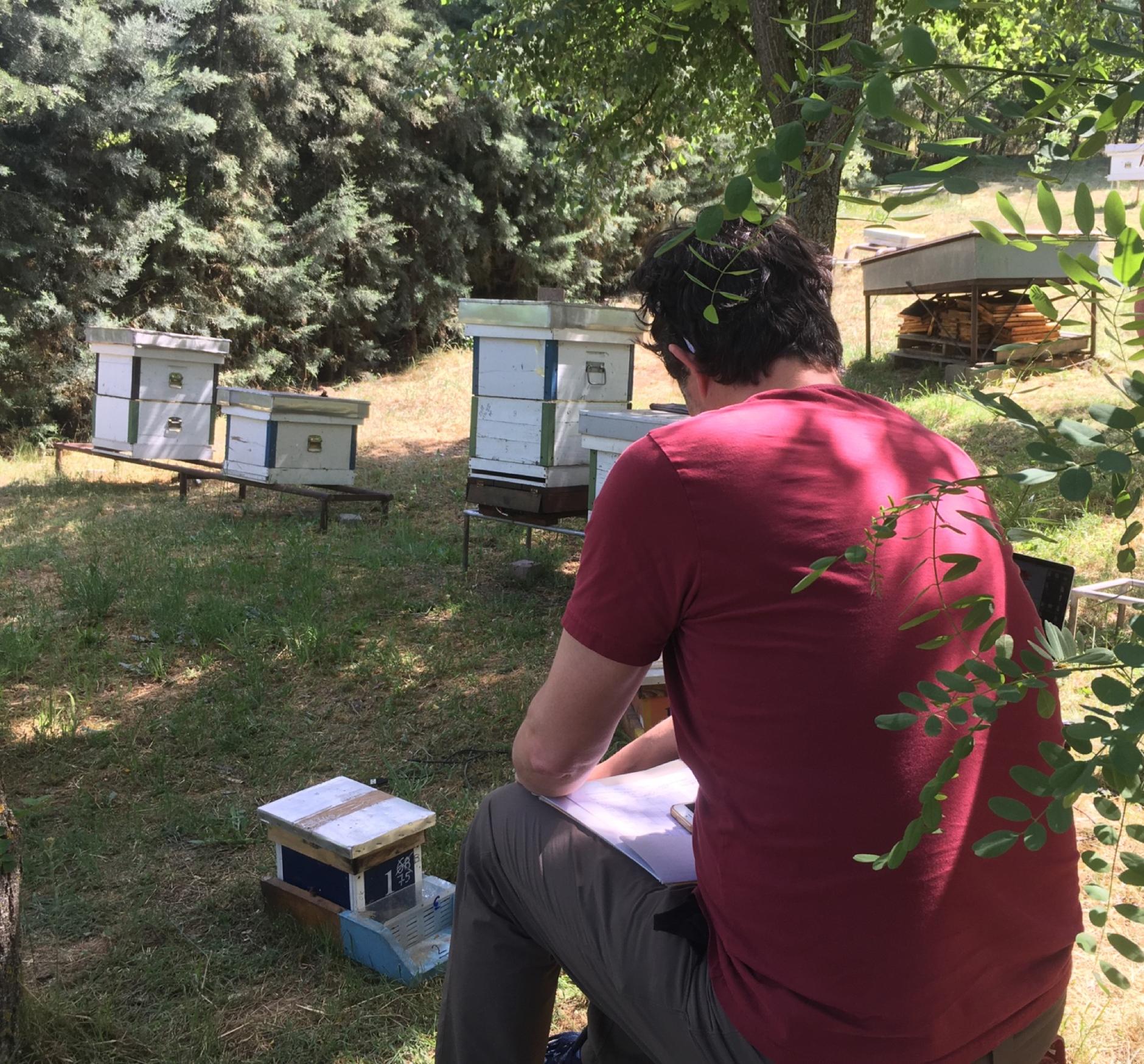
72
Regional Funds Online Magazine
Fostering transnational cooperation enables multidisciplinary skill development
capacity and mobility, such grants enable higher education institutions to strengthen their research profiles and establish long-term transnational alliances.
Environmental issues including climate change, pollution and resource depletion are among the main challenges faced globally today, with organisations and governments calling for action. The shift to circular economy practices has been identified as a key factor to address such issues. In a circular economy, products are made to play a role in the economy for as long as possible, through reuse, repair, recycling and repurposing of materials in this way minimising or eliminating waste while conserving natural resources.
The European Union (EU) has placed strong emphasis on enhancing higher education and research capacities through the European Universities initiative. As part of the European strategy for 2023, this initiative aims to foster transnational alliances between higher education institutions to create a harmonized and interconnected European higher education, unbound by location and country borders while offering flexibility in the design of the curriculum so that students can choose the topics they wish to study. The overall aim is to equip scientists and researchers with an all rounded and transdisciplinary set of skills that meet the demands and requirements of the economies and industries of today and the future.
The goals of EEA & Norway Grants align closely with the European Universities initiative, creating synergies for collaboration through allocating resources to capacity-building projects, which contribute to upskilling the project partners involved. Within the context of the European Universities initiative, the EEA & Norway Grants can play a crucial role in supporting projects that enhance research infrastructure, foster international partnerships, and promote the development of core skills for researchers. By investing in research
Through the EEA and Norway Grants, transnational collaborations and knowledge exchange that provide a stepping stone towards tackling important issues are made possible through projects such as that of Circular Based Waste Management. The project consists of partners from three municipalities in three countries and a waste management centre (Lithuania, Estonia and Ukraine), as well as an expert partner from Norway. The main focus is knowledge sharing and learning from best circular practices in waste management strategies based on recycling, reusing, and reducing waste.
This collaboration and studies undertaken during the project have enhanced the knowledge of municipal officials while cultivating sustainable thinking among them and the local populations especially among youth, through communication and the involvement of local schools in activities planned within the project.
Through the study tours and webinars, the project has given the municipal officials the opportunity to be exposed to the full spectrum of topics of managing waste in a circular manner, enhancing their understanding and capacity on the subject. Topics covered range from design thinking for

73
Regional Funds Online Magazine
circularity of products and packaging, through to legislation, research and materials as well as recycling, waste handling, digitalisation and communication with the public.

Activities involving the public, such as sorting and recycling workshops, creative competitions, lectures and even encouraging high school students to attend a university course on Circular Economy have played key roles in nurturing circular mindsets.
The European Universities initiative and EEA & Norway Grants can offer significant opportunities for building long-term transnational alliances between higher education institutions and developing core skills for researchers. By encouraging collaboration, sharing resources, and emphasizing interdisciplinary approaches, this holistic approach fosters a vibrant research and learning environment that equips scientists with the necessary skills to address complex societal challenges such as that of establishing a circular economy, promotes sustainability, and strengthens the overall research landscape in Europe.
In a similar fashion, in terms of research, building transnational alliances through active collaboration and sharing expertise, resources, and facilities, institutions can foster a vibrant academic environment that encourages cross-border collaboration and promotes the acquisition of diverse skills.
Through offering interdisciplinary courses and research opportunities, higher education institutions can equip researchers with the ability to approach complex problems from multiple angles. This interdisciplinary thinking promotes creativity, innovation, and a holistic understanding of societal challenges. Additionally, collaboration with industry partners facilitates the acquisition of entrepreneurial skills and enhances researchers' ability to translate their knowledge into practical solutions, fostering a culture of innovation and research commercialization.
74 Regional Funds Online Magazine
Maritsa Kissamitaki – Circular Based Waste Management
http://circular-waste.eu/
Circular Based Waste Management Project
Closing the Gap: Fostering Collaboration and Empowering Young Professionals!
employers. On the other hand, from the employer's perspective, staff often follows the project and in periods of reduced financing (what we experienced between every project call) employers cannot afford extra job positions for less experienced youth.
Marlen Hunt (Ph.D. student and new worker at EU-WATERRES project partner - Geological Survey of Estonia (GSE) explains the groundwater modelling process to her mentor – Head of the Department of Hydrogeology and Environmental Geology at GSE, Andres Marandi.
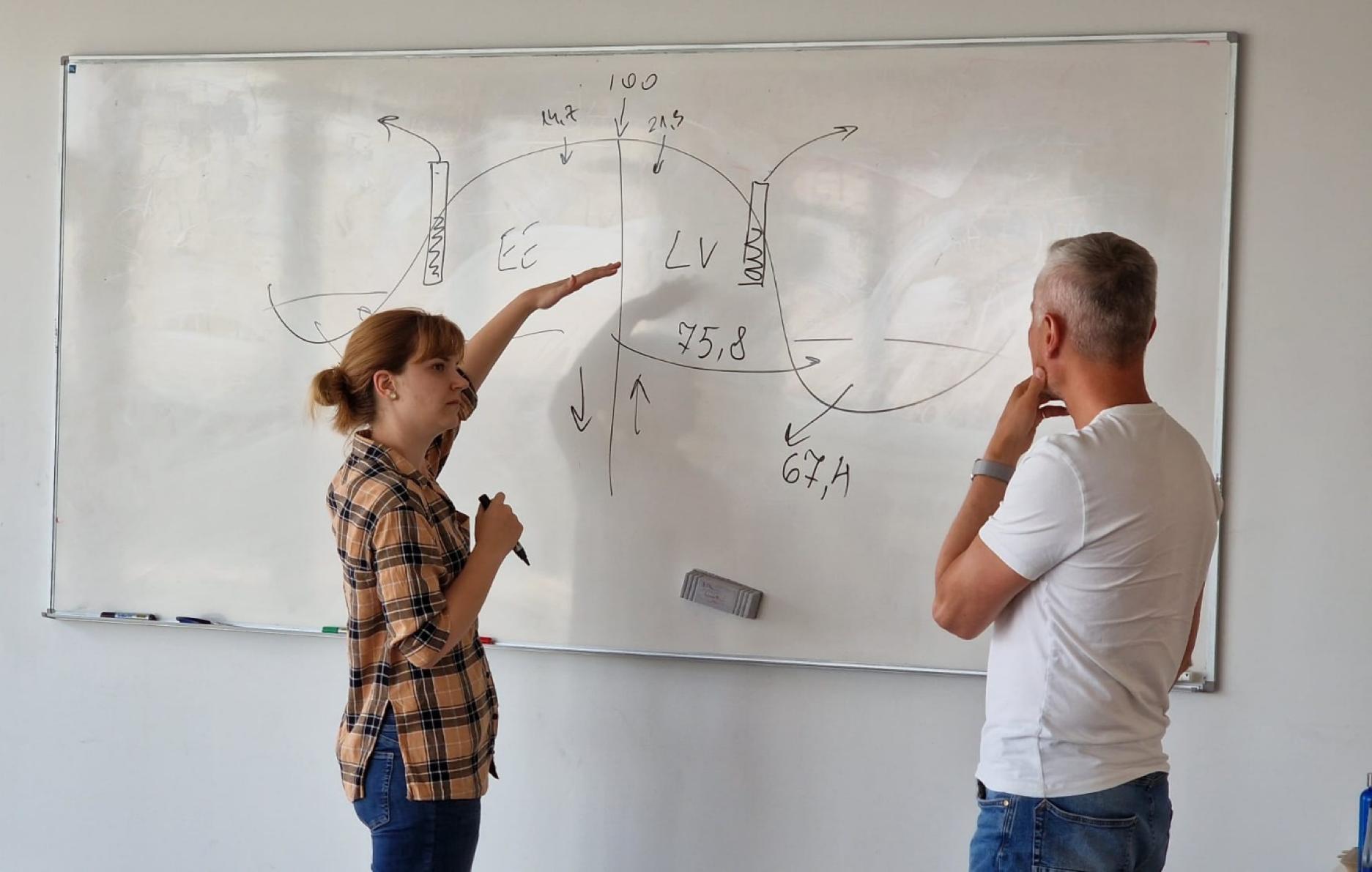
When asked about our collaboration with young people in project implementation, we enthusiastically say "yes" while considering our own involvement. But on closer observation, we may find that our notion of 'young people' differs from the official definition. Consequently, the presence of young professionals in our midst might not be as substantial as we desire. Why does this disparity exist? It's easy to attribute it solely to the belief that young people are disinterested in work that doesn't yield substantial income. However, this is only a partial truth. Today's young minds who choose environmental sciences as their career path are acutely aware of the critical issues that will challenge humanity in the next 30 - 50 years. They exhibit tremendous enthusiasm and activity during their studies. So, why are they seemingly absent in workplaces? One significant factor contributing to this scenario is the prevalence of unpaid internships offered by employers. Students have real-life expenses and cannot solely dedicate themselves to parties, and they want to be independent. Therefore, working solely on projects often cannot provide long-term safety. Unfortunately, this aspect often goes unnoticed by many
Secondly, funding applications are assessed based on the institution's experience and the project team's or the project manager’s potential. While this is understandable from a funding perspective, it does restrict young people's access to implementing ambitious ideas. There are indeed funds exclusively dedicated to young researchers, but the competition is fierce. Moreover, the potential mentors constantly fight for funding sources for their team and have little time to dedicate to the new members. Unfortunately, it often leads to leaving academia and similar workplaces as the young ones feel lost and unsupervised (especially if we compare with the industry sphere with bonus programs, team building activities, constant pay raise, etc.).
Effecting change requires systemic transformations. However, for these changes to occur, they must originate at the root. Experienced professionals must willingly embrace and involve young individuals in their activities, even if it means allowing room for mistakes, which are an integral part of the learning process. We mustn't retreat to our isolated realms but instead, feel the responsibility to share our knowledge and experience, even if it may be challenging. Also, the employers must understand that experience exchange is not solely the mentor’s responsibility and should find a way how to ease the process for everyone. As with many other challenges we encounter, communication and awareness are the keys to change. We must change and seek young colleagues otherwise some professions may extinct. It is imperative that we exhibit empathy and understanding towards young people who are yet to demonstrate their knowledge and creativity, which often has the potential to astonish us.
EU-WATERRES Project
75
Regional Funds Online Magazine
The European Year of Skills and BLUE-GREENWAY agenda
The European Year of Skills is a great opportunity to showcase the best practices that the BLUE-GREENWAY project has developed. Since we (the project team) have been in the workforce for a while, we have acquired a wealth of knowledge and skills that have helped us in our careers. It is important to highlight these experiences and share them with others to promote the value of lifelong learning.
One effective way to promote our best practices is through networking. Attend events and conferences in our field to meet other professionals and share our experiences with them. This will not only give us a chance to highlight our accomplishments but also allow us to learn from others. Another way to promote our best practices is through social media. Share our experiences and insights on LinkedIn, Twitter, and Facebook platforms. This will help us connect with other professionals and potentially attract new opportunities.
In addition, we consider writing articles or posts about our experiences. This will give us a platform to showcase our expertise and provide valuable information to others in our field. We can also offer to give presentations or workshops on our best practices to colleagues, industry associations, or professional organizations.
It is important to remember that promoting our best practices is not just about self-promotion. By sharing our experiences and knowledge, we can also help others. It is also an opportunity to contribute to the European Year of Skills, which aims to promote and improve the skills of individuals across the continent.
It is important to recognize the importance of diversity and inclusion in promoting best practices. Embrace di ff erent perspectives and backgrounds and seek out opportunities to learn from individuals who bring unique experiences and knowledge to the table. By creating a culture
of diversity and inclusion, we can help ensure that the best practices we promote are representative of a wide range of perspectives and experiences.
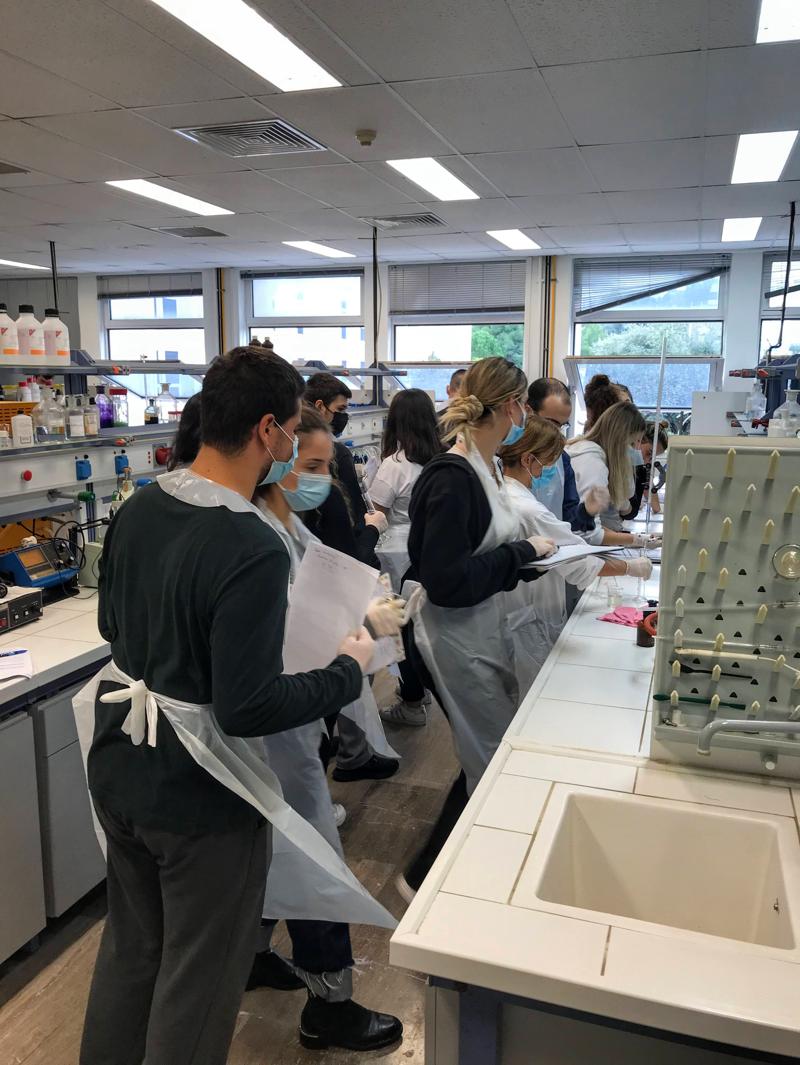
76
Regional Funds Online Magazine
In the BLUE-GREENWAY project, a suggested skills agenda could focus on identifying and addressing skills gaps in Europe. We can start by conducting a skills gap analysis to determine which skills are in high demand but lacking in the workforce. This can be done through surveys, interviews, or other forms of data collection.
Once we have identified the skills gaps, work on developing solutions to address them. This can include creating training programs to help target groups acquire the necessary skills and offer courses and certifications in the needed areas.
Another suggestion is to focus on promoting the value of lifelong learning and professional development. This can be done by highlighting the benefits of continuous learning and providing resources for individuals to pursue additional training or education. We can also work on promoting a culture of learning within Europe by hosting events or workshops focused on skills development. By focusing on addressing skills gaps, promoting lifelong learning, and promoting diversity and inclusion, we can contribute to the development of a strong and skilled workforce in our region and in Europe.
In conclusion, promoting our best practices during the European Year of Skills is an opportunity to demonstrate our commitment to continuous learning and professional development. Seek out feedback and constructive criticism, pursue certifications and additional training, embrace mentorship and coaching, and promote diversity. By doing so, we can contribute to the promotion of lifelong learning and help others succeed.
77 Regional Funds Online Magazine
BLUE-GREENWAY Project
Portrait of Judge – a bridge to long lasting co-operation among universities and with the actors in the field of justice
Project “Portrait of a Judge” aims to research and identify best practices in selection, evaluation and promotion procedures of judges, as well as to set up a model of competences essential to judges and future judges.s. To successfully achieve these goals a team, consisting of scientists from universities, judiciary and non-governmental institutions acting in the field of justice was set up. The research part of the team is represented by scientists from form a leading partner Mykolas Romeris University (Lithuania), Metropolitan University of Prague (Czech Republic) and University of Oslo (Norway), who work together with practitioners and experts from a Supreme Court of Lithuania, High Judicial Council of Albania, Supreme Court of Albania and an NGO Tirana Legal Aid Society.
As the project enters its final phases and the results are already visible, the lead manager of the Project prof. dr. Salvija Mulevičienė confirms that a bold decision to bring together in almost equal parts scientists and practitioners to the team was a success.
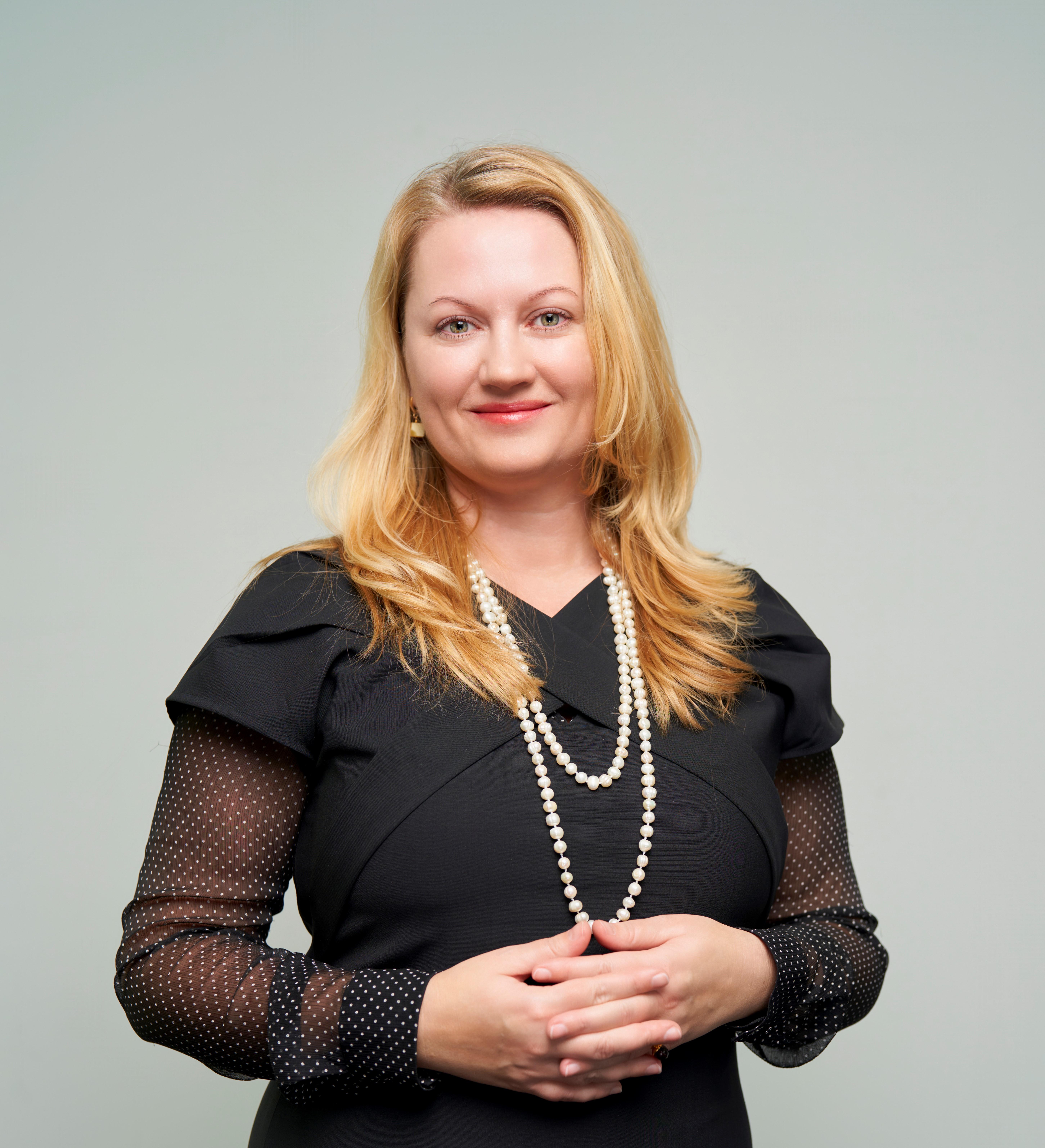

Although, as she underlines, such a decision inevitably brought a number of challenges in setting preferences, different perspectives allowed for an outburst of ideas and synergy in the search for right solutions, which in turn led to scientifically based and yet very much practically applicable results. “It is an excellent opportunity for researchers, who have a strong background in academia to communicate with judicial practitioners even more so – to achieve results, that would not only satisfy the team, but would be regarded as practically relevant and useful for the stakeholders. All the benchmark results of the Portrait of a
Judge: comparative research on the selection, evaluation and promotion of judges practices, the extensive model of competences and tools to use in the procedures of selection, evaluation and promotion of judges are practically relevant and will be useful now and in the future”
During the time span of the Project a number of international events for the target audience took place, which served as a platform to meet colleagues and experts in the field, to make connections and grow ties. Two international conferences were organized (in Lithuania and Albania) and one more will be held in October 2023 in the Prague, Czech Republic.
78
Regional Funds Online Magazine
Devoted to the topic of judicial independence as the cornerstone of the rule of law and one of the core values of democratic societies it has allowed experts to learn about the importance of the selection, promotion and evaluation procedures in this regard as well as learn of the latest jurisprudence of the European Court of Justice in the field and meet each other. A number of country visits have been rendered to institutions that have mandates in selection, evaluation and promotion of judges, including the Council for the Judiciary of the Netherlands, the Council for the Judiciary and the Supreme Court of Slovenia, the High Council for the Judiciary of Albania and the Supreme Court of Estonia which allowed for a relevant share of practices. However, one of the most important outcomes all the above-mentioned activities have brought is fostering long term ties. Naturally, these ties have primarily formed among the members of the international team and spilled over into stronger ties among participating institutions, but they have also laid the ground for co-operation among the universities and institutions acting in the field of justice. When asked about “what’s next” prof. dr. Salvija Mulevičienė is open: „This cooperation has laid ground for strong cooperation ties between beneficiary and expertise countries and between partners themselves that have already led to joint initiatives in other research fields. We also see initiatives among the institutions acting in the field of justice from other states (like Estonia) following the lead and transforming existing systems of selection and evaluation of judges, and this I regard as an additional success and the added European value the Portrait of a Judge has brought”.
Portrait of a Judge Project
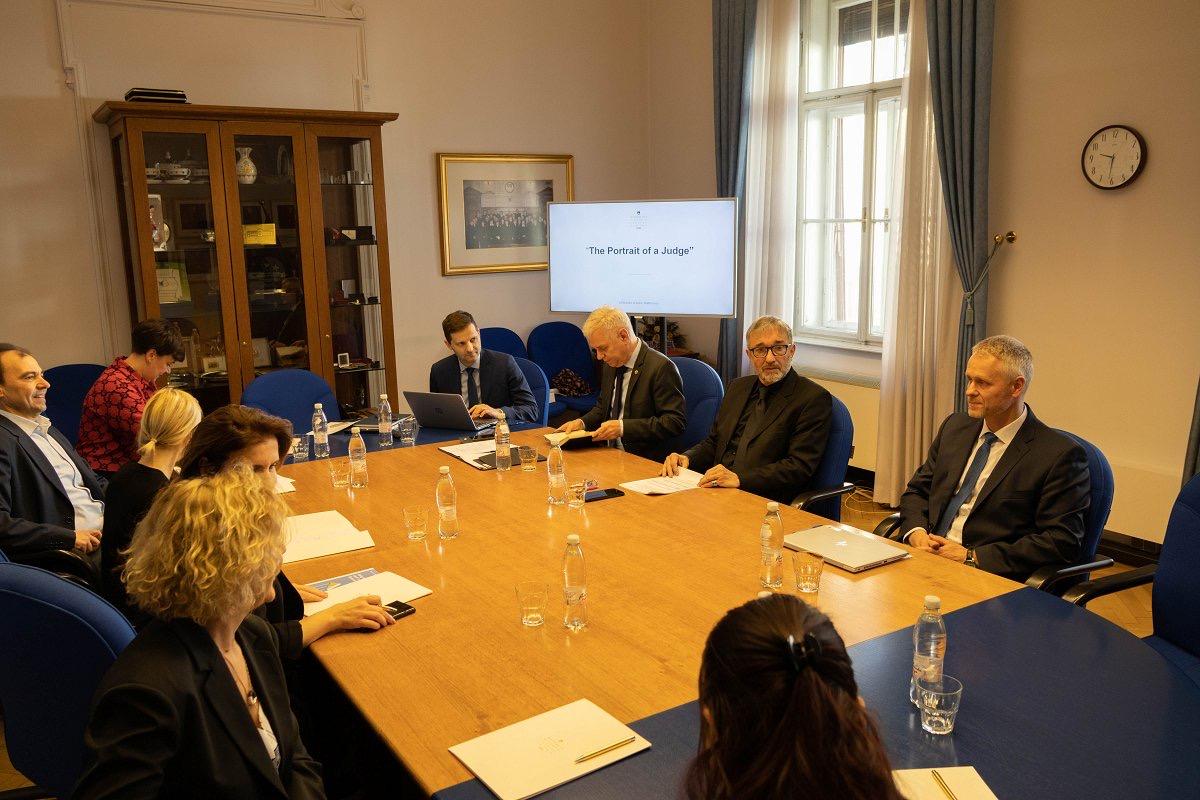
79 Regional Funds Online Magazine
Workshops and study visit to Poland From the Projects
The exchange of knowledge and experience among the project partners, scientists and stakeholders in beneficiary countries is an essential aspect since the very beginning of the User4GeoEnergy project. In order to implement this idea, capacity building events involving joint stakeholders consultations were organized in three beneficiary countries, starting in Poland.
Workshops for stakeholders were held on December 8th 2022, in Kraków. The target group for this event was the scientific community, doctoral students, operators of district heating systems, employees of local government units, as well as enterprises and companies from the energy sector - in particularly geothermal and district heating. In total, 29 people attended the meeting. The workshops aimed at presenting results of activities carried out in the project, as well as plans and tasks that are still ahead of the consortium.
During the first session, prof. Leszek Pająk, presented the project's background and goals. A special attention was paid to the efficient use of geothermal energy and the importance of well-matched cooperation between the geothermal source and the heating network. Particular attention was paid to the impact of technical requirements set by the recipient on the efficiency of geothermal energy use. Effective and economical energy management is essential nowadays when energy security and prices are subjected to unfavourable political and market trends. Then, experiences of project partners with geothermal development were shared among the audience.
In the second session, preliminary project results were presented for each work package. A pinnacle of this session was a presentation done by prof.
Leszek Pająk, showing how heat final users can influence its effective management and lower energy bills.
After this part, User4GeoEnergy experts discussed with the participants the role of geothermal energy as a reliable component of the district heating source and the importance of the requirements set by the recipient on the final price of heat. Based on the initial results of the project, it was demonstrated through various scenarios, supported by calculations and numerous graphs, that there is a need to promote actions aimed at correcting the energy characteristic of users. Different ways for financing necessary solutions were part of the discussion. Attention was also drawn to specific legal barriers that should be overcome in order to stimulate the development of geothermal district heating in Poland.
The last session was devoted to the progress of the currently ongoing projects related to the geothermal energy utilization in Poland. Presented projects:
• Capacity building of the key stakeholders in the area of geothermal energy (KeyGeothermal) www.keygeothermal.pl
• CO2-Enhanced Geothermal Systems for Climate Neutral Energy Supply (EnerGizerS Project) http://energizers.agh.edu.pl
• Water-Energy-Food Nexus: Geothermal water for agriculture project (Geo4Food) http://www.geo4food.com/
80
Regional Funds Online Magazine
The Capacity building event for members of the project’s consortium was organized 7th December as a technical study visit to selected geothermal installations located in the Podhale region (Southern Poland). First, members visited the geothermal facilities of MEERI PAS located in Bańska Niżna, being the 1st geothermal laboratory and pioneer of geothermal district heating in Poland.
Second visited place was PEC Geotermia Podhalańska S.A. – the largest supplier of geothermal heat in Poland.
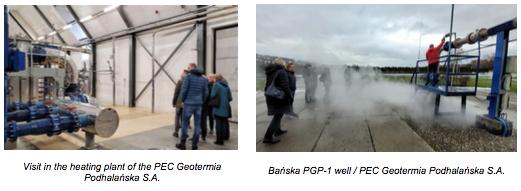
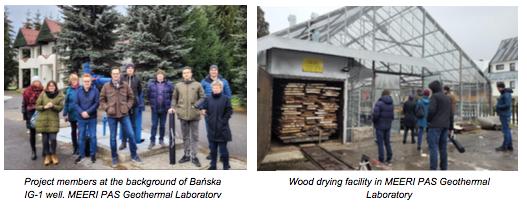
Presentations from companies presented during the visit can be found here.
The Project “Improving the energy efficiency of geothermal energy utilisation by adjusting the user characteristics“ is funded by Iceland, Liechtenstein and Norway through the EEA and Norway Grants Fund for Regional Cooperation, grant number 2018-1-0502.
More information about the EEA and Norway Grants Fund for Regional Cooperation: https://www.eeagrants.org/
More information on the Project: http://user4geoenergy.net/ pajak@meeri.pl Project manager)
The final item on the agenda was a visit to the Chochołowskie Thermal Baths – the largest thermal baths in southern Poland located in Witów (Podhale region).
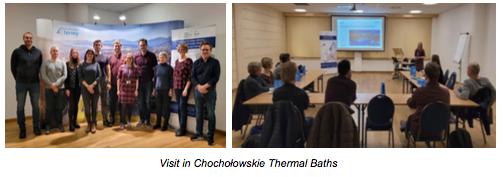
81 Regional Funds Online Magazine
User4GeoEnergy Project


82 Regional Funds Online Magazine User4GeoEnergy Project
Why sustainability is important for your business
Everybody is talking about sustainability and business as usual doesn’t exist anymore. We need to change how we run our companies in order to protect both the planet and the people, but also in order to generate future profit. There are many reasons why your company should focus on sustainability, but I would like to emphasise three – saving money, access to more projects and building strong relationships with your stakeholders.
You save money
The easiest thing we can start doing immediately is stop wasting. And it’s not just about resources, it also about time, people, processes and all activities your business is engaged in. In order to analyse what and how the company waste today, it’s important to analyse the whole value chain and your activities.
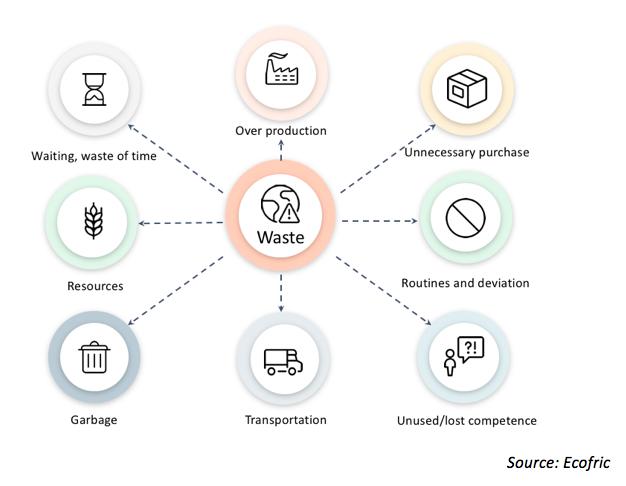
The fact is that there is less access to all resources and they are more expensive. Both the corona pandemic and the war in Ukraine have contributed to escalating this development even faster. In addition to this we see that governments are starting to use fees and regulations on products and services that are not sustainable, so companies are forced to make more sustainable choices.
For some this can be an important competitive advantage and if you buy only what you need, use it up and recycle, it’s also a way of saving money. It’s all about moving from linear to circular economy and the fact that you reuse, repair, rental, recycle when it’s possible. It’s quality instead of quantity and it will save you time and money.
You get in position for more projects
The demands of running a sustainable company are increasing and reporting on sustainability will be mandatory in the future. Due to the EUtaxonomy the large companies are already being monitored, and the surveillance system will also affect smaller companies as suppliers and cooperating partners to the larger companies.
So, if your business can document that you focus on running a sustainable business, it will be easier for the larger companies to work with you. And if you are first or early mover in your market, it can be a real competitive advantage.
It’s important for your stakeholders
Your business has an impact on many stakeholders, not just your costumers. There are a lot of groups affected by your business. It can be politicians, employees, owners, shareholders, the local community and so forth. They can be internal and external and you need to consider the number of people in the different stakeholder groups and the degree of importance.
83
Regional Funds Online Magazine
You need to understand all your stakeholders and you need to understand their problems, their issues and adjust your solution to fit their needs. When we meet their needs, we create a win win situation. The company become the problem solver, and will be considered a helping hand, a friend. In the end, our stakeholders can become attached to us and they will be future ambassadors. So, keeping the stakeholders happy is good for business. The importance of different stakeholders will vary from time to time, and it’s important that we recognize this and continuously evaluate and adjust our actions.

P’s – people, planet and profit. You need to commit and actively contribute to the essence of sustainability; meeting our own needs without compromising with the ability of future generations to meet their needs. It’s about causing little or no damage to the environment and creating a longlasting business. And be transparent and communicate your results. It will save you money in the long run, you will be included in more projects and your stakeholders will applaud you. Good luck!
By Lotte Frost, Wingate Norway Wingate Project
To sum it all up, sustainability is about balance. And in order to create a thriving and healthy business for the future you need to balance the three
84 Regional Funds Online Magazine
Developing digital skills in Criminal Justice: The HOPE Project’s Contribution
Digital skills in a digital criminal justice world
With the steady, ongoing, and swift advance of technological development and its aggregation into society and all spheres of human coexistence, we are faced with an increasingly digital reality. This results in technologies finding greater application in various domains, thus becoming a central core of society’s daily lifestyle (Dolgopolov, Ivanov, Lauta, & Yacobi, 2022), and the increasing importance of being prepared to use them (i.e., digital skills).
One such sphere at the heart of human and social coexistence is criminal justice, which has been no stranger to digitalisation processes, and to the need to foster greater digital skills among stakeholders in the sector. Hence, growing efforts have been made towards promoting symbiosis between digital technology and criminal justice systems (Dolgopolov, Ivanov, Lauta, & Yacobi, 2022; Donoghue, 2017).
Academic and scientific community's interdisciplinary studies (Stratton, Powell, & Cameron, 2017; Dolgopolov, Ivanov, Lauta, & Yacobi, 2022) and the challenges brought by the COVID-19 pandemic (European Commission, 2020a; Carrera, Mitsilegas, & Stefan, 2021), have underlined the transformative impact of digital technologies and communications in promoting the development of justice systems. On the other hand, they also brought to light the challenges and shortcomings stemming from a lack of digital literacy in the sector.
Within the European context, the digitalisation of criminal justice has acquired a great academic and political-institutional focus. Cooperative relationships have been created between European institutions seeking to promote and advance the European Union’s focus on the digital transformation of justice systems. To this end, over the years, several strategies have been created to promote the development and implementation of innovative technologies in national justice systems.
These were complemented by implementing nationally adapted strategies (Carrera, Mitsilegas, & Stefan, 2021; European Commission, 2020b), as well as training relevant stakeholders in the justice sector to utilise such technologies within their scope.
Nevertheless, there is still a lack of state-of-the-art technologies for effective cooperation among criminal justice systems, as well as a lack of digital skills, further accentuated by COVID-19’s consequences (European Commission, 2020a). Although some initiatives primarily address security and law enforcement concerns, it is essential to recognise the broader opportunities offered by the digitalisation of the sector (Carrera, Mitsilegas, & Stefan, 2021).
Taking advantage of the digitalisation of criminal justice through digital skills
Considering the ever-evolving security threat landscape and the rapid pace of technological advancements, the digitalisation of criminal justice systems is essential for its modernisation and optimisation. Such has particular relevance in promoting and strengthening cooperation between relevant stakeholders in the sector, as well as within the scope of data sharing and management (European Commission, 2020a). Equally important as this digitalisation, however, is the qualification and training of the relevant actors in the criminal justice system as the main users of these digital tools.
While these technologies are not intended to displace the work and the human role in criminal justice (Dolgopolov, Ivanov, Lauta, & Yacobi, 2022), the fact is that their operational benefits and e ffi ciencies are unquestionable (European Commission, 2020b), thus stressing the importance of know-how and digital competences to ensure their optimum use.
85
Regional Funds Online Magazine
These technological advances, processes of digitalisation, and digital skills promotion intend to make criminal justice pathways more efficient (Dolgopolov, Ivanov, Lauta, & Yacobi, 2022), opening up wider spaces for dialogue and cooperation between different stakeholders (Stratton, Powell, & Cameron, 2017).
The transformative effect of the digital communication sphere has sparked discussions on how new forms of technology can enhance and improve the sector (Donoghue, 2017). One of the great strengths of using digital technologies is the ability to ensure efficient threads of communication that facilitate the cooperation of different stakeholders in the criminal justice system (European Commission, 2020a). This subsequently guarantees interoperability between different national and EU actors, contributing to the improvement of their effectiveness within the national systems (Carrera, Mitsilegas, & Stefan, 2021; European Commission, 2020a).
In light of this reality, and to move forward with the potential of digitalising criminal justice systems, the EU has stressed the importance of strengthening partnerships and creating networks within the justice sector to promote the use of these digital tools, projects, partners, and funding opportunities. On the other hand, it has also been recommended to enhance the involvement of justice experts in raising awareness initiatives on the benefits of innovative technologies and their specific challenges (European Commission, 2020b).
This, among other actions, further demonstrates Europe’s commitment to establishing an ecosystem of excellence that fosters the development and adoption of technologies and digital tools in criminal justice (European Commission, 2020b), and the need for improving digital skills to grasp this potential. As such, numerous initiatives have been undertaken by both European and national entities to transition towards ensuring reliable, secure, and trustworthy digital products (European Commission, 2020b).
The HOPE Project: A reflection of criminal justice digitalisation’s potential
In this sense, the HOPE project serves as a good demonstration of the positive potential that the use of digital tools and skills holds within the criminal justice sector. By embracing a digital and online interface as one of its cornerstones, the project showcases how the integration of digital technologies can enhance various aspects of the criminal justice system.
Aligned with Europe's vision of modernising systems and achieving climate goals through the digital transition, the HOPE project recognises the transformative power of digitalisation. Through its emphasis on digital tools and readiness, the project signifies a forward-thinking approach that harnesses technology to drive progress and innovation in the field of criminal justice.
By utilising an e-Learning system within the Corrections Learning Academy, the project extends opportunities for training and capacitybuilding to professionals across different locations and time zones. This inclusive approach not only overcomes traditional barriers related to organisational policies and logistical challenges but also empowers participants to learn and develop their skills at their own pace. The digital platform enables seamless access to relevant resources, facilitates knowledge exchange, and fosters a collaborative learning environment that transcends physical boundaries.
The project's commitment to utilising digital platforms for transnational events and communications further underscores the positive impact of digitalisation in the criminal justice sector. By facilitating wider participation and enabling cost-e ff ective engagement, digital tools empower stakeholders to contribute actively to the project's objectives. This inclusive and collaborative approach ensures that diverse perspectives and expertise are leveraged to drive meaningful change and innovation.
Furthermore, the incorporation of digital learning methods, such as eLearning modules and virtual training sessions, highlights the project's dedication to enhancing partners digital proficiency and knowledge.
86 Regional Funds Online Magazine
By providing remote access to learning opportunities, the project empowers individuals to acquire new skills and stay updated on the latest developments in the field of criminal justice. This focus on continuous learning and digital skills development reflects the project's commitment to nurturing a digitally competent workforce that can effectively address the evolving challenges of the criminal justice landscape, whilst taking advantage of the digital tools available to achieve such aims (i.e., through the creation of an online network, online events and workshops, and the use of e-Learning tools).
In summary, the HOPE project serves as an example of how the strategic integration of digital tools, along with the necessary development and fostering of digital skills, can unlock the potential within the criminal justice sector. By embracing digitalisation, the project enhances training opportunities, streamlines project management, fosters collaboration, and empowers stakeholders to work together towards achieving positive and transformative outcomes.

References
Carrera, S., Mitsilegas, V., Stefan, M., (2021). Criminal Justice, Fundamental Rights and the Rule of law in the Digital Age - Report of CEPS and QMUL Task Force. Center for European Policy Studies. Belgium. https://www.ceps.eu/ceps-publications/criminal-justicefundamental-rights-and-the-rule-of-law-in-the-digital-age/
Dolgopolov, K., Ivanov, S., Lauta, O. & Yacobi, I. (2022). The Digital Era Of Criminal Justice And Its Features Due To The Current Development Of Computer Technology And Artificial Intelligence. Revista Jurídica, 3(70), 826-837. https://revista.unicuritiba.edu.br/index.php/RevJur/article/view/ 5704
Donoghue, J. (2017). The Rise of Digital Justice: Courtroom Technology, Public Participation and Access to Justice. The Modern Law Review, 80(6), 995-1025. https://doi.org/10.1111/1468-2230.12300
aEuropean Commission, Directorate-General for Justice and Consumers. (2020). Cross-border digital criminal justice – Final report. Publications Office: Brussels. https://data.europa.eu/doi/10.2838/118529
bEuropean Commission, Directorate-General for Justice and Consumers. (2020). Study on the use of innovative technologies in the justice field –Final report. Publications Office: Brussels. https://data.europa.eu/doi/ 10.2838/585101
Stratton G., Powell A. & Cameron R. (2017). Crime and Justice in Digital Society: Towards a ‘Digital Criminology’? International Journal for Crime, Justice, and Social Democracy, 6(2), 17‐33. https://doi.org/10.5204/ ijcjsd.v6i2.355
HOPE Project
87 Regional Funds Online Magazine
Let them build it! - youth workshop series report
In the past few weeks we held three online workshops for young people from the Czech Republic, Poland, Hungary, Romania, Bulgaria. Each time we discussed topics concerning young people the most:
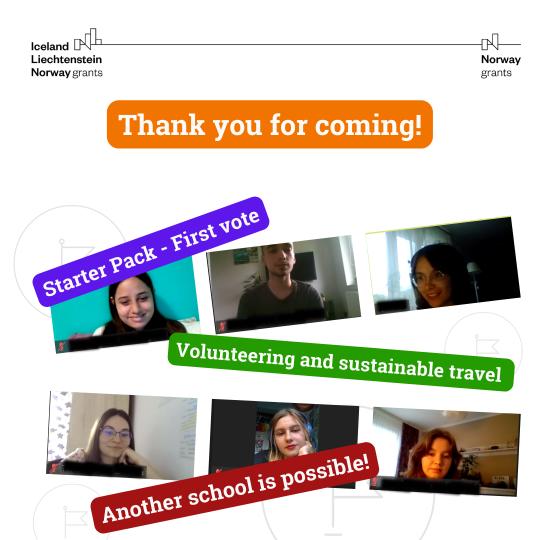
• How to cast your first vote? - a start pack for first voters
• How to travel and stay environmentally friendly at the same time? What opportunities does international volunteering offer?
• How to make your school more demoratic and how can students have a voice in its matters, too?
During the first workshop students our young participants learned about the basics of voting, got deeper knowledge about important institutions, most specifically with respect to the upcoming European Parlaimentary elections. They considered the ideal image of a politicain, their beliefs, motivs, manners and skills in small groups and discussed young people's role and the importance of participation in politics.
The second workshop starred Slavek Karl, a world traveller, who shared his experiences of sustainable travelling and international volunteering with the participants simultaneously caring for nature conservation and interested in exploring the world.
Relaim Our Civil Space! has been working for years now to strengthen civil society and the voice of active citizens all over Central and Eastern Europe. We do so, because we believe in a democratic and sustainable future, where people can participate freely and they listen to, help and respect one another. We also believe, that this future belongs to the young people and that it is our responsibility to enable them to build it. A short report of the Reclaim Our Civil Space youth workshops.
At our third and final workshop we invited young people to discuss the one place they spend most of their days: their school. What does their school look like? How do their everydays look like? How are teachers and fellow students? How the school itself, its institutions and its teachers support the students? Can they truly participate in matters of their school as a community?
We discussed workload, homework, the means of teaching, tests and cooperation in the classrom and many more with the goal to help young people to realize and represent their interests at school.
88
Regional Funds Online Magazine
For now it was three workshops and only a couple of weeks working together and our project is slowly coming to an end this autumn. But if you have participated and you are devoted to be an active citizen, follow the work of our partners from your country who can help you grow and learn even more:

If you are interested at our closing conference in Brussels this autumn, register to see what we have achieved and where do we stand with our claim for a comprehensive European civil society strategy. https://civilspace.eu/en/closing-conference-brussels
Reclaim Our Civil Space! Project
89 Regional Funds Online Magazine
The endeavour of Reclaim Our Civil Space! started back in
2020 with 10 civil society organizations from 8 countriesPoland, Czech Republic, Slovakia, Hungary, Romania, Bulgaria, Serbia and Norway as an expert partner - and is coming to an end with this conference.
Venue: EFTA House Avenue des Arts 19H, 1000 Brussels, Belgium
Date: 12. October 2023
In the past three years we addressed the trends of democratic backsliding and shrinking civil space in Central and Southeastern Europe. We helped local organisations build their capacities, facilitated cross-border networking among them and brought the voice of civil society organisations to Brussels.
We put together a set of recommendations to develop a comprehensive EU civil society strategy and advocated for its adoption. This conference serves the purpose to present these highlights of the project from local to European and to review the state of our proposals for the civil society strategy.
In addition, we will explore the potential next steps towards a comprehensive European civil society strategy at the conference with regard to the upcoming European elections next year.
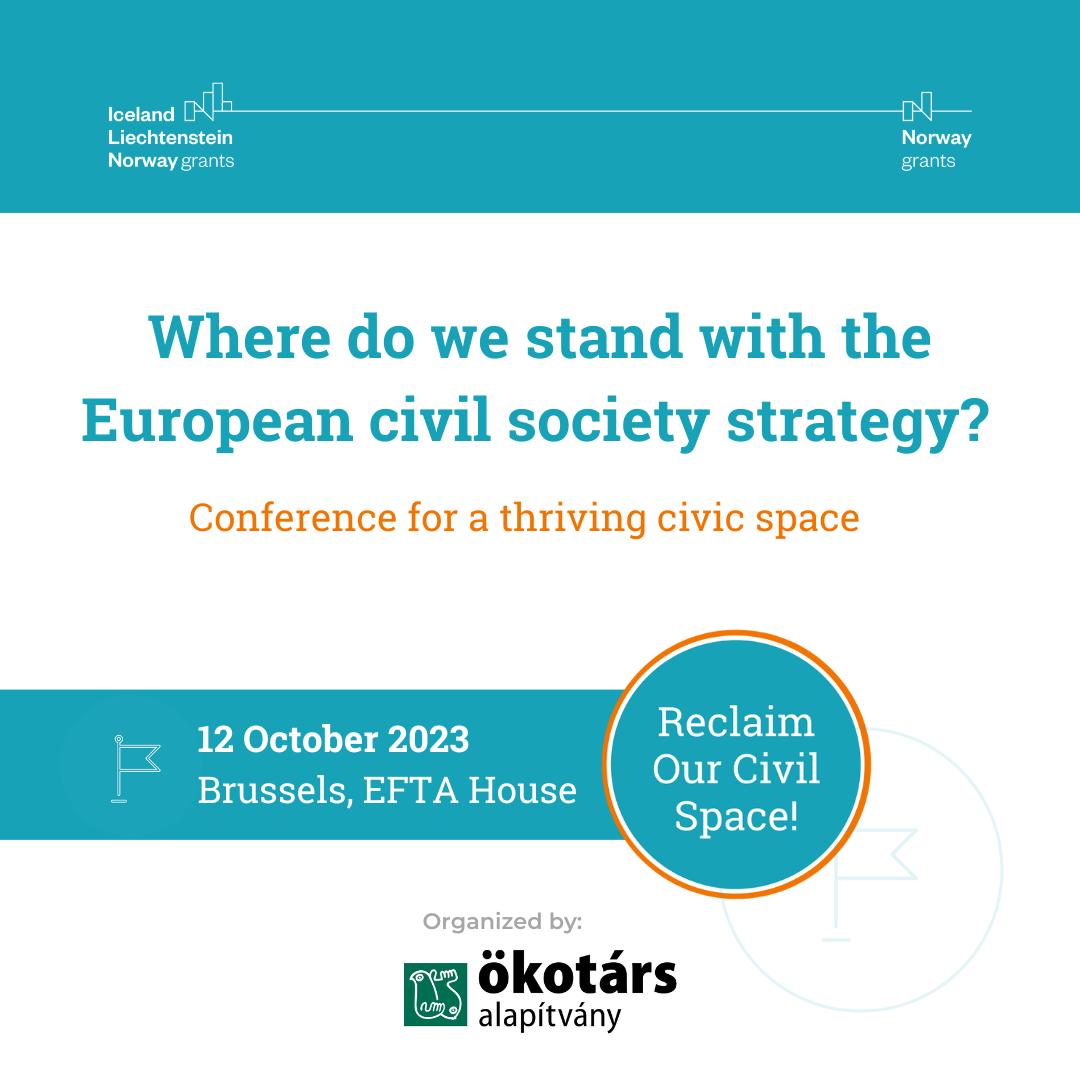
Registration and further info with agenda: https://civilspace.eu/en/closingconference-brussels
Reclaim Our Civil Space! Project
90
Regional Funds Online Magazine
CCS4CEE: Study trip to Norway, June 2023

general knowledge on the state of CCS technology deployment in Europe. The presenters were, in chronological order: Michał Wendołowski (Bellona Europa), Truls Jemtland (Celsio) and Szczepan Polak (Equinor). In addition, Kamil Laskowski (WiseEuropa) interviewed Eivind Berstad (Bellona Foundation), and later Ervinas Škikūnas (Civitta) moderated a panel discussion with Hanne Rolén (Aker Carbon Capture), Anders Melhus (Altera Infrastructure) and Eirik Falck da Silva (Sintef).
Norway is regarded as the home of CCS technologies in Europe –consequently, for anyone professionally involved in their implementation, the country is a must-visit destination. At the end of June 2023, the CCS4CEE project hosted a study trip for project partners and a group of CCS stakeholders from Central and Eastern Europe. They, for the first time, were able to witness first-hand CCS as it is deployed. The group visited CCS sites, including, the Northern Lights CO2 terminal in the fjords of Bergen.
Day 1
The trip began in Oslo with a rather informal ice-breaking dinner that provided an excellent opportunity for the participants to connect and learn about each other’s affiliations and relevance for CCS. The next day the study trip officially kicked off with a half-day workshop led by the main organiser, Bellona. This was an opportunity for stakeholders to get to know each other better and find out more about what each participant expected to take away from the study trip. The participants represented a variety of backgrounds, so the presentations given that day aimed to level the
At the recent CCS4CEE events, the issue of public acceptance has been mentioned more and more frequently. Our group of stakeholders was eager to learn about public perception of CCS and lessons learned in the Norwegian context as public opposition is widely seen as one of the main barriers to rapid CCS deployment in CEE countries (in addition to legislative and financial barriers). The presenters also shared their experiences in this regard. After lunch, we were driven to Porsgrunn, a town located 150 km south of Oslo.
Day 2
Our second day featured a visit to the Norcem cement plant in Brevik, operated by Heidelberg Materials, one of the world’s largest producers of building materials. The company is in the process of installing a carbon capture unit on their cement plant as part of the wider Longship project and thus in the future expects to become a supplier of captured carbon dioxide for storage to be handled by Northern Lights. From their presentation we received an overview of what a cement plant looks like from a bird’s eye view, how cement is produced, and the several ways in which CO2 emissions can be reduced, including the use of CCS which will on the long term be responsible for abating roughly two thirds of the plant’s emissions stemming from the calcination process that cannot otherwise be dealt with. Many of the tour’s participants represented the cement industry from the CEE region, so at the end of the session several technical questions were asked and experiences were shared.
91
Regional Funds Online Magazine
Interestingly, the cement plant has already been visited by some VIPs, including members of the Norwegian royal family and the German vicechancellor from the Greens party, Robert Habeck. The level of awareness of the topic among the general public in Norway is also relatively high, and as a result, the local media eagerly reports on it.
In the afternoon the group moved on to Bergen.
Day 3
Day 3 was the highlight of the trip: on the last official day of the visit, we travelled to the Northern Lights terminal that is currently under construction at Øygarden. The project is part of the Norwegian government-backed Longship project. The terminal will receive, temporarily store, and facilitate the injection of captured CO2 into geological formations located 2,600 metres below the seabed on the Norwegian Continental Shelf. The project will become operational already next year in 2024, but it will likely be further extended to handle larger amount of CO2 storage as the demand increases for their service across Europe. Importantly, the Longship project has received substantial state funding, which has been instrumental for deploying it at an industrial scale and making it economically viable for the CO2 transport and storage operator, the Northern Lights JV (a joint venture between Equinor, Shell and TotalEnergies).
The Northern Lights terminal is becoming somewhat of a tourist attraction; a visitor centre with a meeting and presentation room was built to showcase the project for visitors.
Captured carbon dioxide will be transported to the site by ships every four days. The ships being currently built for the project will be the largest of its kind in the world for transporting CO2. A key element that makes the service of CO2storage possible to be according to Northern Lights is the combination of multiple modes of transport that enables the transport of CO2. Within the framework of the Longship project CO2 is transported by a combination of ships, pipelines, and trucks – in case of the Celsio carbon
capture project as the waste to energy facility is not located directly on the seaside.
Currently, many more CO2 storage sites are being developed in Norway; approximately five of them are in the licensing stage, which should unlock Norwegian potential to a much larger extent.
At Øygarden we got a chance to take a close look at the installations being built there. It was the perfect finale for the Norway CCS study trip; everyone has certainly gained much new and practical knowledge which hopefully will galvanize CCS stakeholders to move forward CCS deployment in the countries of Central and Eastern Europe.
The study trip aimed to showcase CCS projects currently under development in Norway to a select group of 39 stakeholders from the Central Eastern European region, including the representatives of national and local authorities, industry, civil society, and academia. We aimed to introduce stakeholders to the development of each step of the CCS value chain as well as invite them for a discussion on lessons learnt from the Norwegian experience with CCS that could be applied in Central and Eastern Europe. The study trip was organised by Bellona Europa, in collaboration with Gassnova.
The list of participants included representatives of: University of Zagreb; HOLCIM; NEXE d.d.; Europeum; Ministry of the Environment of the Czech Republic; Ministry of Industry and Trade of the Czech Republic; Enefit; TalTech; Bellona Europa; Duna-Dráva Cement (Heidelberg Cement), Civitta; Schwenk Latvija; Latvenergo; Klaipedos Nafta; Ministry of Energy of the Republic of Lithuania; Kaunas University of Technology; WiseEuropa; PKN ORLEN; Cemex; EPG; Ministry of Energy of Romania; Ministry of Environment of Romania; Slovak Geological Institute Slovakia; Office of President of Slovakia; Salonit Anhovo, GP-Sistemi.
92 Regional Funds Online Magazine
CCS4CEE Project
Ruse Creative Center and its exciting event for young artists from the city of Ruse
The competition "Children draw the best!" also attracted participants from other cities. These children will also be rewarded for their creative achievements with special certificates and surprises printed on the 3D printer in the Creative Centre. Such an initiative contributes to the development of children's creativity and provides a unique opportunity for talented children to continue developing in the field of digital art and creative industries.
On July 22, the Ruse Creative Center hosted an exciting event for young artists from the city of Ruse, providing them with free training in digital painting. The talented children who excelled in the weekly competition "Kids draw best" were rewarded with a unique opportunity - to develop in the field of digital art. This special lesson was a reward for the children who showed their talent through three different themes and were awarded with special digital drawing lessons provided by the Creative Centre.
The program offered the children the opportunity to touch the real professional technique in the field of graphic and game design. The feedback from the children was positive, with them having fun and being inspired by the new things they learned.
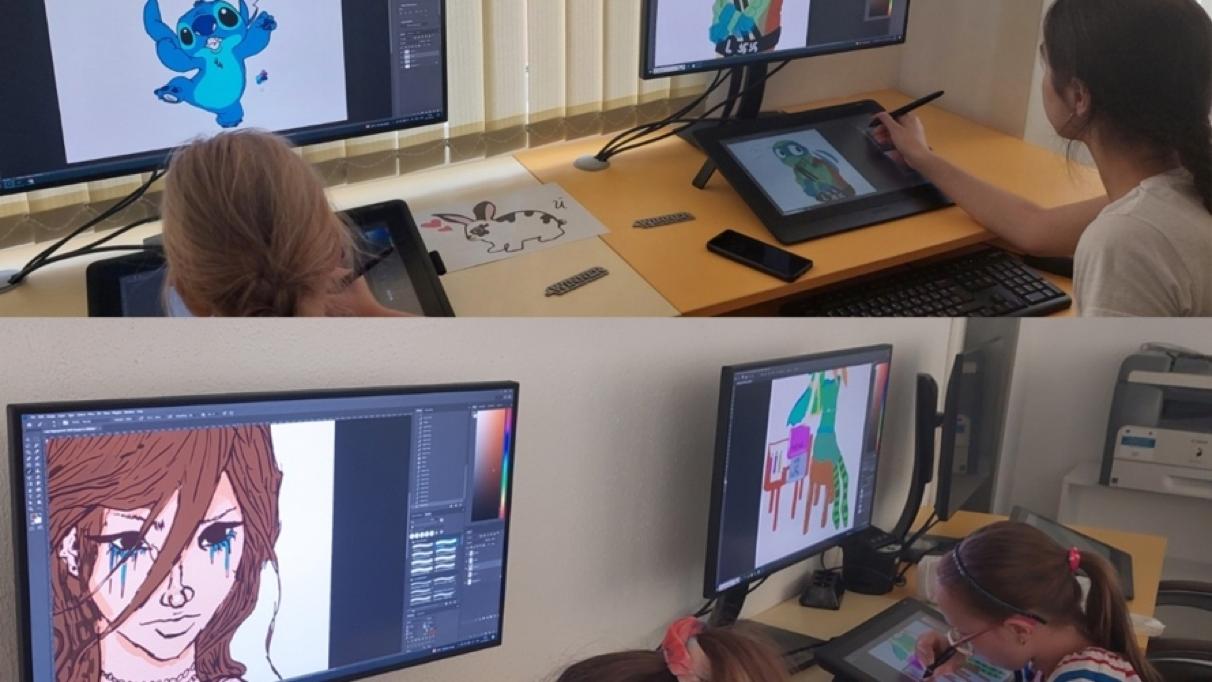
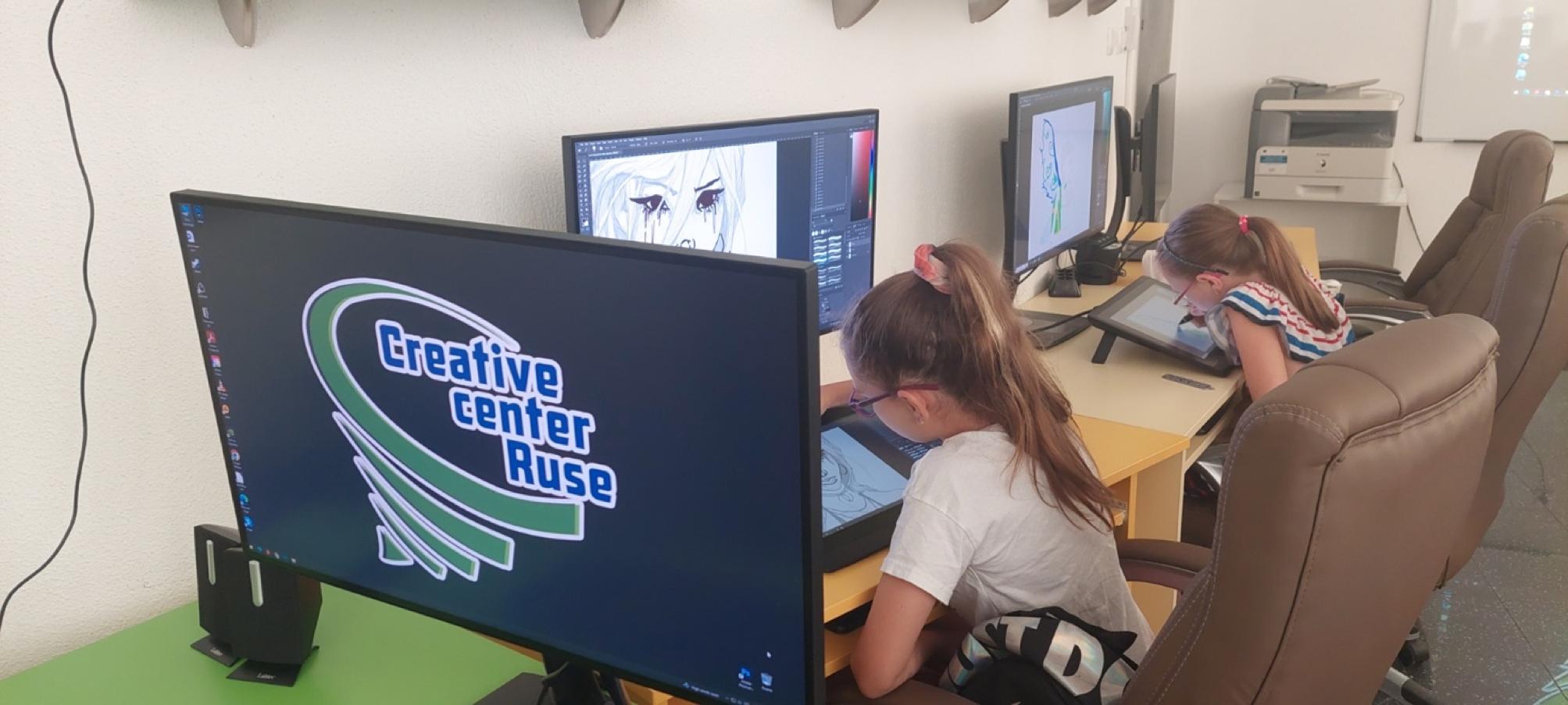
The organizers announced that all the winners of the competition are looking forward to next Saturday to return to the Rousse Creative Center and enjoy free digital painting lessons. This experience is a valuable opportunity for children to develop their skills and learn new techniques in digital art, game design and creative thinking.
The entire initiative is the result of the efforts of the Human Resources Development Agency (HRDA), which provides the awards and training with its own funds. Their immeasurable support allows many children to access a professionally equipped computer room provided by the HRDA-winning project C.O.D.E. (financed by EEA & NORWAY Grants). And it is not the first time in this Mag we can read the activities organised by Creative Center Ruse (here one can remember when the Center Tartu Art School exchanged experiences and good practices with the schools in Ruse).
93
Regional Funds Online Magazine
This is another bright story to encourage children to pursue their creative interests and develop their skills. The free training in digital painting at the Ruse Creative Center is a wonderful example of how the joint efforts of society can turn talented children into future artists and designers.

Credit pictures: team of HRDA
CODE project
94 Regional Funds Online Magazine
Field workshop for Polish NEETs in StayOn project

As part of a group session in the StayOn project, on 15 June the Polish Farm Advisory and Training Centre took 20 NEETs to a Field Workshop entitled "Choosing the right crop varieties and using the right machinery to guarantee the adaptation of agriculture to climate change". These took place at the Experimental Station for Variety Evaluation in Krzyżewo.
NEETs listened to lectures on 'How to adapt your farm to a changing climate' and 'Advantages of using fertilisation with an extended micronutrient composition'.
The lectures were combined with a tour of the collection of cereal crop varieties in the experimental plots. Modern agricultural machinery and equipment with environmental protection features was also on display.

For the NEETs it was a very valuable experience. They were able to learn how to take care of agricultural crops and how to follow the principles of organic farming at the same time. After the theoretical group training, this trip was an opportunity to gather practical knowledge.
More about the event: https://youtu.be/JFpikaFx1xY
Polish Farm Advisory & Training Center
StayOn Project
95
Regional Funds Online Magazine
Science closer to business - student closer to labour marketbusiness breakfast and debate about students and NEETs in Poland
On 14 June 2023, Natalia Truszkowska, director and coach of the Polish Farm Advisory and Training Centre, took part in a business breakfast combined with a debate entitled 'Science closer to business - student closer to the labour market' that took place in Łomża.
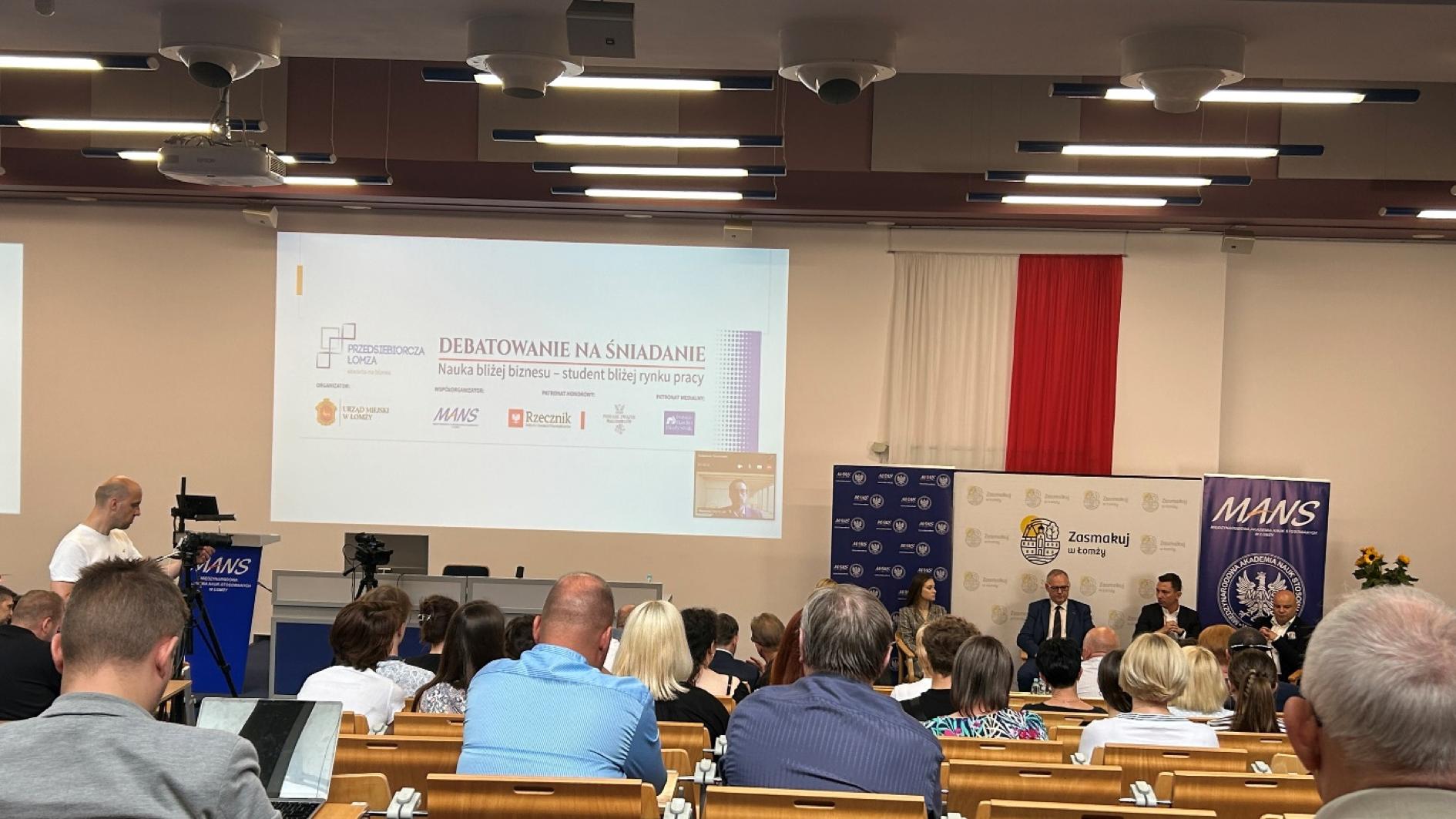
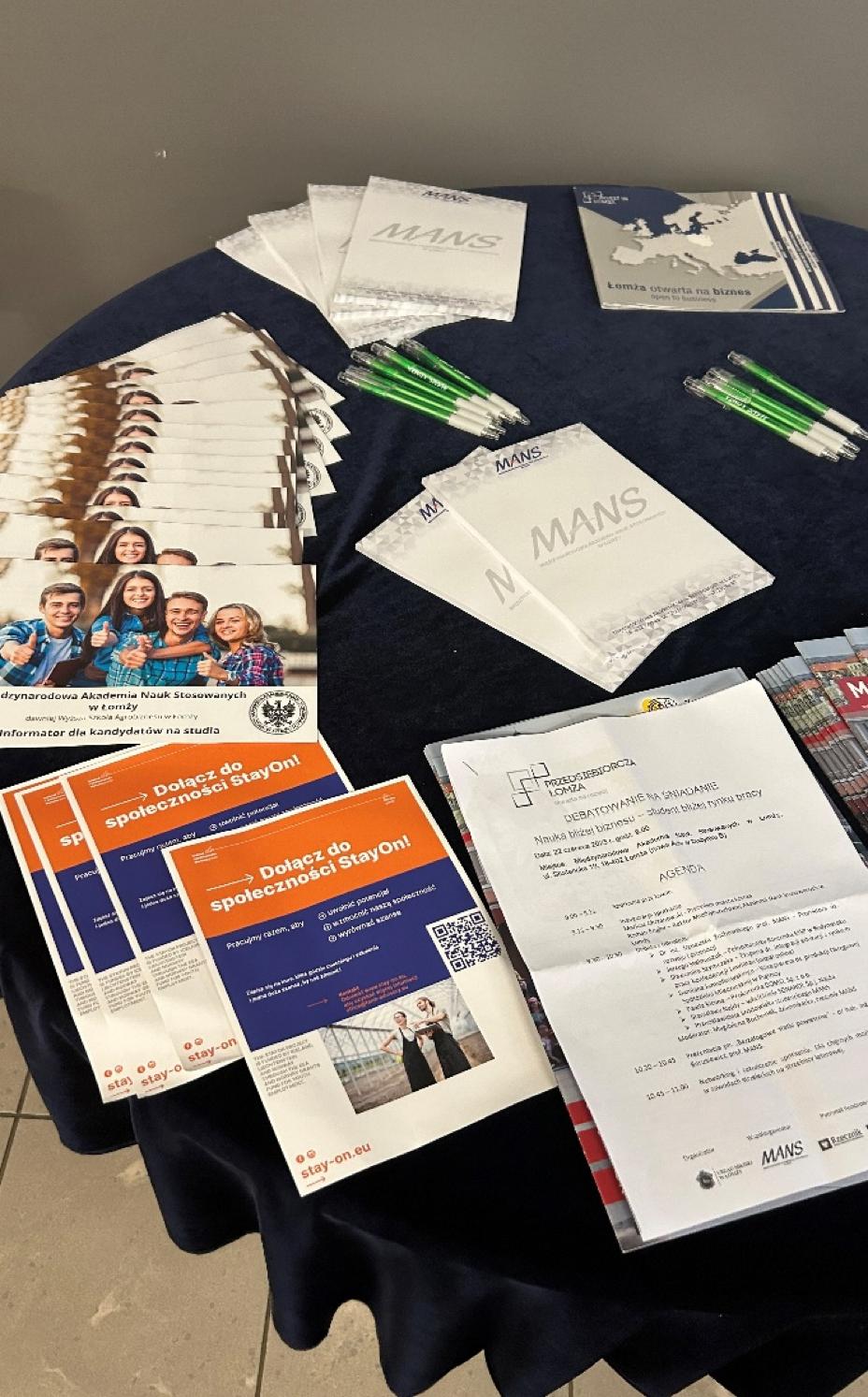
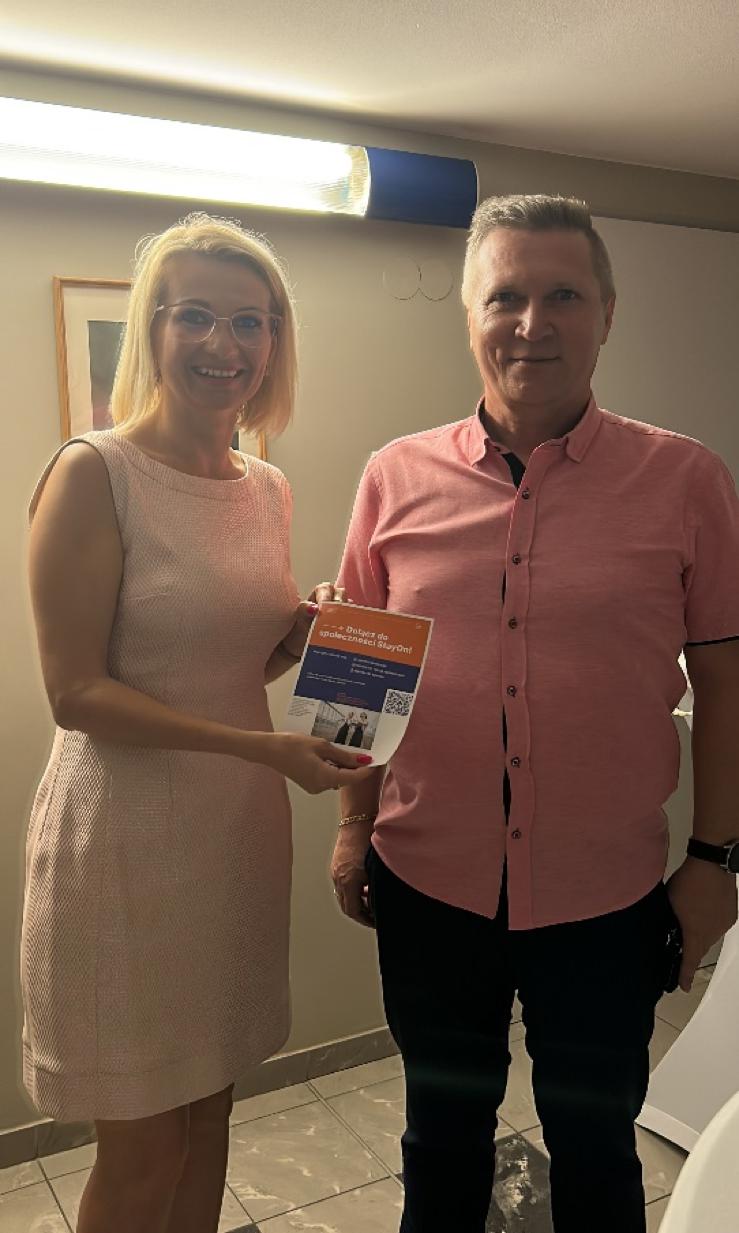
The meeting was attended by representatives of higher education from the Podlasie region, business sector, students and NEETs. Good practices in promoting a labour market open to young people were shared by, among others, the Representative of the Advocate for Small and Medium-Sized Enterprises in Białystok, an expert on the integration of education with the labour market, the pro-rector of the International Academy of Applied Sciences in Łomża and representatives of local stakeholders. During the debate, the activities of the StayOn project were mentioned. Natalia Truszkowska also met with local stakeholders, with whom she discussed the possibility of offering internships to NEETs undergoing training in the StayOn project.
Recorded meeting could be found here: https://www.youtube.com/watch?
v=ogxzPzY3kOk
96
Regional Funds Online Magazine
Polish Farm Advisory & Training Center StayOn Project
YENESIS 2.0 5-day Training Week
For this reason, the YENESIS partners worked on enriching the already developed material with 4 new thematic areas (climate adaptation, circular economy, sustainable water management, sustainable food systems) that were delivered to the project participants through physical training in their home countries. In addition to the 4 new thematic areas the trainings included a soft skills module delivered by the expertise partner. The new thematic areas will be added on the e-course website by mid-August for anyone to access.
During the past few months, the project partners of YENESIS organised and implemented a series of 5-day training workshops in each beneficiary country, on the thematic areas of Climate Adaptation, Circular Economy, Sustainable Food Systems, Water Management, and Soft Skills! 135 young people benefited from the free training week, bringing them one step closer to a green, sustainable job!
One of the main goals of YENESIS 2.0 is to reach more NEETs, impact stakeholders that are peripheral to the main target group, as well as expand the material and research of YENESIS 1, in order to meet the new needs of young professionals in islands.
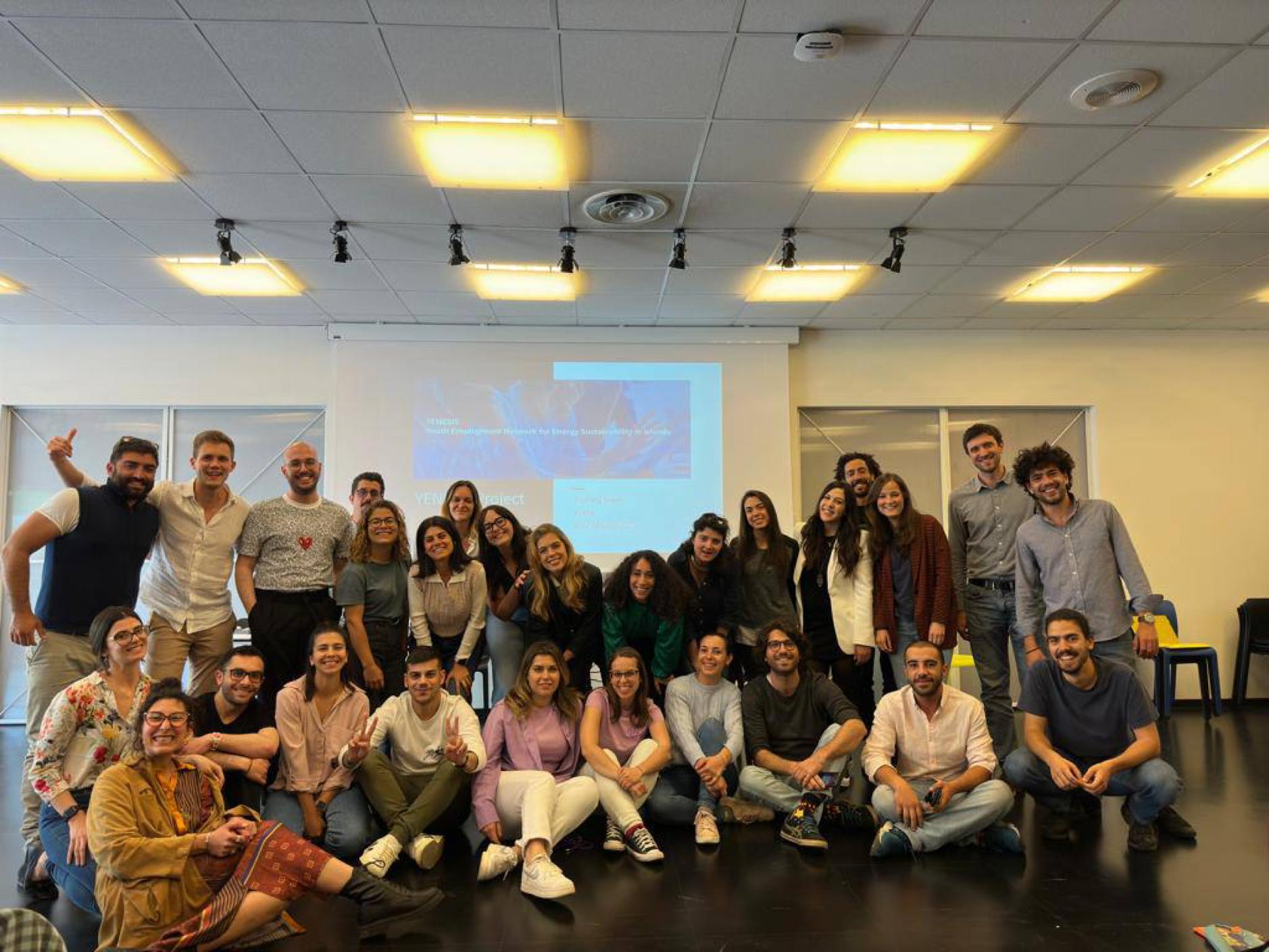

97
Regional Funds Online Magazine
YENESIS Project
Blue Generation Project Updates
Navigating the Blue Economy: The Path to a Thriving Career
During 10-19 May, Dr. Nicoleta Acomi, professor at Constanta Maritime University and mentor for the Blue Generation project, from the TEAM4Excellence Association, beneficiary partner of Blue Generation, participated in the 10th session of the IMO’s Sub-committee of Navigation and Search and Rescue (NSCR) which took place at IMO headquarters in London. She represented the International Association of Maritime Universities (IAMU), the global network of leading universities providing Maritime Education and Training to seafarers for the global shipping industry. Dr. Acomi, provided strategic recommendations for the future of education and training in the maritime sector. This meeting offered a valuable opportunity for industry and academic professionals to discuss the skills required for future maritime careers.

Moreover, on May 18th , Dr. Nicoleta Acomi had the honour of participating in a special dinner alongside IMO Secretary General Kitack Lim, in celebration of the International Day for Women in Maritime. During this significant event, Dr. Acomi, vice president of WISTA's Romania branch, engaged with representatives from WISTA International, a networking organization dedicated to attracting and supporting women in the maritime, trading, and logistics sectors. This special occasion highlighted the importance of promoting gender equality within the maritime industry.
As Blue Generation mentor, Dr. Acomi who provides professional guidance to young women and men pursuing careers in the blue economy, she drew upon the valuable insights and knowledge gained from this world class conference, and will continue to empower young individuals to pursue successful careers.
98
Regional Funds Online Magazine
Our Achievements so far
• 39.000+ girls and boys in 6 countries have been informed by BlueGeneration mentors until today about the training and job opportunities in the Blue Economy and we keep going!
• 12.000 youth engaged in active job search
• 1.900 enrolled in training and mobility schemes
BlueGeneration Project has reached thousands of youngsters in Bulgaria, Greece, Poland, Portugal, Romania, and Spain, remaining loyal to our promise to help them discover the unknown professions of the sea in Coastal Tourism, Aquaculture & Fisheries, Marine Biotechnology, Ocean Energy, Maritime Transport, and Ship building

“I found BlueGeneration through social media, got in touch with a mentor, and together we figured out how to transform my passion for the sea into a sustainable career as a skipper. Now I’m starting my first job with a very good salary at a yachting company after only 1,5 years in a VET school”, said Marina, sharing with us her success story.

99 Regional Funds Online Magazine
Our Achievements so far
• 39.000+ girls and boys in 6 countries have been informed by BlueGeneration mentors until today about the training and job opportunities in the Blue Economy and we keep going!
• 12.000 youth engaged in active job search
• 1.900 enrolled in training and mobility schemes
BlueGeneration Project has reached thousands of youngsters in Bulgaria, Greece, Poland, Portugal, Romania, and Spain, remaining loyal to our promise to help them discover the unknown professions of the sea in Coastal Tourism, Aquaculture & Fisheries, Marine Biotechnology, Ocean Energy, Maritime Transport, and Ship building
“I found BlueGeneration through social media, got in touch with a mentor, and together we figured out how to transform my passion for the sea into a sustainable career as a skipper. Now I’m starting my first job with a very good salary at a yachting company after only 1,5 years in a VET school”, said Marina, sharing with us her success story.
100 Regional Funds Online Magazine
Blue Generation Project
Cowork4YOUTH: The Open Event in Dublin
Cowork4YOUTH’s Open Event on May 11th at the Economic and Social Research Institute (ESRI) in Dublin, themed “Employment Opportunities for Young People”, turned to be a very successful event; not only in terms of outcomes regarding the discussions around important research findings on the main subject, but also regarding the publicity and consequently the public interest it attracted.
The event included presentations from academics who are involved in youth unemployment research, organizations that work with youths towards fulfilling their job aspirations and a panel that consisted of representatives of relevant government departments and state agencies. Also, in line with Cowork4YOUTH’s synergy policy, aiming to promote exchange of knowledge and good practices, the StayOn project, also funded by the EEA and Norway Grants Fund for Youth Employment participated in the event.
Mr Massimiliano Mascherini, Head of the Social Policies Unit of the European Foundation for the Improvement of Living and Working Conditions (Eurofound), a tripartite European Union Agency, talked about “NEETs in Europe and the Impact of the Pandemic”, where in his conclusions he underlined the fact that the future depends upon its young population and that the effects of the pandemic were indeed more severe on young people but they were rather effectively “reversed”, in contrast to the 2008-2013 economic crisis. He also concluded that the consequences of the NEETs phenomenon are dramatic not only for the individuals themselves, but also for the society as a whole; and last but not least, that the EU member states are indeed in the correct position to lower the NEET rates, but they need to customise their policies according to the needs of each sub-group (eg women and living in rural areas).
Dr Adele Whelan, Senior Research Officer at the ESRI, at her presentation “Determinants of Youth Employment'' talked about youth employment
rates facing a drop due to COVID-19 but recovering now, that youth employment has been growing slower in regions where it was initially lowest (slow divergence) and that young people involved in “brown” (high carbon-emmitting) sectors experience lower employment rates than the ones in “green” and “coworking” sectors. The key research questions for that study were about providing a descriptive assessment of trends in youth employment across regions of Greece, Ireland, Italy and Spain, measuring the degree of convergence/ divergence in the evolution of youth employment in NUTS2 regions and identifying some of the underlying drivers of youth employment.
Relevant subjects also presented at the Open Event were “Youth Work Ireland Tipperary: Youth Employment Initiative” by Moira Merrigan (Youth Work Ireland Tipperary), “SICAP Social Inclusion Programme: A Youth Perspective” by Martin Quingley (Pobal) and “Young Adults and Labour Market Scarring: Consequences and the Policy Response” by Barra Roantre (ESRI).
The panel discussion “Employment Opportunities for Young People: Challenges and Opportunities ahead” was followed by fruitful discussion and it also marked the conclusion of the Open Event.
Stay connected with us through our social media: facebook, Twitter, LinkedIn: @Cowork4YOUTH, and visit our website https://www.cowork4youth.org/
Cowork4YOUTH
Project
101
Regional Funds Online Magazine
The end of the second edition of the CREA RAISE Youth programme: conclusions and outcomes
vicinities by creating business ideas with a social approach; the second stage, that gave those NEETs that showed interest in the RAISE Youth activities and approach a more in-depth training in the form of an Massive Open Online Course (MOOC) available in CAPACYT, FUNDECYT’s online training platform; and the third and last phase that came in the form of individual one-to-one mentorships with the participants.
The second edition of the CREA RAISE Youth programme has been one of the main activities of the RAISE Youth project in Extremadura for the year of 2023. This activity, that started on January 2023 and was officially launched to the public on March 2023 and, by making dissemination activities, such as attending to different events that the team of FUNDECYT-PCTEX knew will be attended by young NEETs and youthrelated organizations and by using the network of stakeholders related to the RAISE Youth project, the team of the RAISE Youth project in Extremadura was able to engage young NEETs in the activities related to the CREA RAISE Youth programme.

This second edition has been comprised of three different stages: the first phase, related to the engagement of young NEETs from rural areas in Extremadura in the RAISE Youth project and activities and the creation of a entrepreneurial mindset by the celebration of different Social Service Jams that aimed to tackle the problems identified by young people in their
This activity, done together with Social&Tech, a women-lead consultancy agency specialized in the designing and implementation of training programmes, has had a meaningful impact on the social fabric of Extremadura. With this activity, the RAISE Youth project has reached NEETs in rural areas of the provinces of Cáceres and Badajoz, but it has also sparked the interest of public administrations and stakeholders. In this regard and thanks to the CREA RAISE Youth programme, the townhall of Pinofranqueado, a rural municipality of the province of Cáceres, organized an event with technicians and public servants that were interested in the RAISE Youth methodology that marked another milestone in the transfer of knowledge gathered by the whole consortium regarding social innovation and youth engagement.
As an overview of how youth, communities and social challenges were made the core of the CREA RAISE Youth workshops, one of the business initiatives that were created by the attendees and that tackled specific challenges in the workshop held in Navalmoral de la Mata, with a big Muslim community, one of the attendees wanted to create an on-line Muslim clothes shop to make the community less dependent on periodic travel to Muslim countries to fetch clothes and other supplies that are not available in Spain.
102
Regional Funds Online Magazine
This business initiative perfectly encapsulates the philosophy and methodology followed by the CREA RAISE Youth programme and show how positive business with a social and inclusive approach can be to their respective communities and from FUNDECYT-PCTEX we hope that more public agents and civil society will develop an interest in developing this kind of business to benefit communities all across Extremadura.
103 Regional Funds Online Magazine
RAISE Youth Project
"The persistent and stubborn young people of Pernik region can develop tourism TOGETHER"
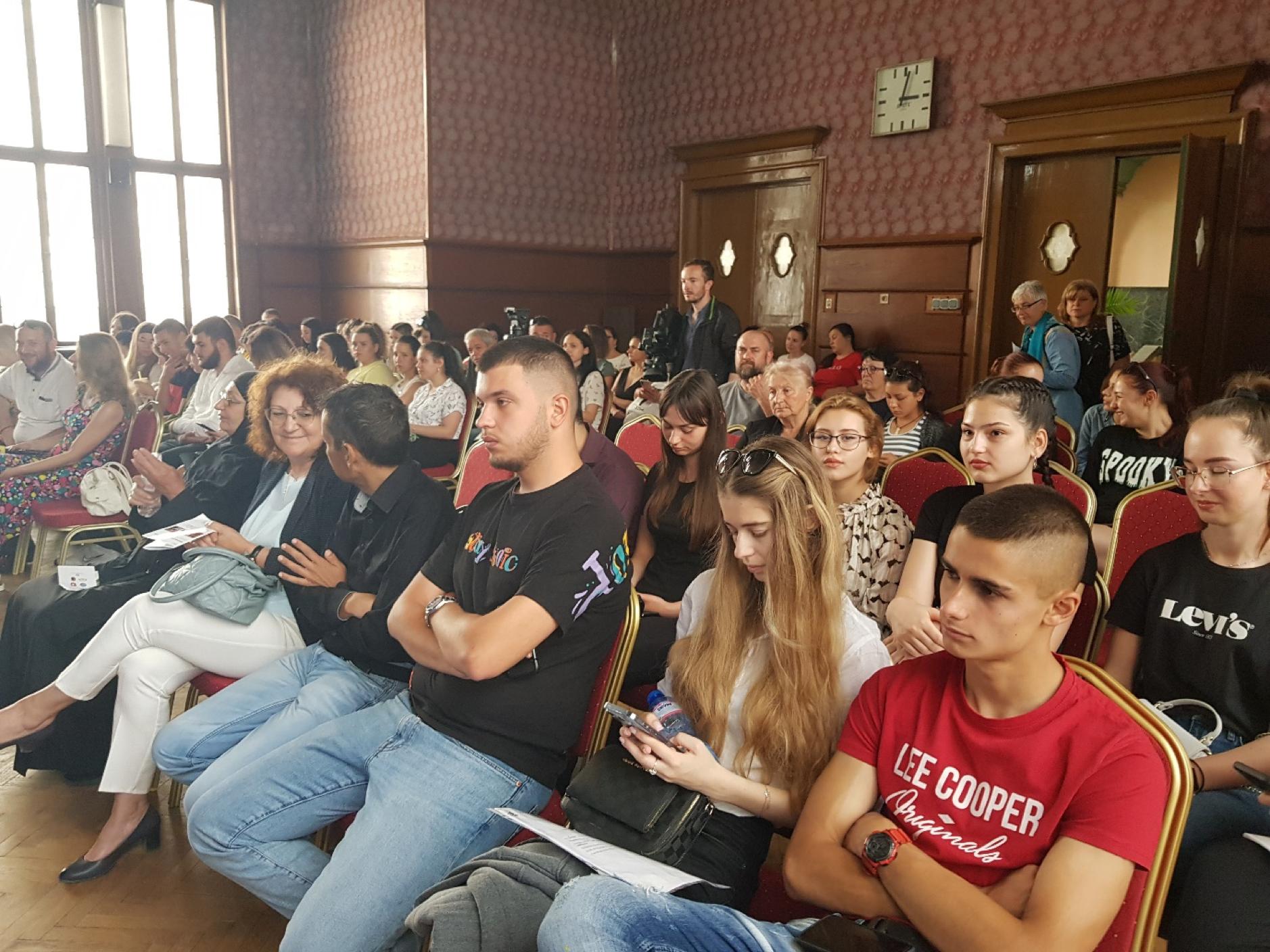
The construction of a crowdsourcing platform to support the young people of the area and a new type of Aeroponics greenhouse is in the process and a chatbot is currently being developed to navigate tourists in Pernik. The developers and creators of Chatbot - Elitsa Stoilova, co-founder and manager of Umni.BG and Alex Milchov, co-founder of GraoSoft company and participant in RAISE Youth project trainings, presented their product during the round table to over 70 people from the region. The travel chatbot with artificial intelligence will turn the image of the destination to what is currently invisible.
The avatar name Is Struma. It will walk users through all stages of their journey - where to park, business services, weather, entertainment, accommodation, travel information, currency calculator, air quality. A chatbot conversational module is also being developed. Of course, the authors rely on subsequent sponsorship from medium and large enterprises in the region, as well as advertising.
At a round table on July 6, she presented the results of the project so far, including the creation of a Regional RAISE Youth Center in the city of Breznik, where hundreds of young people in the last 3 years had trainings in gardening, herbalism, entrepreneurship, beekeeping, creation of agricultural cooperative, digital marketing, tourism; 3 tourist routes were created and 8 farmers' markets were held including The First Western Farmers' Market.
This is far from all - a mobile tourist website was also created for the purposes of tourism in the region - www.travelsofiawest.eu , as well as a gamified tourist route near the village of Zelenigrad, the region of Trun city.
There is also the creation of treasure hunt games through QR codes, the development of bike tours and audio talks for various tourist sites.
Interest in the products and successes of the RAISE Youth project is also shown by the local government. Local municipality representatives participated in the event, in the presence of Stefan Krastev, deputy Mayor of Pernik municipality. He shared his joy that little by little the city is starting to be associated with a different type of tourism. According to him, the vision for Pernik as the European festival capital is leading.
104
Regional Funds Online Magazine
Stanimira Hadjimitova, director of the Center for Sustainable Communities Development - the organization implementing the RAISE Youth project in Bulgaria - is categorical.
"Our history embodies the industrial power of Bulgaria. An important prerequisite for the cultural development of the city is one of the largest ethno-festivals in Europe, namely the International Festival of Masquerade Games SURVA”.
Konstantin Zankov, creator of Travel Mind - a platform for marketing and training in the field of tourism and author of the gamified tourist route "Zelenigrad", Desislava Alexova - tourism expert and Vihra Ognyanovabrand manager and designer, who together developed a strategy and plan for the development of tourism in the municipality of Radomir, spoke about the image of the region for different tourists. For the city of Radomir the idea is that the city's hidden treasures will attract tourists from all over the country and abroad.
The highlight of the event was the participation of the youth from SURICHE school "Dr. Petar Beron", town of Pernik. Nikol, Ekaterina and Victoria from the class "Organizer of tourist agency activity" have their own project for the development of tourism in the Pernik region. They will focus on several tourist sites - the town planning of the town of Pernik, the village of Busintsi with the Busin pottery, the yogurt in Studen Izvor and the well temple near the village of Garlo.
"We don't want to be associated with winkel and golf, but with our sights and to be proud of them!" We will try to make something that we can leave in our birthplace and that will be used by the local authorities," the girls add.
The topic of the participation of people who make decisions at the district level was repeatedly discussed during the round table. It was repeatedly emphasized that the youth of the region have incredible ideas for development, but they need the support of all important strategic stakeholders to be able to turn their hometowns into an attraction for visitors from near and far. Or as RAISE Youth project manager Ms. Stanimia Hadjimitova advised them:
"Boys and girls - the future is in you! Be more active, be interested and insist, ask who will do what for the development of tourism in our city, our municipality, our region! This can lead to a livelihood, to the development of your business, so that you don’t need to run to Sofia or abroad, but have a decent income and a decent life here!"
RAISE Youth Project
105 Regional Funds Online Magazine
Personal development workshops for young beneficiaries of LEAD project
frustration tolerance, to develop their communication skills, creativity, spontaneity, attention and memory, and to help them break emotional blockages. Moreover, the young adults learned to understand and to respect the group’s rules, to collaborate with the other participants, and to work according to the facilitator's requirements.
Olivia used role-playing, drawing, modeling and therapeutic stories, in order to stimulate the young adults to introduce themselves, to communicate with the other participants, to observe and be aware of the positive and negative aspects of themselves and their colleagues, and to involve in the teamwork. Also, the young adults were encouraged by Olivia, to talk about their achievements and their expectations regarding professional future and integration into society.
Cristina Serbanescu LEAD Project
Between January and June, Health Action Overseas Foundation (HAO) organised six personal development workshops at the headquarters of the Services Center for Supported Employment from Constanța. These workshops were named "This is how I am...How do you see me?", and they were addressed to young adults from vulnerable groups, for example: young adults with disabilities, young adults no longer in the education system and who are not working or being trained for work, young Roma people.
These workshops were facilitated by our colleague, Olivia Grigore. She worked alongside the young participants in order to stimulate their selfperception and self-awareness, to increase their self-control and
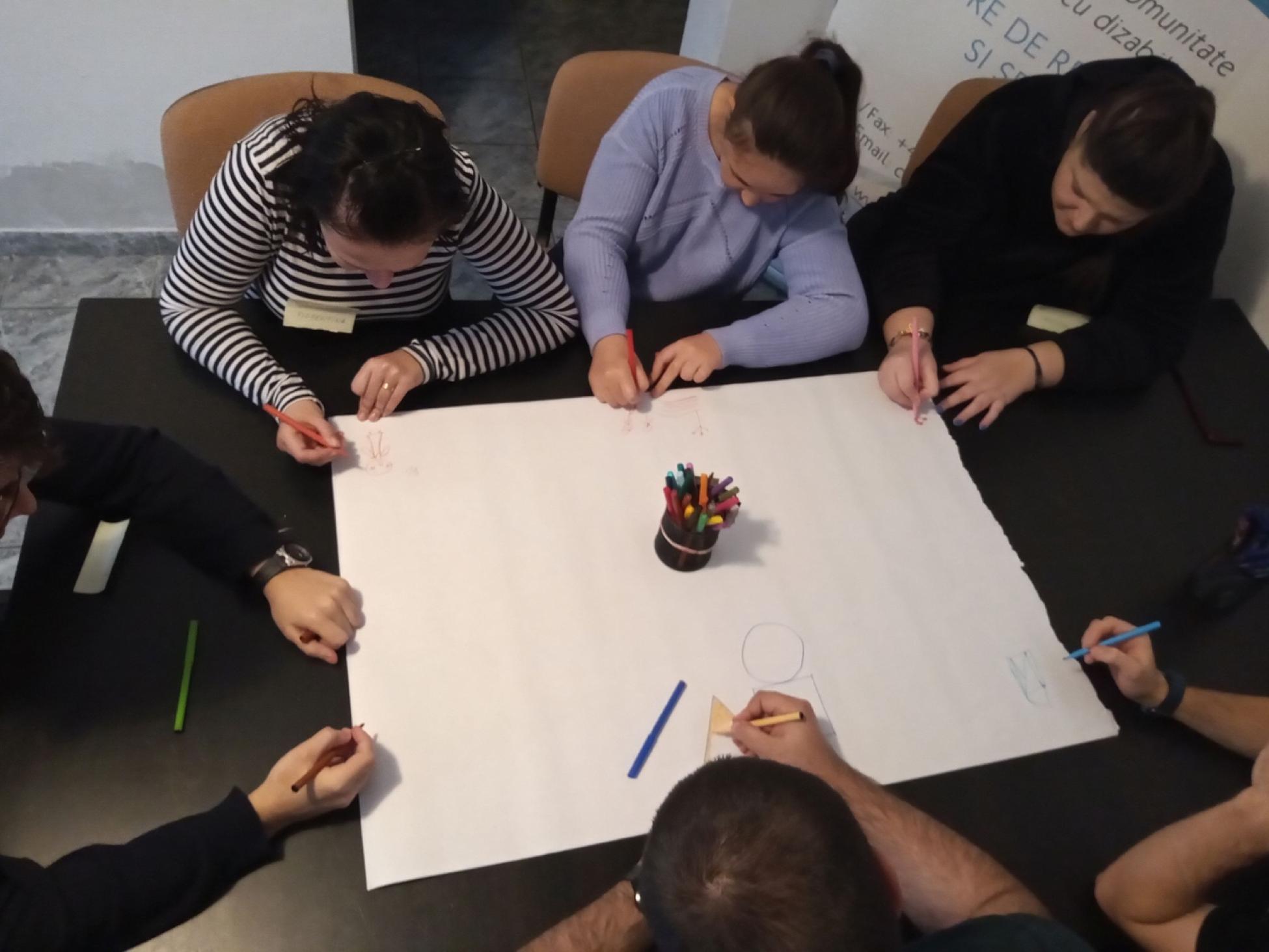
106
Regional Funds Online Magazine
Youth Employment Summit - good practices in Youth Employment, videos and pictures from the event
• Spain continues to be the OECD country with the most unemployed young people.
• The event, organized by Autoocupació and the Fund for Youth Employment of EEA & Norway Grants, was a success of participation.
Barcelona, 5 July 2023. On June 29, Autoocupació organized the Youth Employment Summit at the Caixa Fòrum Macaya, in collaboration with the Fund for Youth Employment of EEA & Norway Grants, a day in which the new strategies of youth employment policies were presented, as well as some of the best practices of innovation and cooperation in this field. It was attended by more than 150 people representing public and private entities in the field of employment from 10 European countries. The day was opened by Albert Colomer, President of Autoocupació, and Nora Mehsen, representing the Fund for Youth Employment of EEA & Norway Grants.
Nora Mehsen, referring to EEA & Norway Grants, affirmed: “We work for a more equal Europe, in close partnership with national and international actors. We contribute with 60.6 million euros to support sustainable and quality youth employment”. Watch her whole speech here
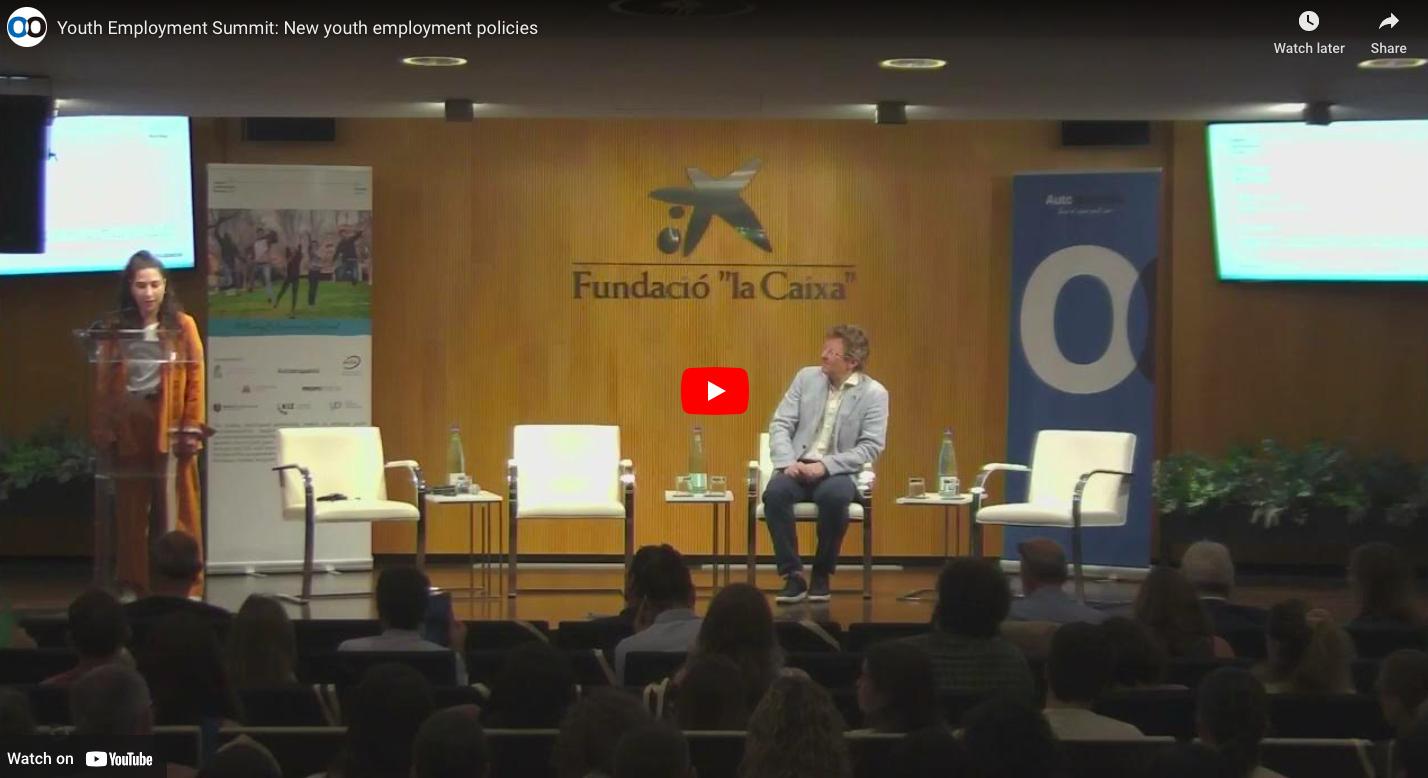
The first session focused on new youth employment policies. Veerle Miranda, representing the OECD, again noted that "Spain continues to be the OECD country with the most unemployed young people". Miquel Carrión, representative of the Servei d'Ocupació de Catalunya, added that "a young person trained has three times as many chances of finding a job as one who is not”.
Afterwards, Yiorgos Alexopoulos, Senior Researcher at Agricultural University of Athens, explained the Young Entrepreneurs Succeed project here.
Good practices in youth employment
This was followed by four round tables to share best practices on youth employment in Catalonia.
The first round table presented the voluntary mentoring program for young self-employment entrepreneurs within the framework of the Young Entrepreneurs Succeed project.
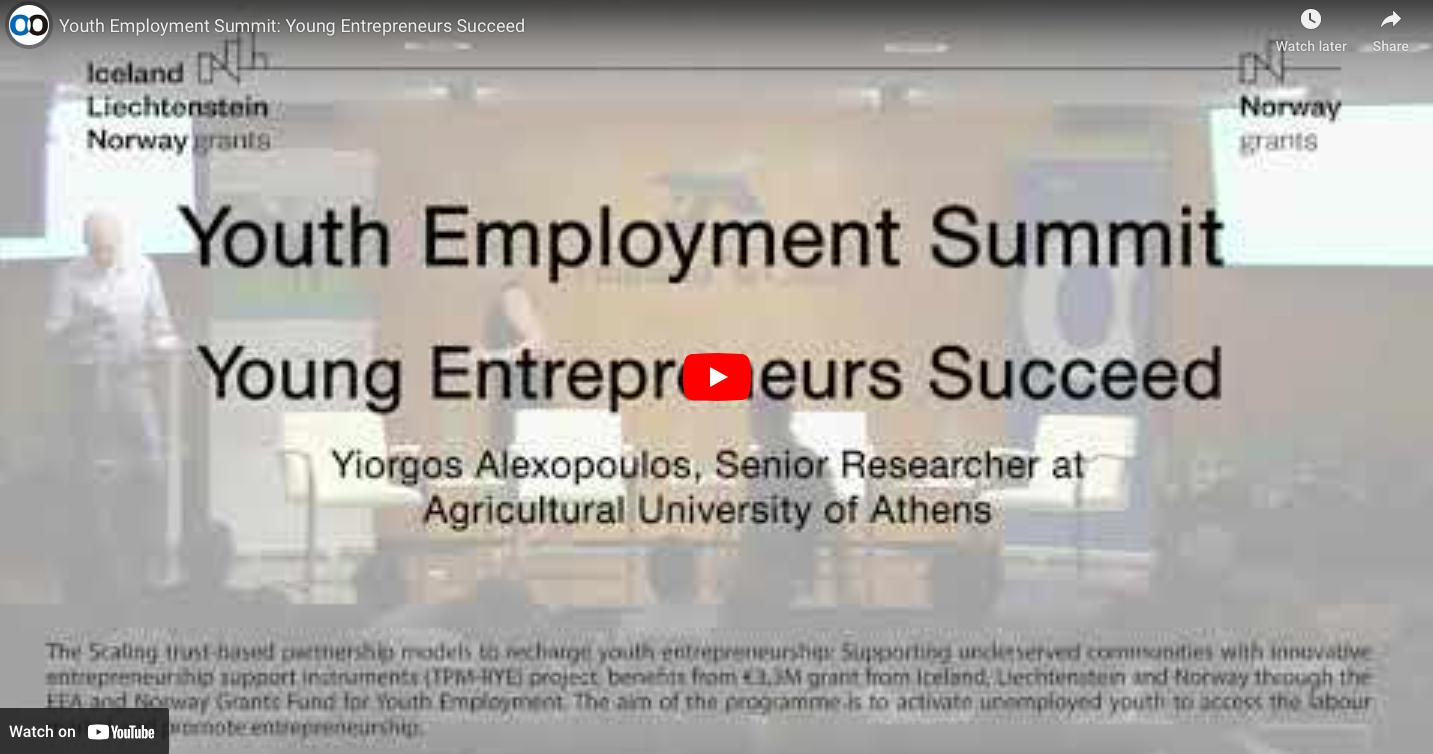
107
Regional Funds Online Magazine
Jo Gray, representative of Youth Business International, said that "it is often surprising that mentors do this work voluntarily, but there is no other way to do it than with initiative and drive." Guillem Arís, Director of Autoocupació, shared the impact of the mentoring program: "The 5-year survival rate of the mentored companies is 87%, more than double the average in Spain." Watch the whole interview here.
The Youth Employment Summit was closed by Oriol Amorós, Secretary General of the Departament de Drets Socials of the Generalitat de Catalunya; and by Gian Luca Bombarda, Director of the Fund for Youth Empolyment of EEA & Norway Grants, who affirmed that “the drop-off in school planning is the main element that we have to reduce to reduce the unemployment” here.
Daniel Venteo, as a volunteer mentor, and Rubén Fernández, founder of Jabonalia, shared their experience in the program.
Then three more conferences were held to share the best practices in educational return, with the participation of the Asociación Española de Escuelas de Segunda Oportunidad and El Llindar Fundació, in dual training, with the participation of the Servei d'Ocupació de Catalunya, Fundación Exit and Superwagen and in labor insertion, with the participation of the Incorpora network of the Fundació La Caixa and Fundació Intermedia. All the round tables had the participation of beneficiaries of the initiatives to give visibility to their impact.
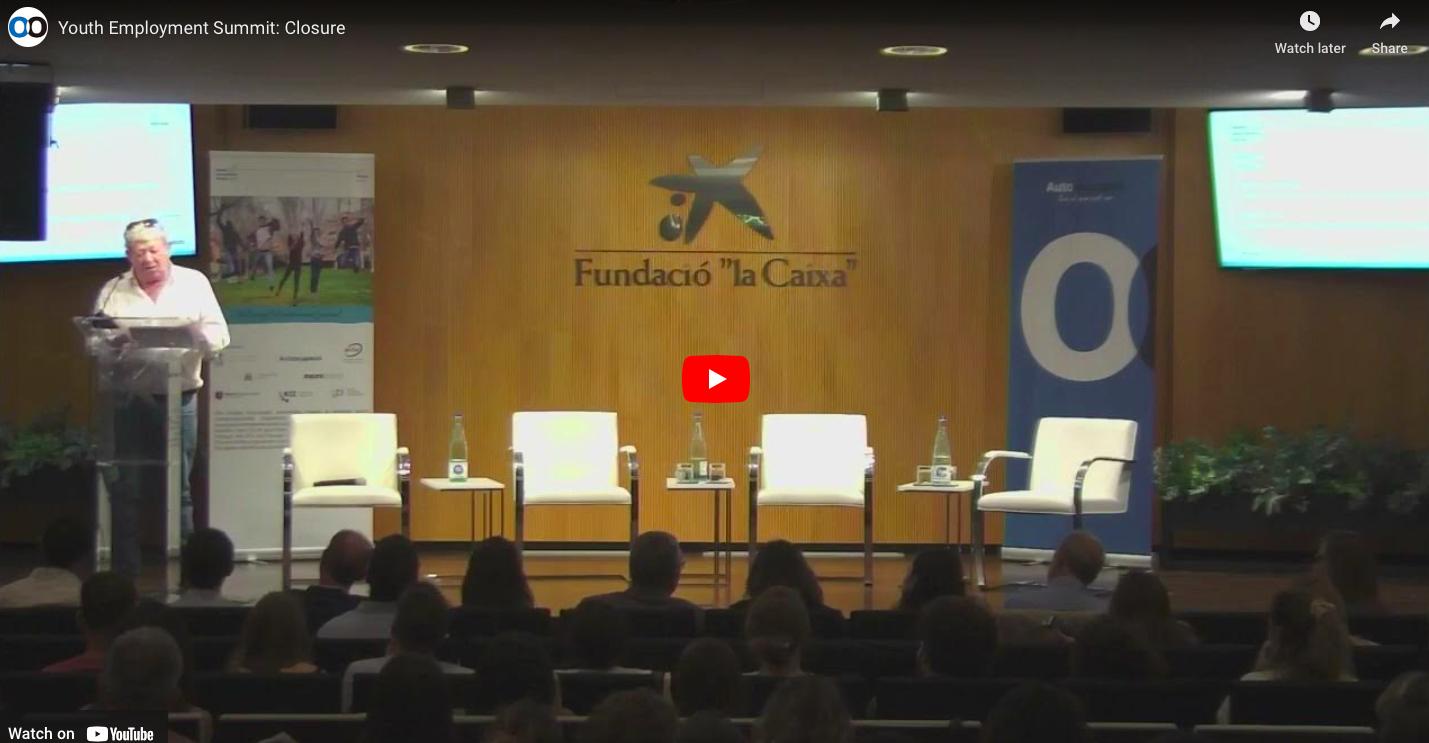

What is the future of work?
Albert Cañigueral, explorer, consultant and disseminator, announced the changes that will mark the future of work and how technology will affect labor relations. "85% of jobs of the future are still not invented," he said.
108 Regional Funds Online Magazine
Check here the photos of the Youth Employment Summit.
YES! Project
Register to the Forum and join the Don't be a stranger campaign!

We invite you to introduce yourself and your organisation in the appropriate category (Lead partner/Beneficiary partner/Expertise partner/Other).
Don't hold back – engage, ignite discussions, post updates, and share your valuable insights on youth employment and beyond. Embrace the opportunity and be a catalyst for transformation. Don't be a stranger – be the voice that resonates!
Youth Employment Forum
109 Regional Funds Online Magazine
Contributors & Credits
CONTRIBUTORS
From the Fund Operators
Mateusz Wiśniewski
Francesca Bombarda
Sara Barbi
External Contributors
Thomas Mc Grath
Muratcan IŞILDAK
Lublin European Youth Capital Team
From the Projects
Yagos Antiochos CRESAÇOR
Meath Partnership
Effie Emmanouil
Rosa Messuti
Aimilia Markaki
Foteini Sokratous
Jose Fernandez
Fundacion Privada Pere Closa´s Team!
Cristina Serbanescu
Nicolae Dobrescu
Martina Kubíková
Vasileios Bouronikos
Alexander Politov
Lilia Yakova
Zuzana Polačková
Branka Mozetič Vodopivec
Janez Prešern
Maritsa Kissamitaki
Lotte Frost
HRDA Team
Polish Farm Advisory & Training Center
DIRECTOR
Gian Luca Bombarda
Kristina Barać Petrović
Alina Adomnicăi
Monika Peter Tzvetkova
Kyriaki Kyprianou
Christos Papadopoulos
Laura Pacareu Flotats
Saroukou Anna
Eszter Szonyi
Amber Darmanin
Anastasia Vlachou
Savvas Pavlidis
Inga Retike
Ierotheos Zacharias
Bálint Farkas
Špela Kodre
Aleksandra Kasztelewicz
Vaidotas Norkus
Tanja Dimitrijević
Kata Pátka-Szitter
Silvia Bernardo
Aleksandra Ziębka
Maritsa Kissamitaki
110
Regional Funds Online Magazine
FUND


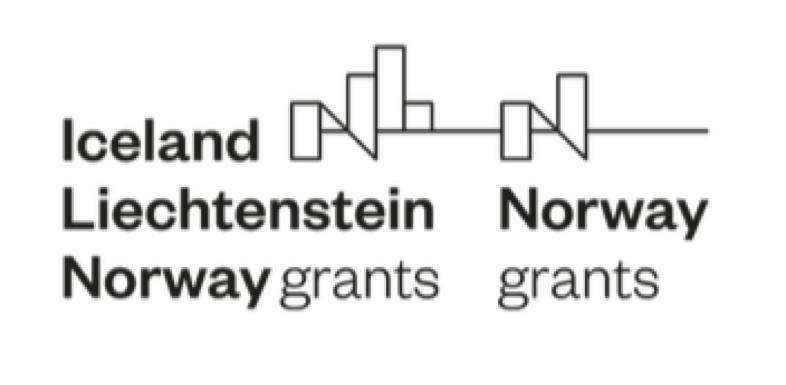
111
the main achievements of implemented activities. Follow us:
Born with the intention of sharing the results and updates of the projects participating to the Funds to showcase
www.youthemploymentmag.net www.regionalcoopmag.net
OPERATED
Contact us: themag@regionalfundsmag.net
fficial number: 3380/2019
contents of the Magazine are the sole responsibility of the authors and can in no way be taken to reflect the views of the Donors. Cover image: free image Regional Funds Online Magazine
BY:
O
The






































 Cristina Serbanescu
Cristina Serbanescu


















































